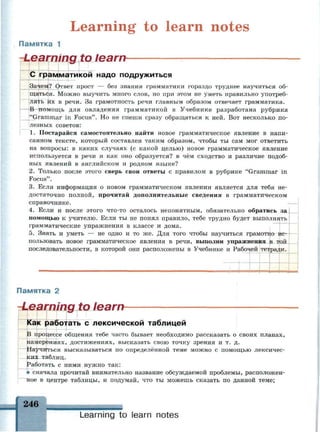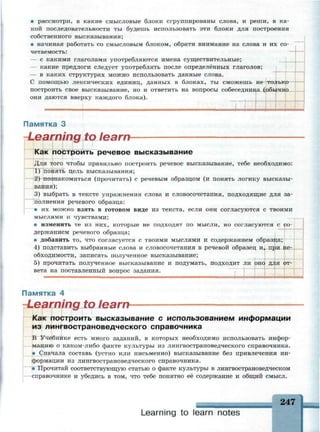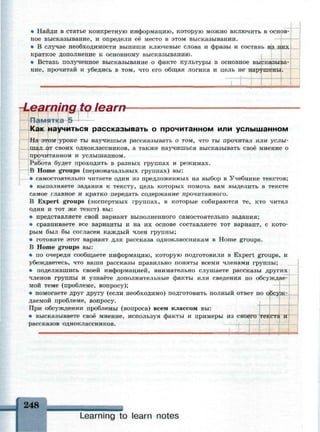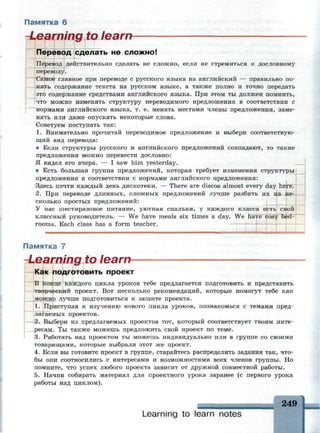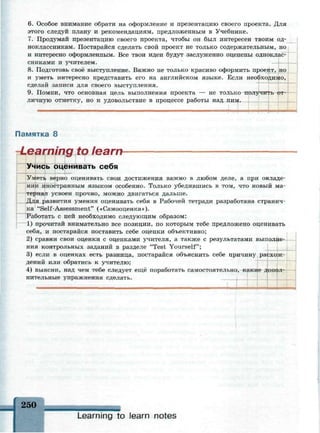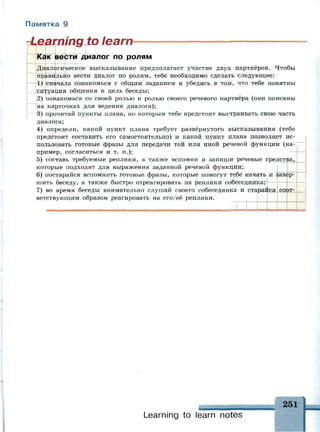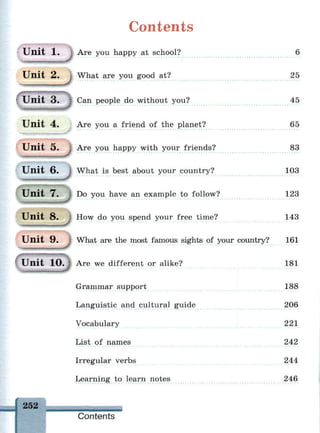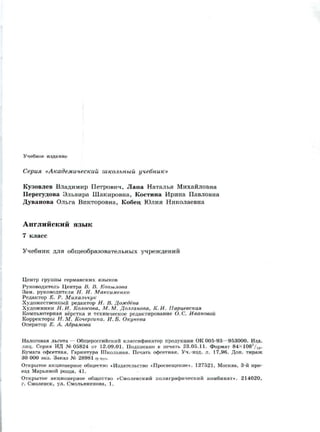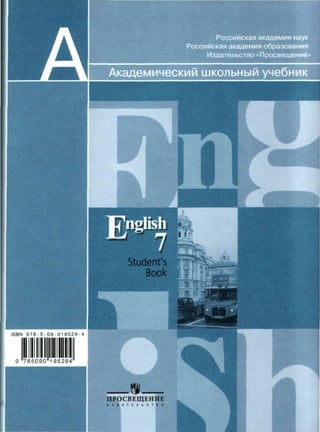Good morning! What can I help you with?
John: Hi, I'm John. I'm new here and I don't know my timetable yet. Can you tell me what subjects I have today?
Assistant: Sure, what year are you in?
John: I'm in Year 7.
Assistant: Okay, let me pull up your timetable. What's your name?
John: John Smith
Assistant: Alright, here is your timetable for today, John:
8:45 - 9:00 Registration
9:00 - 10:00 Maths
10:00 - 11:00 Science
11:20 - 12:20 PE
13:10 - 14:15 History
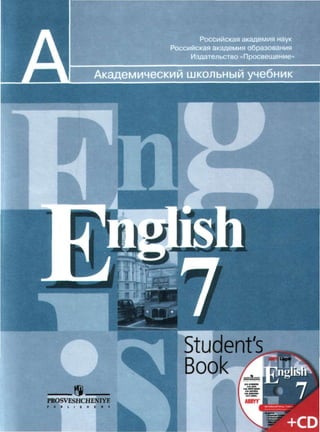
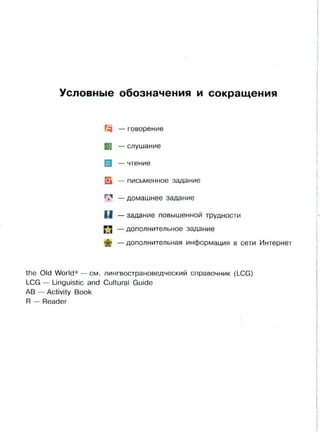
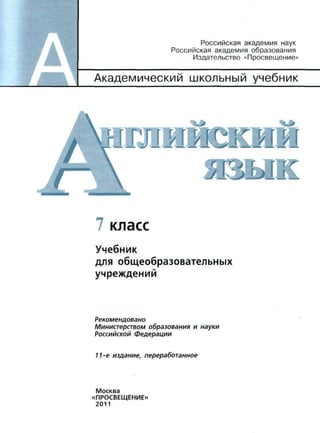
![УДК 373.167.1:811.111
ББК 81.2Англ-922
А64
Серия «Академический школьный учебник» основана в 2005 году.
На учебник получены положительные заключения
Российской академии наук (№ 10106-5215/15 от 31.10.2007 г.)
и Российской академии образования (№ 01-487/5/7д от 24.10.2007 г.).
Проект «Российская академия наук, Российская академия образования,
издательство «Просвещение» — российской школе»
Р у к о в о д и т е л и п р о е к т а :
вице-президент РАН акад. В.В.Козлов, президент РАО акад.
Н.Д. Никандров, управляющий директор издательства «Просвещение»
чл.-корр. РАО А.М.Кондаков
Н а у ч н ы е р е д а к т о р ы с е р и и :
акад. РАО, д-р пед. наук А.А. Кузнецов, акад. РАО,
д-р пед. наук М.В.Рыжаков, д-р экон. наук С.В.Сидоренко
Научный консультант авторского коллектива акад. РАО, д-р пси-
хол. наук И. А. Зимняя
Авторы:
В. П. Кузовлев, Н. М. Лапа, Э. Ш. Перегудова, И. П. Костина,
О. В. Дуванова, Ю. Н. Кобец
Научный руководитель авторского коллектива проф. Е. И. Пассов
Английский язык. 7 класс : учеб. для общеобразоват. учреждений /
А64 [В. П. Кузовлев, Н. М. Лапа, Э. Ш. Перегудова и др.] ; Рос. акад. на
ук, Рос. акад. образования, изд-во «Просвещение». — 11-е изд., пере-
раб. — М. : Просвещение, 2011. — 252 с. : ил. — (Академический
школьный учебник). — ISBN 978-5-09-019529-4.
ISBN 978-5-09-019529-4
УДК 373.167.1:811.111
ББК 81.2Англ-922
Издательство «Просвещение», 2010
Художественное оформление.
Издательство «Просвещение», 2010
Все права защищены](https://image.slidesharecdn.com/14858-160704171440/85/14858-7-2011-252-audio-4-320.jpg)
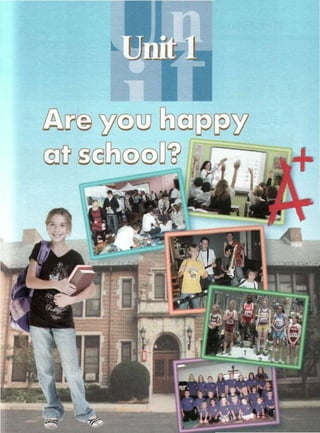
![йШ
Lesson
low did you spend
1« И Щ Mandy, John and Robert are talking about their summer holidays.
Where did the children spend their holidays? (listening for specific information)
A. Mandy wrote to her friend about her summer holidays.
1) What were her impressions?
Dear Helen,
l had a great time on holiday, in July my family and I were near Snowdon.* we were
walking up the mountain from morning till lunch, it was not easy, but it was exciting!
last week we went sightseeing to York.* we went to an old castle. They say there are
ghosts in the castle but we didn't see any. My friend had been there
before, and she hadn't seen them either, in August the weather was
fine. I went sunbathing and swam a lot! I took many fantastic photos.
I'll send you some.
I am looking forward to1
seeing you again,2
Mandy
2) In the letter, find the verbs in the past tense forms and name them.
I Qf'QfY)rf)Qf for revision
Describing past actions
/ • • • •
On Sunday we went to an old castle.
We were swimming for 2 hours.
My friend had visited this museum before.
Past Simple
Past Progressive
Past Perfect
GS (Grammar Support) p. 197—198
1
to look forward to + N/Ving — с нетерпением ожидать чего-л.
2
again [э'деп] — снова, опять
б](https://image.slidesharecdn.com/14858-160704171440/85/14858-7-2011-252-audio-6-320.jpg)
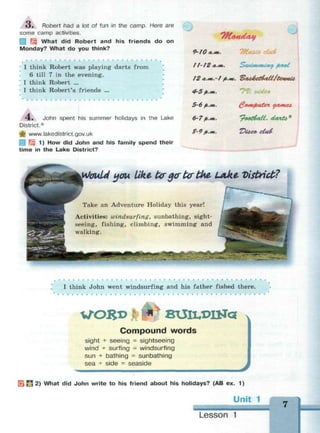
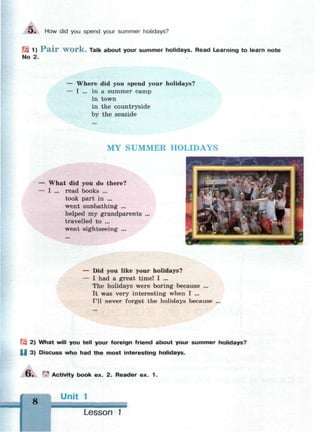
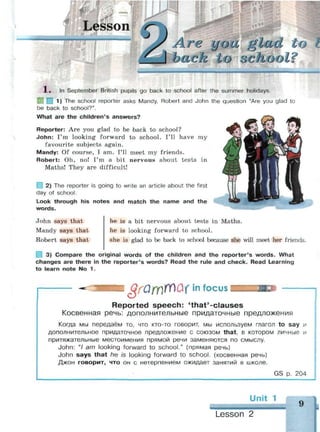
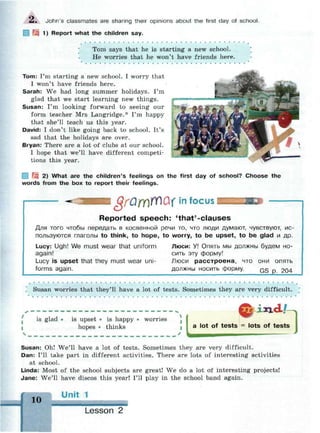
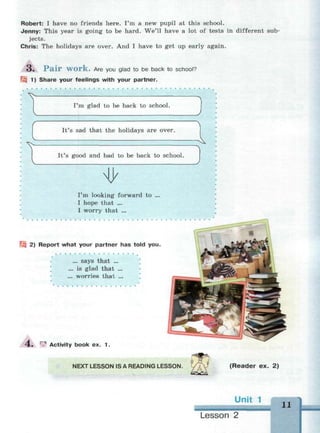
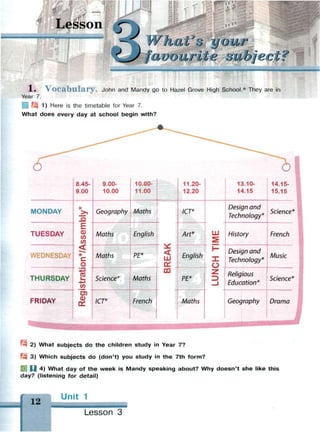
![2 . И V o c a b u l a r y . John is speaking about his timetable and subjects.
Ш 1) What does John like? What doesn't he like? Why? Use the word box to learn
the meaning of the highlighted words.
Our school day starts with registration. Every morning we also
have assembly. I'm not sure that we should have assembly every day.
I think that assembly is a waste of time and I can do without it.
My favourite subjects are Biology, Chemistry and Physics. At
these lessons we discover new things. It's very interesting. I like
Maths, too. Our teacher Mr Kernel is very kind and he helps us
when we have problems. I always look forward to his lessons. But I
don't like French. I hate learning words and poems by heart.
г ^—. ' —1
~ i ..•••••ИМ
l i z •_ :.™:r::"':::"'-:.::™::::^
К **. A fa * M
— 1 -'-''
a waste of time — бесполезная трата
времени
to do without — обходиться без чего-л.
to discover — узнавать, открывать
by heart [ha:t] — наизусть
Words to
guess
Biology [bai'olacfei] — ?
Chemistry ['kemistn] — ?
Physics ['fiziks] — ?
J
2) What will you tell John about your timetable and subjects? Use John's story
for help.
] Щ 3) Report what Mandy and Robert say about their timetable. Compare your
timetable with the timetable at Hazel Grove High School, (listening for detail)
Mandy: We have registration at 8.45 a.m. every day.
You: Mandy says that they have registration at 8.45 a.m. every day. But we
don't have registration at my school.
Un
Lesson 3
13](https://image.slidesharecdn.com/14858-160704171440/85/14858-7-2011-252-audio-13-320.jpg)
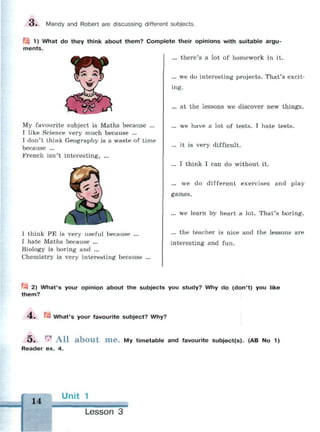
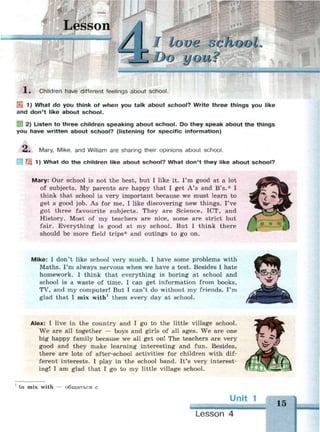
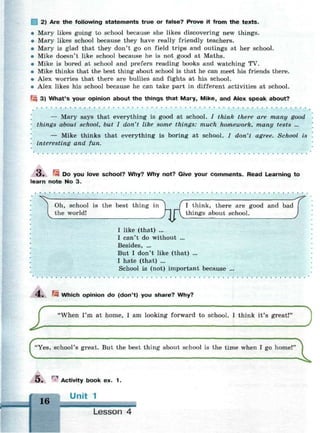
![Lesson
" Г "
У 1 / У Уt do во iIs V
in ean?
l. On exchange programmes, children from different countries often talk about school.
6.J3.
| What are the children talking about? What countries are they from? What do
you think? (listening for the main idea)
Л. Phil and Mary are talking about school life.
1) Use the word box and find in the dialogues how they:
• say they don't understand something;
• ask about meaning.
— What are your marks at school?
— I get fours and fives.
— Fours and fives? What do they mean? Are you a good pupil?
— Yes, I am. 4 means good and 5 means excellent.1
— Oh, well done! But in my culture they mean В and A.
• • •
— What form are you in?
— I'm in the third form.
— Really? How old are you?
— Thirteen.
— I'm thirteen, too. But I'm in the seventh form. Sorry, I don't
quite understand.
— Well, at most English schools forms start only at the second
ary school, at the age of eleven.
V-
* &
SKI ea 2) What are some other ways of saying you don't understand
and asking about meaning?
SAYING YOU D O N ' T U N D E R S T A N D
I'm sorry, but I have a question. Извини(те), у меня вопрос.
Sorry, I don't quite understand. Извини(те), мне не совсем понятно.
I didn't (quite) get you. Я не (совсем) понял вас.
A S K I N G A B O U T M E A N I N G
What do you mean? Что вы имеете в виду?
What do you mean by A's? Что вы имеете в виду, говоря "A's"?
Can you explain what you mean by assembly, please? Объясните, пожа
луйста, что вы имеете в виду, говоря "assembly".
1
excellent ['eksabnt] — отлично
Unit
Lesson 5](https://image.slidesharecdn.com/14858-160704171440/85/14858-7-2011-252-audio-17-320.jpg)
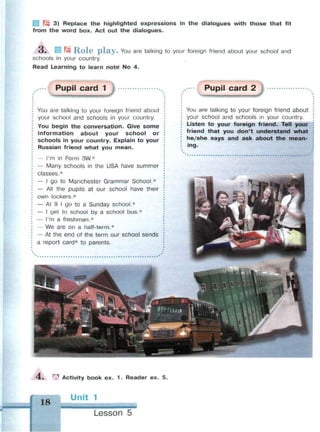
![Lesson What is a
progressive school
Most schools in Britain are traditional, but there are1. Ш Jigsaw
progressive schools, too.
Read Learning to learn note No 5.
1) I n h o m e g r o u p s . Read one of the texts (A, B, or C) and do the task.
A | | SS Summerhill is a famous progressive school.
Read the text and write out the facts that show how different Summerhill is from
traditional schools.
......,......
Summerhill is a boarding school1
in Suffolk, England. A. S. Neill* opened this
school in 1921. There are only eighty pupils, aged from five to eighteen. The
children have classes usually according to2
their age, sometimes according to their
interests. Every week the pupils and the teachers have a meeting3
where they
make and change their rules. There is a timetable — but for the teachers. The
pupils can go to the lessons or play, or spend their time in the art room. Children
from other countries can study at Summerhill. Parents pay for the teaching. It
costs about £6,000 a year.
Summerhill is a progressive boarding school.
First, ...
Second, ...
Besides ...
More than that ...
* •
1
a boarding ['bordirj] school — школа-интернат
2
according to O'ksdin ta] — в соответствии с
a meeting - собрание
Ur
Lesson 6](https://image.slidesharecdn.com/14858-160704171440/85/14858-7-2011-252-audio-19-320.jpg)
![В f 1 EL All schools have rules for pupils.
Read some school rules. Write how pupils must behave at school.
School rules
Wear a school uniform.
Be ready for class every day.
Be polite.
Take care of school things and stuff.
Keep your classroom clean and tidy.
Don't bring dangerous things to school.
Don't leave a lesson without permission.
Don't use mobiles during the school day.
Be friendly to classmates.
Don't run in school corridors.
Don't bully other pupils in any way.
Come to school on time.
Respect others and be courteous.
Don't bring chewing gum1
to school.
*
Rules are very important at school.
Pupils must follow general school rules.2
They ...
They also must follow safety rules. They ...
All pupils should behave well towards3
each other and adults. They ...
1
chewing ['tfuiirj] gum — жевательная резинка
2
general rules — общие правила
3
towards [t3'wo:dz] — по отношению к
С i В 111 y o u r C u l t u r e . The Utchitelskaya Gazeta published an article about one
of the best boarding schools.1
Read the pupil's opinion about the boarding school and render it. Use the following
phrases. Read Learning to learn note No 6.
WO£l> виил>ша
Suffixes
10th form n + -er = 10th-former n
know v + -ledge = knowledge ['nolicfe] n
20
Unit 1
Lesson 6](https://image.slidesharecdn.com/14858-160704171440/85/14858-7-2011-252-audio-20-320.jpg)
![«Наша школа-интернат — большая дружная семья, и поэтому в пятницу
мне не хочется расставаться с друзьями. Вы видели, чтобы десятиклассники
дружили с первоклассниками? А здесь дружат! А мальчишки и девчонки
прекрасно ладят между собой. У нас шеетиразовое питание, уютные спальни,
у каждого класса есть свой классный руководитель. Мы можем заниматься в
разных кружках: театральном, музыкальном, компьютерном; можно попла
вать в бассейне или поиграть на площадке в футбол. Здесь почти каждый день
дискотеки. Мы получаем здесь хорошие знания, и мы счастливы».
. like a big family ...
. in the playground ...
meals 6 times a day .
... tenth-formers ...
. get good knowledge
go to different clubs
... get on with ...
to part with my friends
... almost every day ...
... a form teacher ...
... are friends with ...
... are happy ...
1
a boarding ['boidin] school — школа-интернат
Щ 2) I n e x p e r t g r o u p s . Compare your answers for the task and come to an
agreement. Get ready to retell the text.
Щ 3) I n h o m e g r O U p S . Retell the text you've read to your group mates. Get
ready to answer the questions.
• What classes do the pupils of Summerhill School go to?
Who makes rules at Summerhill School?
Must the pupils of Summerhill School go to all the les
sons?
Are rules important at all schools?
What rules should pupils follow at school?
How do the pupils of the boarding school behave
towards each other?
* What activities can the pupils of the boarding school
do?
Why are the pupils of the boarding school happy?
2 . Щ I n t h e w h o l e C l a s s . What makes a school progressive?
Discuss your ideas about a progressive school.
o . f
"* ф www.summerhillschool.co.uk
H NEXT LESSON IS A CONSOLIDATION LESSON. (AB p. 10)
21
Lesson 6](https://image.slidesharecdn.com/14858-160704171440/85/14858-7-2011-252-audio-21-320.jpg)
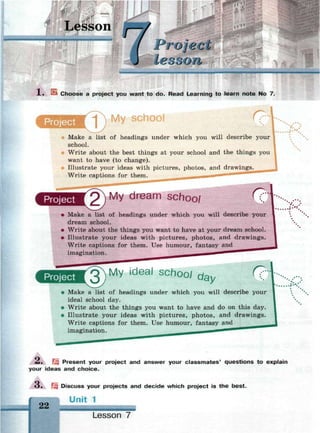
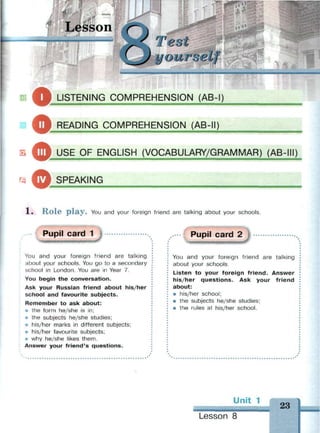
![Z . O r a l r e p o r t . A group of foreign pupils has come on a visit to your school.
What will you tell them about your school and your school life?
Remember to say:
• what your school is like;
• what after-school activities there are at your school;
• what activities you take part in.
You have to talk for one minute. The teacher will listen to you until you have fin-
ished. Then he/she will ask you some questions.
WRITING (AB-IV)
CULTURAL AWARENESS (AB-V)
NEW WORDS AND WORD COMBINATIONS FROM
UNIT 1
Lesson 1
again*
to look forward to*
sightseeing (to go~)
sunbathing (to go~)
Reading lesson
chess*
drama*
a field trip*
an outing*
Lesson 3
assembly
Biology
by heart
Chemistry
to do without
Physics
a waste (of time)
registration
a timetable*
to discover
Lesson 4
to mix with*
Lesson 5
excellent*
to understand
to mean
quite
Lesson 6
according to*
a boarding school*
knowledge*
a meeting*
Reader
to float*
a highlight*
to miss*
a raft*
Answer the questions.
1) Which words do we use to name people's activities on holidays?
2) Which words do we use to name school subjects?
3) Which words do we use to name pupils' activities at school?
4) Which words can you guess?
5) How many new words and word combinations from Unit 1 do you know?
SI Щ > SE1 F-ASSFSRMFNT (AB-VI]
Read Learning to learn note No 8.
24
Unit 1
Lesson 8](https://image.slidesharecdn.com/14858-160704171440/85/14858-7-2011-252-audio-24-320.jpg)
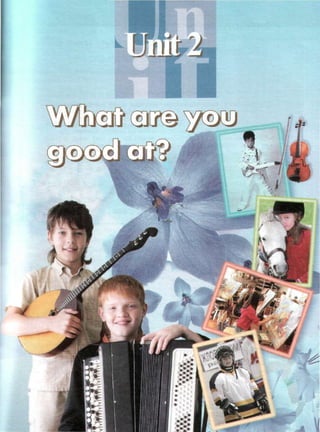
![Lesson
t are your
?
»'•"""•" ""' Ц. MM
1 . In Britain, there are children who have achieved great results in different activities.
553 Ш 1) V o c a b u l a r y . What are George, Jonathan, Jodie and Emilia the best
at? Use the word box to learn the meaning of the highlighted words.
I tried hard and won the BBC* Young Musician of the Year competition.
I think I have musical abilities. I want to be a famous pianist. (George, 13)
I trained properly and set a new national record for the long jump. I think
I've achieved much, but my ambition is to win the Olympics,* to be a top sports
man and a professional. (Jonathan, 14)
I go in for horse-riding and my greatest achievement was when I was in the
British team at the TREC* European Championships. Our team won the bronze
medal. My ambition is to win a gold medal, but
I have to work hard to get what I want. (Jodie, 15)
I won the Young Cartoonist of the Year Award.
I've always enjoyed drawing and I have ability in
drawing. I think it's necessary to practise hard to
be really good at something. (Emilia, 12)
ixx<U
Abbreviations
B B C [,bi: bi:'si:] but T R E C [trek]
to try — стараться
hard — упорно
an ability (in) — способность (в)
properly — правильно, как следует
to set a record (for) — установить ре
корд (в)
to achieve [a'tfrv] — достигать, доби
ваться
an achievement — достижение
an ambition [гет'Ы/эп] — стремление,
цель
top (sportsman) — 1) лучший 2) выс
ший
a professional [prs'fejhsl] — профес
сионал
to go in for phrv — заниматься, увле
каться
championships ['tfgempisnfips] — ( ) Q
чемпионат
gold — золотой
an award [a'woxl] — награда
necessary ['nesasn] — необходимый
Words to guess
bronze a — ?
medal n — ?
professional n — ?
cartoon n — 1) мультфильм 2) юмо
ристический рисунок
cartoonist n — художник-юморист
У
26
Unit 2
Lesson 1](https://image.slidesharecdn.com/14858-160704171440/85/14858-7-2011-252-audio-26-320.jpg)
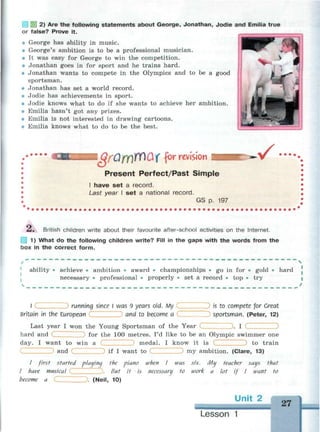
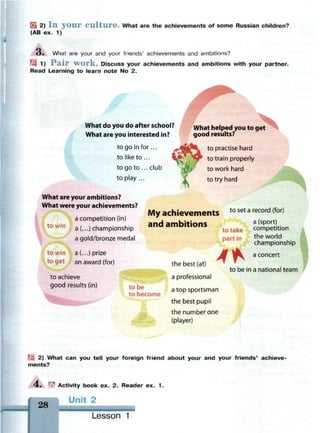
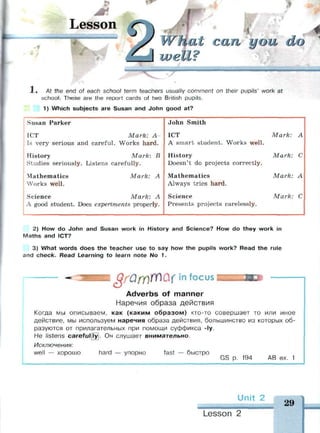
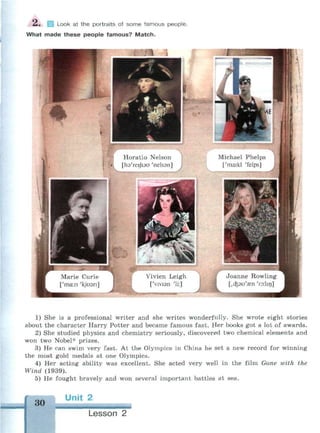
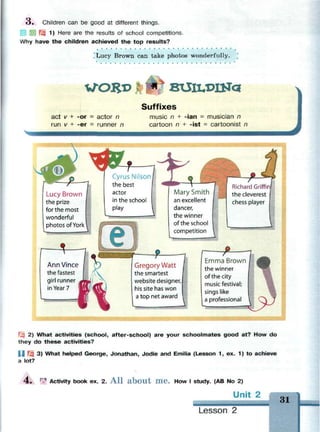
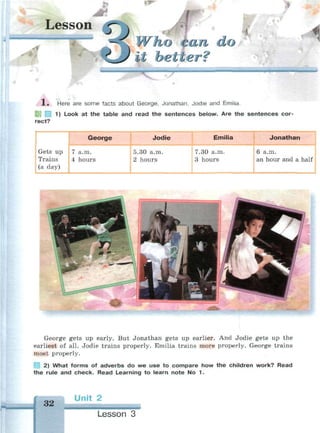
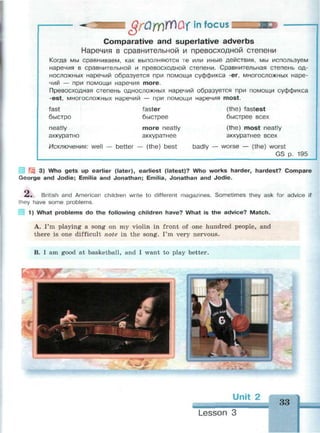
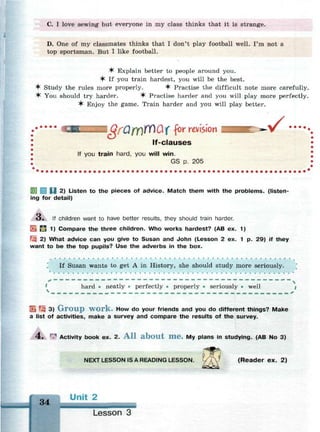
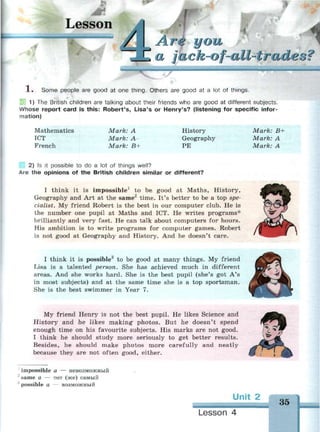
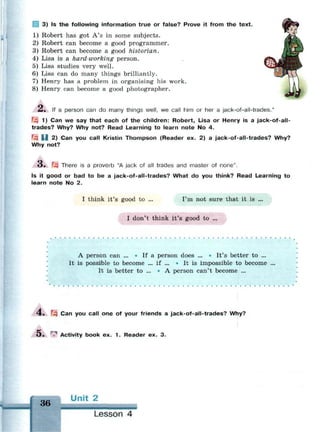
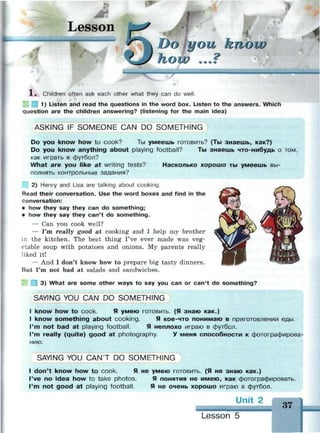
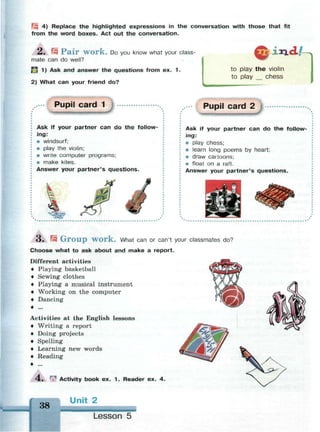
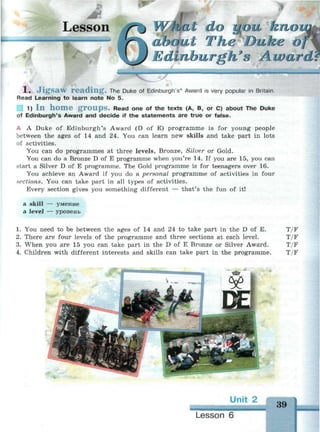
![В You can achieve a Bronze, Silver or Gold Duke of
Edinburgh's Award (or level) if you do a programme
of activities in four sections.
These sections are:
Volunteering/Service: You can help people, your
community or care for animals. Find out who
needs help!
Physical: You can play for a local sports club, go to
dance classes, run or do yoga. You can choose
what to do.
Skills: Have you ever wanted to do something differ
ent? Painting, driving, music or making kites?
You can learn to do something new.
Expedition: Plan and take part in an expedition. You
can choose how you want to travel — by bike, on
a raft, or on a horse or llamal
For each section you can choose from over
50 activities.
a skill — умение
a level — уровень
service — помощь
an expedition — ?
volunteering — добровольная помощь
ч>
ллл.
by bike
on a raft
1. Each level of The Duke of Edinburgh's Award has four sections.
2. You can choose playing football, running or long jump for the Skills section.
3. There is something new for everyone in each section.
4. There are more than 50 activities in each section.
С The Duke of Edinburgh's Award (D of E) is a part of the International Award
Association. The Duke of Edinburgh's Award was the first one. It started in the
UK in 1956.
Now there are programmes in 126 countries. The names of the Award may be
different, but the idea is the same. The Award is not an organisation, but a pro
gramme. Young people help their community,* get life skills, and most of all,
they have fun!
The Award in the Russian Federation began in the Republic of Karelia. It
became a part of the International Award Association in 2006.
a part — часть
a skill — умение
international [jinta'naefnal]
an association [3,s9usi'eijh]
T/F
T/F
T/F
T/F
1. The Duke of Edinburgh's Award has achieved much for 126 years.
2. The Awards in many countries are alike, but the names are different.
3. The Award in Russia is also a part of the International Award Association.
40
Unit 2
Lesson 6
T/F
T/F
T/F](https://image.slidesharecdn.com/14858-160704171440/85/14858-7-2011-252-audio-40-320.jpg)
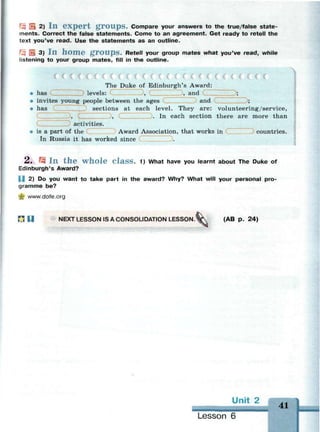
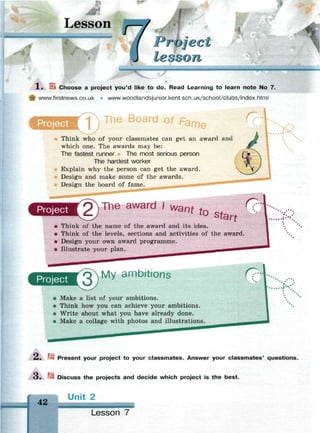
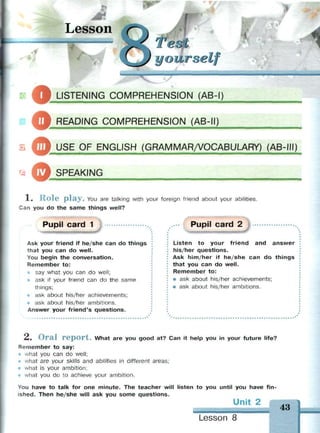
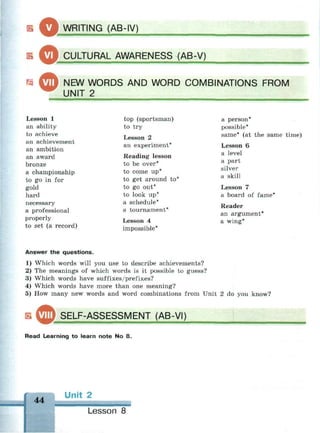
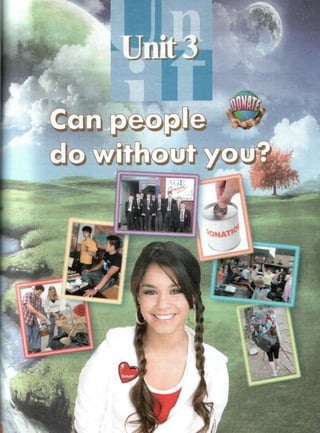
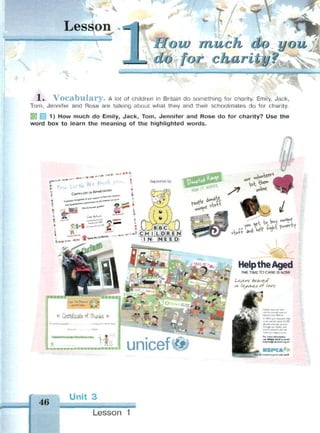
![WORD BXJlLXH&c*
Suffixes
donate v + -tion = donation n
At my school we do a lot of projects for charity. Every class chooses a char-
ity organisation, and then during the year the pupils collect money for the char-
ity. We raise money for different charity organisations: Children in Need,* Save
the Children,* Help the Aged.* (Emily, 13)
A lot of schools in my hometown are involved in collecting money for char-
ity. In our school there is a charity box. If you want to donate some money on
charity, you put the money into the box. Our parents also make donations.
(Jack, 13)
My schoolmates and I like to contribute to charity. All pupils in my class
want to make their contribution. We have a lot of fundraising ideas. We
organise charity fairs and competitions, charity runs, sweet and cakes sales, tal-
ent shows. Then we donate the raised money to different charities. (Tom, 13)
Last year, our class collected clothes and sent them to the UNICEF.* The
clothes went to those in need. This year our class helps the RSPCA.* We vol-
unteer at the local zoo garden. We feed the animals, clean the cages, organise
excursions for kids and do other volunteer work. (Jennifer, 14)
I joined a group of volunteers. We support a girl in India. We provide the
girl with clothes and raised some money for her needs. I'm happy that we can
make a difference to the needy child. (Rose, 13)
iaadJU,
Abbreviations
UNICEF nu:nisef]
but RSPCA [,a:r es pi: si: 'ei]
Unit 3
47
Lesson 1](https://image.slidesharecdn.com/14858-160704171440/85/14858-7-2011-252-audio-47-320.jpg)
![charity ['tfaereti] — благотворитель
ность
a charity (organisation Loxjsnai'zeijh]) —
благотворительная организация
to be involved [m'volvd] (in sth) — быть
занятым, вовлечённым (во что-л.)
to donate [dsu'neit] (to, on) — переда
вать в дар; жертвовать
a donation [dau'neifn] — передача в
дар; пожертвование; to make dona
tions делать пожертвования
to contribute [ksn'tnbjuit] (to) — делать
вклад; жертвовать
a contribution [,kDntri'bju:Jh] — вклад;
пожертвование; to make a (one's)
contribution сделать вклад, внести
свою лепту
a sale — распродажа
to volunteer [.vnbn'tis] —
добровольно помогать
a volunteer [,vDbn'ti9] —
добровольный помощник
to support [ss'poit] — оказывать под
держку; помогать
to provide [prs'vaid] (sb with sth) —
обеспечивать (кого-л. чём-л.)
to make a difference ['difrens] — делать
что-л. значительное, важное
Words to guess
fundraising [/
fnd,reizin] n — ?
need v - нуждаться; need n —
needs n pi — ?; needy a — ?
2) What have you learnt about Emily, Jack, Tom, Jennifer and Rose's contribu
tion to charity? Decide if the following statements are true. Prove from the chil
dren's stories.
1) Emily says that in her school pupils do a lot of charity projects.
2) Emily's school raises money for different charities.
3) Jack's schoolmates and parents donate money to charity.
4) Tom's school organises a lot of charity events.
5) Not all Tom's classmates want to take part in charity fundraising.
6) Tom's school usually spends the raised money on school needs.
7) Jennifer and her classmates support needy people in poor countries.
8) Jennifer volunteers at the zoo.
9) Rose and her friends support a poor boy in India.
10) Rose is glad that she helps the needy child.
48
Unit 3
Lesson 1](https://image.slidesharecdn.com/14858-160704171440/85/14858-7-2011-252-audio-48-320.jpg)
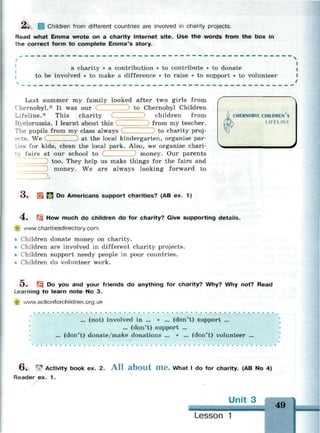
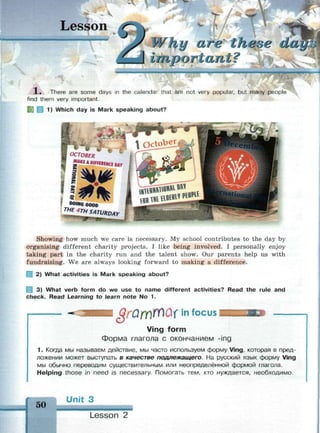
![2. Мы также используем форму Ving в качестве дополнения после глаголов:
ш без предлогов
I enjov taking part in the charity fair. Я с удовольствием участвую в благотвори
тельной ярмарке.
• с предлогами
You can help bv raising money. Вы можете помочь, собирая деньги, (by означа
ет как? каким образом?)
GS р. 202
Л. I Щ Here are some ideas how to contribute to "Make a Difference" Day.
What do you think about the activities?
— Organising a charity fair is a good idea.
— I personally enjoy taking part in a charity run.
. . .
to organise a charity fair
to take part in a charity run
to be involved in fundraising
to donate money on charity
to support those in need
to provide poor people with money, food or clothes
to volunteer at the nearest nursing home1
to clean the local park
to pick up litter in the school playground
to plant trees and flowers
to make a poster about different charity projects
... is a good idea.
... is very important.
... is not fun, but necessary.
... is a good contribution.
I enjoy ...
I'm interested in ...
I look forward to ...
I can help by ...
I always take part in ...
I'm good at ...
I don't mind2
...
O . ES» П What do you know about "Make a Difference" Day? (AB ex. 1)
4 . fjg The surveys show that children all over the world enjoy volunteering.
How do the children volunteer? Finish up what the children say. Use the preposi
tions from the box where necessary. Translate the statements.
by • in • for • on • to • with • without
1
a nursing home — лечебница, дом престарелых
2
to mind [maind] — возражать
Unit 3
••
Lesson 2
51](https://image.slidesharecdn.com/14858-160704171440/85/14858-7-2011-252-audio-51-320.jpg)
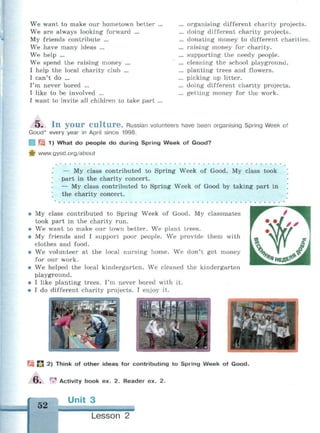
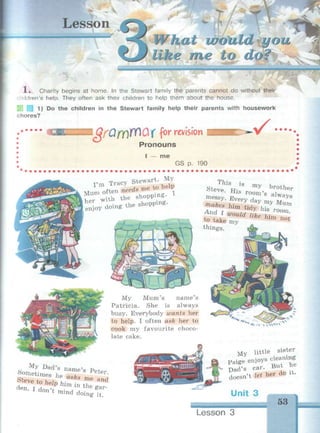
![I 2) What do the Stewarts ask each other to do?
3) What grammar structures do people use when we want other people to do
something? Read the rule and check. Read Learning to learn note No 1.
.QrQmWQXln focus
Complex object (verb + object + (to) infinitive)
Сложное дополнение
Когда мы нуждаемся в помощи (need), хотим (want, would ('d) like), просим
(ask), разрешаем (let) или заставляем (make) кого-либо что-то сделать, мы ис
пользуем после этих глаголов сложное дополнение. Сложное дополнение состо
ит из местоимения в объектном падеже или существительного и неопределён
ной формы глагола. На русский язык сложное дополнение мы переводим при
даточным дополнительным предложением или неопределённой формой глагола.
Mum wants me to help her with dinner. Мама хочет, чтобы я помогла ей пригото
вить обед.
Mum asks Tracy to help her with dinner. Мама ПРОСИТ Трейси помочь ей приго
товить обед.
После глаголов make и let мы не используем частицу to.
Mum always makes us tidy our room. Мама всегда заставляет нас наводить по
рядок в нашей комнате.
GS р. 203
2. Parents often need their children to help around the house.
1) What do the parents want Tracy and Steve to do about the house? What do you
think?
The parents need ... • The parents would like ... • The parents make ...
The parents want ... * The parents ask ... • The parents let ...
do the shopping
do the dishes i*id£
go shopping
but do the shopping
babysit1
with Paige
tidy the house
pick up leaves in the garden
walk the dog
clean Dad's car
cooking
Ей EL 2) Listen to Steve and Tracy talking about their chores around the house and
check your guess. Put the letter T (Tracy) or S (Steve) or both next to their chores.
1
to babysit ['beibisit] (with sb) = to look after
Unit 3
54
Lesson 3](https://image.slidesharecdn.com/14858-160704171440/85/14858-7-2011-252-audio-54-320.jpg)
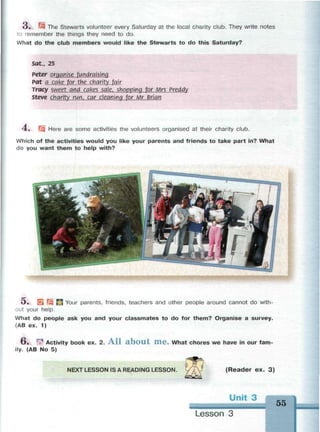
![Lesson
at make
other people?
1 !• ^ 4
X . A lot of British children help people in need.
S3 1) Do Hilary, Stephen and Allison help people around? (listening for the main
idea)
2) Who do Hilary, Stephen and Allison help?
I QfufflfOuX for revision -v •••••
Articles
She helps the elderly people at the local nursing home.
but Helping elderly people is necessary.
GS p. 188
My Mum volunteers for Help the Aged* on Saturdays. She
looks after the elderly people at the local nursing home.
Sometimes my Mum asks me to help her. I help by getting the
patients the things they need or by reading books to them. It's
great when I walk in the room and they smile! Supporting eld
erly people is also helping yourself. You learn about people's
feelings and needs, and become a more caring person. We'll be
old some day and will need people to care for us. Showing sym
pathy1
to other people is really good. I enjoy doing something
that helps others. I don't get money. But I feel good when I
know that I make a difference. (Hilary Preddy, 12)
I QfQfy)№Cif for revision
Pronouns
I don't donate any money.
I donated some money on charity.
%X • • • •
GS p. 191
1
to show sympathy ['simpaGt] (to sb) — проявлять сочувствие
Unit 3
56
Lesson 4](https://image.slidesharecdn.com/14858-160704171440/85/14858-7-2011-252-audio-56-320.jpg)
![I'm sure supporting charities is necessary. I think about mak
ing donations to charity when I see a money box. But usually I
don't donate any money. My family doesn't have much money.
I know that my friends also can't make big donations. But I
never say "no" when our school needs volunteers to clean the
school playground or take part in a charity run. I believe a small
contribution also can help. (Stephen Kent, 14)
I personally1
don't really do any volunteer work. But I help my
parents around the house. They often need me to do some chores.
My Mum never gives me money when I help her around the house.
She says that I should do it to help, not for the money! And I
agree with my Mum. Of course, some chores like tidying the house
and doing the dishes aren't fun, but necessary. Actually,2
I don't
think I make a difference. I know I've helped my parents. And I
feel good. When you do something useful, you don't have money
in your hands, you have money in your heart. (Allison Fung, 12)
| 3) What have you learnt about Hilary, Stephen and Allison? Answer the ques
tions. Prove from the text.
How does Hilary help her Mum at the nursing home?
What makes Hilary volunteer at the nursing home?
Do Stephen and his friends make donations to charities? Why?
What does Stephen do for charity?
Does Allison's Mum pay her for helping around the house? Why?
Does Allison enjoy doing chores around the house? Why?
4) Which of the children can you say the following about? Prove this from the text.
* ... shows sympathy to elderly people. • ... enjoys being involved in charity projects.
• ... worries about people around. • ... makes a difference.
1МЩ 5) What do the children mean by saying the following?
— Supporting elderly people is also helping yourself.
— When you do something useful, you don't have money in your hands, you
have money in your heart.
2. m Can children make a difference in your opinion?
I personally think that ... • I believe that ..., because
That's why I think ...
Do you help other people? How? What makes you help?
r
«^ Activity book ex. 1.1), 2).
1
personally — лично
2
Actually, ... ['aektfuali] — Честно говоря, ...
Unit 3
57
Lesson 4](https://image.slidesharecdn.com/14858-160704171440/85/14858-7-2011-252-audio-57-320.jpg)
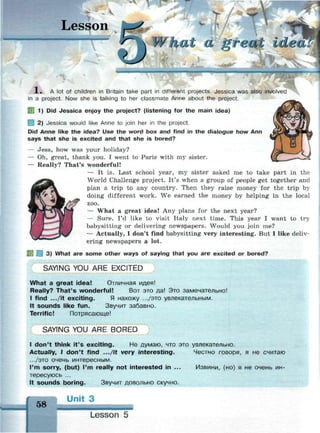
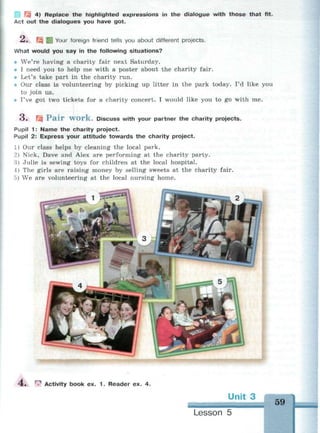
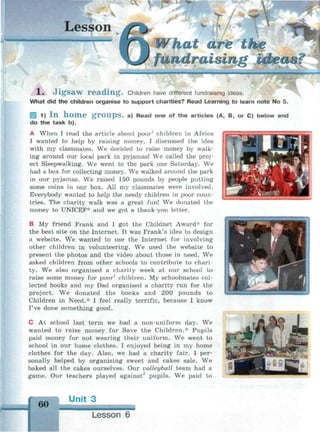
![watch the game. I was supporting the pupils, but the teachers won. It was ter
rific! We raised 300 pounds. I feel good that I've helped one poor1
child in the
world.
poor [риэ] — бедный
2
against [s'genst] — против
SL b) What have you learnt about these children's fundraising ideas? Answer the
questions?
• What charity organisation did the children support?
• Why did the children decide to contribute to the charity?
• What did the children do to raise money for the charity?
• Who was involved in the fundraising project?
• How much money did the children raise?
fq gf, 2) I n e x p e r t g r o u p s . Compare your answers for the task with your
group mates. Come to an agreement. Fill in the table below with the information
you have read. Get ready to retell your group mates the story you have read.
^ S& 3) I n h o m e g r o u p s . Retell your group mates the story you have read.
Use the answers to the questions (ex. 1)b) as an outline. While listening to your
group mates fill in the table.
What charity did
the children sup
port?
What were the
children's
fundraising ideas?
Who was involved
in the fundraising?
What makes the
children organise
fundraising?
2 . Щ I n t h e w h o l e c l a S S . What do the British children do to raise money
for charity?
О . Щ Ц Would you like to join any of the children's projects? Do you have any
fundraising ideas? Share your ideas with your classmates.
ф www.bygpub.com/books/tg2rw/volunteer.htm
4 . r
^ Reader ex. 5.
i.i a NEXT LESSON IS A CONSOLIDATION LESSON. (AB p. 3 9 )
Unit 3
Lesson 6
M M
61](https://image.slidesharecdn.com/14858-160704171440/85/14858-7-2011-252-audio-61-320.jpg)
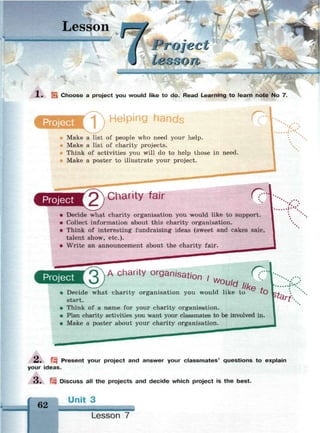
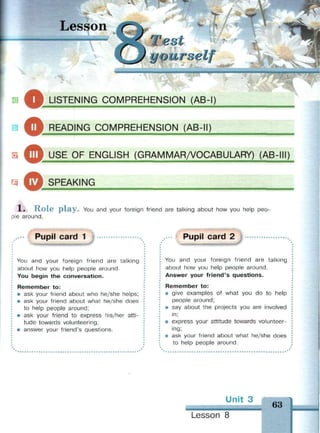
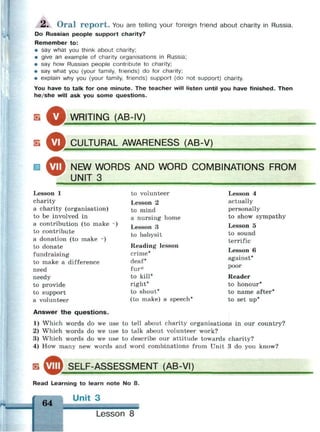
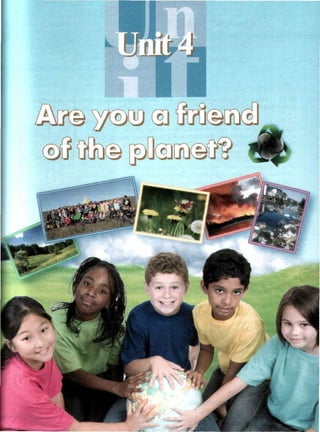
![1 j _
Lesson _
лге you
j eco-friendly? 1 Ч Ч 1 . Ч . 1 1 . •*••
1 . V o c a b u l a r y . The British girl Mia is speaking about her eco-school.
1) What do pupils at eco-school do? Use the word box to learn the meaning
of the highlighted words.
My school is an eco-school.* This means that we
try to look after the environment, because our Earth
is a wonderful world and we don't want to destroy it.
Becoming eco-friendly is not difficult. Everyone can
do something to protect nature.
We do a lot of things. We always put our litter
in a bin because litter pollutes and spoils the envi
ronment. We reuse and recycle newspapers, cans,
plastic and glass bottles instead of throwing them
out. Recycling saves new materials and saves energy.
We help wildlife by being more environmentally
friendly. We do not disturb animals. We've built a nature garden near the school
with a wildlife pond, bird boxes, homes for mice. Besides, our pupils walk or
cycle to school. We think that this helps to reduce air pollution. Air pollution
causes climate change and some animals may disappear. Some chemicals can also
contribute to climate change and damage the natural environment that's why we
do not use them.
environment [m'vairanmant] — окру
жающая среда, природа
Earth (the Earth) [з:9] — Земля
to destroy [di'stroi] — разрушать,
уничтожать
eco-friendly ['i:k9U,frendli] = en,viron'men-
tally 'friendly — не приносящий
вреда природе
to protect [prs'tekt] — защищать, охра
нять
nature ['neitjb] — природа
a bin — контейнер для мусора
to pollute [p37
lu:t] — загрязнять (де
лать непригодным для использо
вания)
to spoil (spoilt) — портить
(вид, качество), делать
менее привлекательным
to recycle [дг/saikl] — воз
вращать в оборот, перерабатывать
glass [gla:s] — стеклянный
instead of [in'sted sv] — вместо
to save — беречь, экономить
wildlife ['waildlaif] — живая природа (жи
вотные, птицы, рыбы в естествен
ном состоянии)
66
Unit 4
Lesson 1](https://image.slidesharecdn.com/14858-160704171440/85/14858-7-2011-252-audio-66-320.jpg)
![to disturb [di'st3:b] — причинять беспо
койство, мешать
a pond — пруд
to reduce [n'dju:s] — уменьшать, сокра
щать
air [еэ] — воздух
pollution [рэ'1и:/зп] — загрязнение
(окружающей среды)
to cause [ko:z] — быть/являться при
чиной, вызывать
to disappear [,diS9'pi9] — исчезать
to damage ['da^mio^] — повреждать,
причинять вред
Words
to guess
use v — использовать
reuse v — ?
use [ju:s] n — ?
natural ['naetfrel] a — ?
environmental [in,vair9n'mentl] a — ?
У
2) Is Mia eco-friendly? What does she personally do? What do you think?
^ 3) Mia's friends do a lot to help nature.
Do you do anything?
Z. [ Here are some pieces of advice for you if you want to be eco-friendly.
is it difficult to follow these pieces of advice? Match the two parts.
?.-cycle old clothes. Take them to
ity shops.
Reuse plastic shopping bags. Do
not throw them away.
Don't leave glass and plastic bot-
s in the woods (= small forest).
Do not use chemicals if possible.
Support a wildlife organisation.
Walk to school instead of going
re by car.
Reduce energy use.
Ф PETE
faiu
Producing electricity also causes climate change.
Pollution from cars damages people's health.
Some of them destroy ozone. Besides, they can
cause health problems.
Glass and plastic can be bad for wildlife.
Plastic bags spoil nature and destroy the planet.
Environmental groups organise different proj
ects to protect nature.
Other people may reuse them.
r revision
Countable and uncountable nouns
a pond GS p. 188
] nature AB ex. 1
.v •••••
Unit 4
67
Lesson 1](https://image.slidesharecdn.com/14858-160704171440/85/14858-7-2011-252-audio-67-320.jpg)
![О . | British and American children remember the three Rs*: reduce, reuse, recycle.
What do they reduce? reuse? recycle? Why? (AB ex. 2)
4 . Alt* is a funny American cartoon character.
] 1) Are his pieces of advice funny? Fill in the gaps with the words from the box
in the correct form.
^ . _ _ _ . . _ _ _ _ _ . . _ _ i — . . . _ _ _ . . — — — _ — — — — _ — — _ _ _ — . . - i _ — i _ _ . . . . _ . .
bin • damage • destroy • disturb • environment • glass • instead of • pollute
protect • recycle • reduce • reuse • spoil • throw • wildlife
, because garbage
• nature. Take care of the
• Always put garbage in a garbage
the countryside,
newspapers, and plastic bottles, and metal
cans. Recycling helps to pollution.
• Don't throw away things if you can them.
• Don't water. Don't garbage into the pond.
С
С
• Never draw or paint on trees. It will
• Plant flowers picking them.
• Don't I animals. Don't
Z).new places for
BE
litter
them,
their homes. Create
AE
garbage
| ^3 2) What does Alf want you to do or not to do?
Alf wants us to protect nature.
O . People in the UK are recycling three times more litter than they were 10 years ago.
U 1) What do they recycle? (listening for specific information/taking notes)
Fiji 2) What do you, your family reduce, reuse and recycle? Why?
O . f.^ Are you, your relatives and your friends eco-friendly? What do you do to
take care of the Earth?
• • • •
In our family we care about the environment. J
f Actually, I really don't do enough to protect nature. J
•
7 . r
? A l l a b o u t m e . My family is eco-friendly. (AB No 6) Reader ex. 1 .
68
Unit 4
Lesson 1](https://image.slidesharecdn.com/14858-160704171440/85/14858-7-2011-252-audio-68-320.jpg)
![esson Are Itier e any
соЫепьо in
и our no пьес own
1 . There are a lot of environmental groups in Great Britain: Friends of the Earth,*
Greenpeace* and others. Here is one of their posters.
| 1) What are they worrying about?
Oar planet is in danger]
Forests are cut down.
Water is polluted.
Air pollution is not reduced.
Join us and clean the Earth.
Everyone can make a difference!
2) What structures do we use to talk about what happens? Read the rule and
check. Read Learning to learn note No 1.
YQmWui in focus
Present Simple Passive
Страдательный залог в настоящем времени
Когда мы сообщаем о действии, которое происходит с предметом, явлением, че
ловеком в настоящем времени (и не называем, кто совершил это действие), мы
используем сказуемое в страдательном залоге, которое состоит из глагола to
be в форме am/is/are и причастия прошедшего времени (V3).
Forests are cut down.
При переводе страдательного залога используются:
неопределённо-личные предложения Леса вырубают,
или безличные предложения Леса вырубаются.
GS р. 201
Unit 4
69
^
Lesson 2](https://image.slidesharecdn.com/14858-160704171440/85/14858-7-2011-252-audio-69-320.jpg)
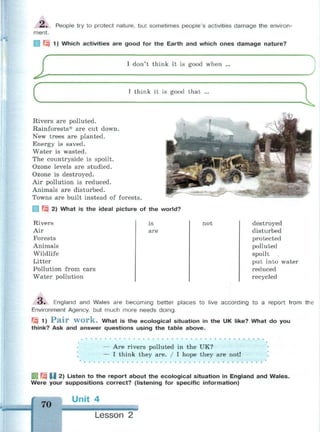
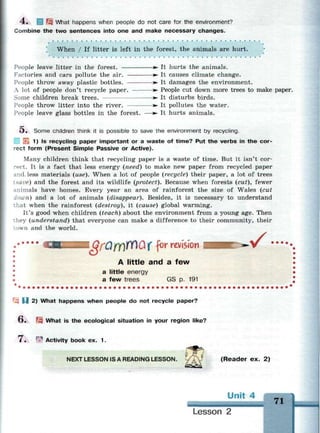
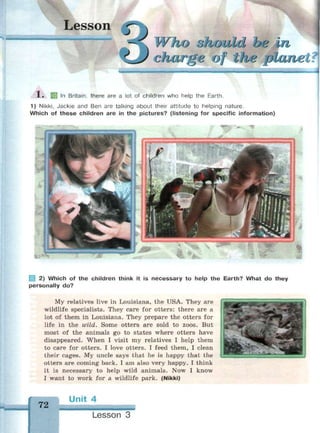
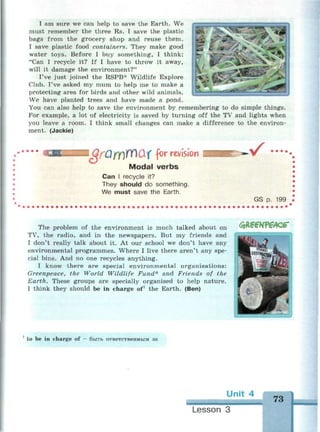
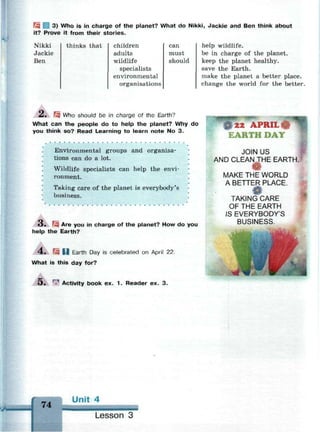
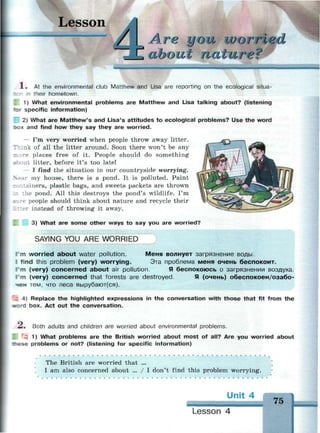
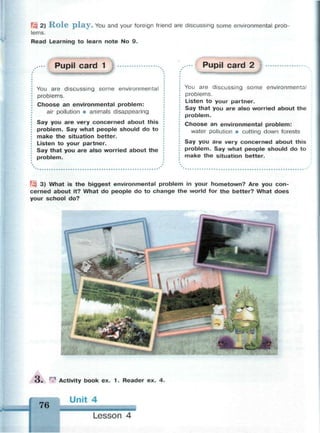
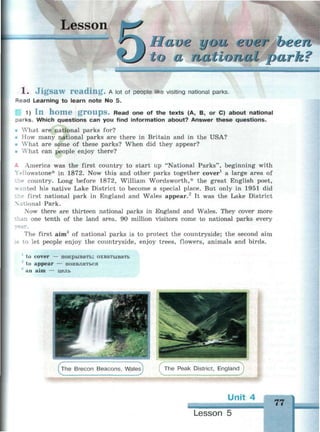
![В The USA is a larger country than Britain. There are more than sixty nation
al parks in the USA. The Great Smoky Mountains,* the Grand Canyon* and
Yellowstone Park* are the most popular of them. The Everglades, in Florida, is
one of the most interesting places. Most of its territory is covered1
with grass.
Open water is sometimes found, and there are a lot of islands with tropical
plants. If you visit the Everglades, you can see a lot of alligators. Be careful,
they are dangerous! They are protected, because the Everglades is a national park.
Naturalists and tourists come to see water birds, bobcats,* bears and alligators.
to cover покрывать; охватывать
f The Grand Canyon, USA ]
J B i О О ff)f(Q( for revision
Articles with geographical names
the Everglades, Florida
v •••
GS p. 189
С The Lake District is the largest national park in
Britain. It is popular with walkers, cyclists, and people
who go boating. It is one of the most beautiful and
attractive places in the country. It has Windermere
['wmdamis], the longest lake in England, and Scafell Pike
[,sko:fel 'paik], the highest mountain in England.
In 1810 William Wordsworth* described the beauty
of the Lake District in his poems. The works of
Wordsworth* and other romantic poets attracted visi
tors to the lakes. And now the Lake District is one of
the most popular tourist places in Britain. Here you can
enjoy fishing in the rivers and lakes, boating on the quiet waters or walking and
cycling along the shores of the lakes. There's something for everyone!
f
78
Unit 4
Lesson 5](https://image.slidesharecdn.com/14858-160704171440/85/14858-7-2011-252-audio-78-320.jpg)
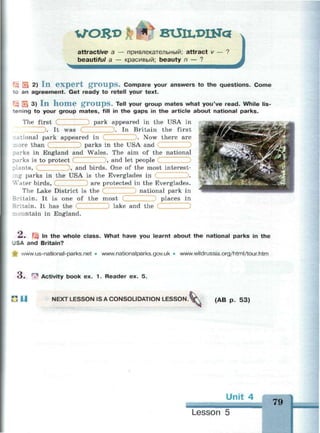
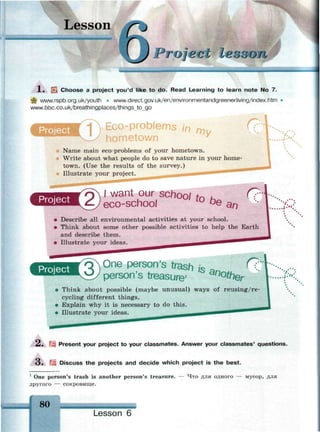
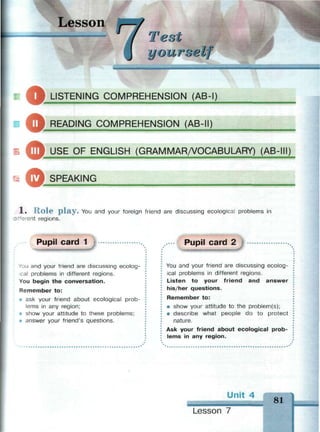
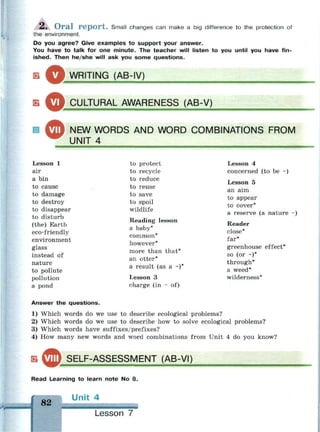
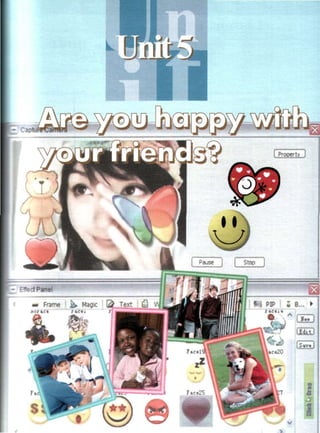
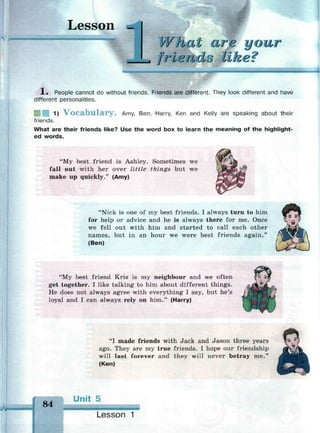
!["My friendship with Hazel started with e-mailing and chat
ting on the Internet. Then we met and now Hazel is one of my
best friends. She can keep secrets and has a good sense of
humour. And she never forgets about my birthday!" (Kelly)
to fall (fell; fallen) out (with sb over
sth) phr — ссориться (с кем-л. из-за
чего-л.)
to make (made; made) up phr — (по)ми-
риться
quickly ['kwikli] — быстро
to turn to (sb for sth) — обращаться
(к кому-л. за чем-л.)
to be there (for sb) idm — быть гото
вым прийти на помощь (кому-л.)
a neighbour ['neiba] — сосед, соседка
to get together phr — встречаться, со
бираться вместе
to rely (on sb) — полагаться, надеять
ся (на кого-л.)
to make (made; made) friends (with sb)
idm — подружиться (с кем-л.)
true [tru:] — верный, пре
данный
to last — продолжаться,
длиться
forever [far'eva] — навсегда, навеки
to betray [bi'trei] — предавать
a sense of humour ['гуи:тэ] — чувство
юмора
Words to guess
to keep v — хранить
a secret n — ?
can keep a secret — ?
2) What have you earnt about Amy, Ben, Harry, Ken, Kelly, and their friends?
Decide if the following statements about them are true, false or unstated.
Amy and Ashley often fall out with each other.
Amy and Ashley make up quickly.
When Ben is upset his friend Nick is always there for him.
Kris and Harry often get together because they are neighbours.
Kris can rely on Harry because Harry is a true friend.
Ken thinks that his friendship with Jack and Jason will last forever.
Ken is sure that his friends will never betray him.
Kelly made friends with Hazel three years ago.
Kelly can keep secrets and has a sense of humour.
BE
neighbour
humour
AE
neighbor
humor
—. Here are the questions Amy, Ben, Harry, Ken and Kelly would like to ask you.
1) Complete the questions and then listen to check.
— Do you often get ... with your friend?
— Have you ever fallen ... with your best friend?
— Do you make ... quickly?
Unit 5
85
Lesson 1](https://image.slidesharecdn.com/14858-160704171440/85/14858-7-2011-252-audio-85-320.jpg)
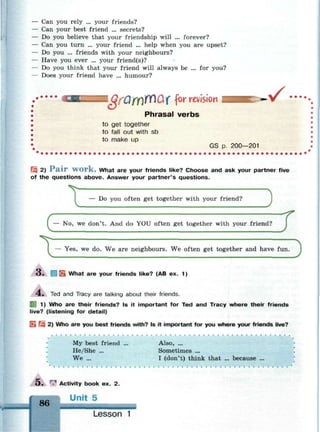
![Lesson
What makers
good frien
'У
1 . People have different opinions on friends and friendship.
1) Here is a poem by Mark Santos, a teenager.
HIQW does Mark characterize friends and friendship?
For me a friend is a person who cares,
For me a friend is a person who shares,
A person who is honest and fair,
A friend is someone who is always there.
Friendship is a feeling1
that lasts forever.
And a true friend betrays you never.
2) What grammar structures are used in the poem to describe a true friend and
iendship? Read the rule and check. Read Learning to learn note No 1.
QrOfY)YTiQ(ln f o c u s
Relative clauses with who/that/which
Придаточные определительные с союзными словами
(который/которая/которое/которые)
в качестве подлежащих
В придаточных определительных предложениях союзные слова who/that/which
могут выполнять роль подлежащего.
Если мы описываем человека, мы используем придаточные определительные
предложения с союзными словами who или that. Если мы описываем предмет,
мы используем придаточные определительные предложения с союзными слова
ми which или that. Например:
My friend is а person who is always there for me.
Мой друг — человек, КОТОРЫЙ всегда готов прийти мне на помощь.
Friendship is а feeling which/that can last forever.
Дружба — это чувство, которое может длиться вечно.
GS р. 205
3) Do you agree with how Mark describes a true friend and friendship?
a feeling ['fi:lin] — чувство
Un
Lesson 2
87](https://image.slidesharecdn.com/14858-160704171440/85/14858-7-2011-252-audio-87-320.jpg)
![2l. 1 Your classmates and you can also have your own opinions on friends and friendship.
What do you think about friends and friendship?
Friendship is a feeling
A true friend is a person
Friends are people
who
which
that
(is/are) honest/fair/...
can keep secrets.
can rely on one another.
(is/are) always there for you.
(can/cannot) last forever.
make up quickly.
never fall out over little things.
often get together and have fun.
turn to one another for help.
will never betray (you).
make(s) you happy.
teenage
илес
о . Pete Payne is the character in the book The Diary of a Teenage Health Freak.* Here are
some notes from his diary.
| 1) Who does Pete write about in his diary? What are his notes about?
This diary writer's Name — Pete Payne. 14 years old.
Nickname — "Know It All Pete."
Hobbies — watching TV, worrying about myself, teasing my younger
sister.
Personality1
— shy, unattractive to girls, afraid of life, bad at sport;
doing my homework before watching TV.
• My older sister. Name — Sally.
Personality — bossy, and will do anything for money (she wants to buy a
motorbike).
• My younger sister. Name — Susie Jane.
Personality — worries what her friends will think of her family, enjoys shopping.
• My best friend. Name — Sam Sproggs.
Personality — crazy about bicycles, attractive to girls, tries to be original but
isn't, gets more pocket money than me.
• Pet — cat (Sally's). Name — Bovril. Age — 14 months and losing all her hair.
• My house. Three bedrooms and a shoebox for Susie.
• My room. Books everywhere.
Щ 2) Can you say the following about Pete Payne? What can you add?
The diary's writer is a boy who has a nickname "Know It All Pete". He lives in the
room which looks like a library: books are everywhere.
| ^ 3) Describe the other people and things in Pete's diary.
SL Щ H 4) Write down a few notes about your family and friends. Exchange these
notes with your classmates. Tell the class about what you've learnt from the notes.
4 . r
^ Activity book ex. 1 . Reader ex. 1 .
1
a personality [,p3:s9'n<el9ti] — личность, индивидуальность
Unit 5
88
Lesson 2](https://image.slidesharecdn.com/14858-160704171440/85/14858-7-2011-252-audio-88-320.jpg)
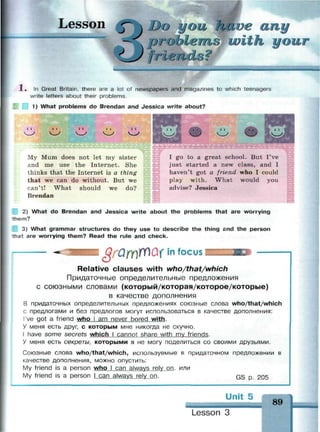
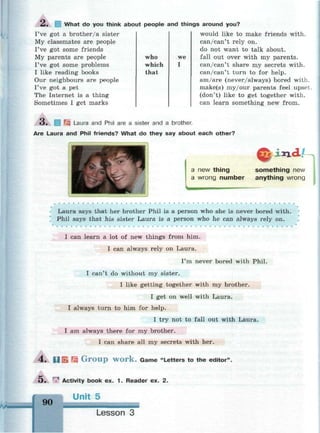
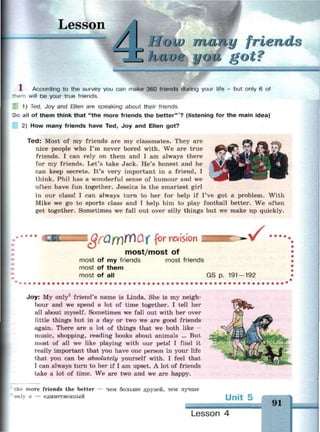
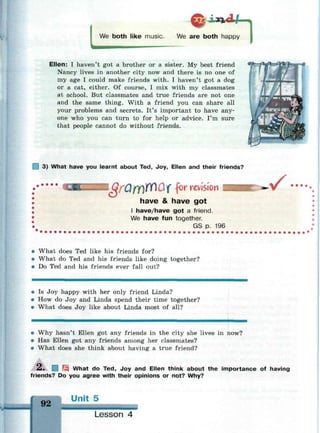
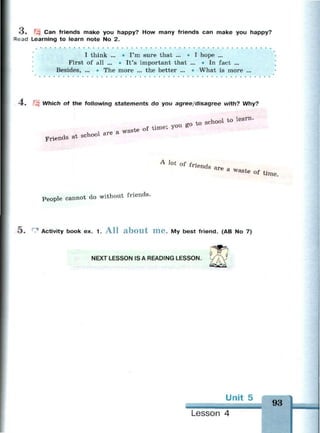
![Lesson
Could ше be pen
frl finds With you?
1 . Nowadays a lot of children from different countries go on exchange trips to Great
Britain. On his exchange tour, Oleg from Russia made friends with Mike.
1 1) What does Oleg suggest1
to Mike on his last day in Britain? (listening for
specific information)
2) What do Oleg and Mike want to swap2
e-mail address
es for? Use the word box to find out how people can make
suggestions and say that they are ready to do something.
Oleg: I say, Mike, we've got on well with you for a month.
Why don't we swap e-mail addresses and become pen
friends?
Mike: Why not? I thought about it as well.
Oleg: We might e-mail each other and share our opinions
about films, books, and school — anything!
Mike: Sure.
Oleg: And how about coming to Russia sometime?
Mike: I'd be happy to come. Thanks.
J
SUGGESTING
How about coming to Russia one day? Как насчёт того, чтобы приехать когда-
нибудь в Россию?
You could correct my letters. Ты мог бы исправлять ошибки в моих письмах.
We might (as well) call each other. Мы могли бы (также) звонить друг другу.
Why don't we call Andrew? Почему бы нам не позвонить Эндрю?
SAYING YOU ARE READY TO DO SOMETHING
I'd be happy to do it. Я бы с удовольствием (сделал(а) это).
No problem. Нет проблем. (Согласен. Согласна.)
OK./Sure. Конечно.
Why not? Почему бы и нет?
1
to suggest [sa'cfeest] — предлагать
2
to swap (also to swop) — менять, обменивать(ся)
Unit 5
94
Lesson 5](https://image.slidesharecdn.com/14858-160704171440/85/14858-7-2011-252-audio-94-320.jpg)
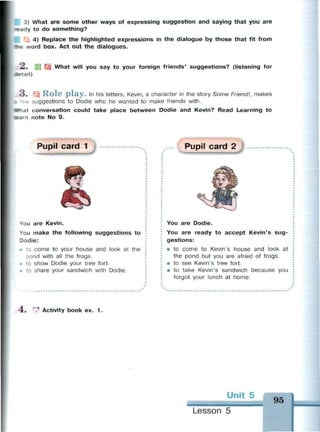
![Lesson ("J Why do children
from different сои
tries make friends?
» ""f.«
1. Jigsaw reading. Children from different countries communicate in different
ways to better understand one another.
Read Learning to learn note No 5.
^ www.bbc.co.uk/worldclass/twinning.shtml • www.iss.edu
g 1) I n h o m e g r o u p s . Read one of the texts (A, B, or C) and answer the
questions.
A Lizzie from Great Britain goes to a school which is twinned with another school in West Africa.
a) What does Lizzie write about her pen friend in another country?
My school is twinned1
with an international school in West Africa. We are
swapping work projects with African children. We want to learn the things that
African children learn and what life in Africa is like. I have got a great pen
friend at this school. Her name is Shannen. We communicate2
by e-mail. I've
learnt a lot of interesting things from Shannen: about the festivals her family
celebrates, about their traditions and everyday life. Her language, religion3
and
lifestyle4
are absolutely different but we understand each other very well. It is
really important to have a friend in another country. It helps to learn more about
other cultures and traditions.
1
to be twinned — зд. иметь дружеские связи
2
to communicate [ka'mjuinikeit] — общаться
3
a religion [n'licfcan]
4
a lifestyle
религия
образ жизни
| b) Get ready to talk about Lizzie and her pen friend to your expert group mates.
What is it like to have a pen friend in another country?
Lizzie goes to school which
They ... because ...
Lizzie has got ...
They ...
Lizzie has learnt ...
She thinks it's important because
* c) In the text find three reasons why it is important to have pen friends in
other countries.
96
Unit 5
Lesson 6](https://image.slidesharecdn.com/14858-160704171440/85/14858-7-2011-252-audio-96-320.jpg)
![E Here is Harriet's report about the children who Harriet goes to an international school with.
a) Does Harriet like going to an international school? Why?
There are 30 children in our class and 10 of them are from different coun
tries. It's really interesting to have so many people from all around the world
in one school. Everyone has different religions,1
lifestyles,2
families and stories
to tell. We are all different but we all get on well. We communicate3
every day
and I have learnt a lot about their religions. I have also learnt about their cul
tures from festivals and performances which are organised at our school. I advise
an international school to everyone. They make you understand how big the
world is and how many people live on the planet we call home. They help you
to understand that we are all different and at the same time we are much alike.
a religion [n'lickan] — религия
~ a lifestyle — образ жизни
to communicate [ka'mjuimkeit] — общаться
j b) Get ready to talk about international schools to your expert group mates. What
s it like to go to an international school?
Harriet goes to ..
There are ... and
Everyone has ...
They ...
Harriet has learnt ...
International schools
i c) In the text find three reasons why it is important to go to an international
school.
Here is the story of Carrie Ann who with other young people from different countries
: : K part in a cross-cultural' project.
a) What was the cross-cultural project like?
I've taken part in a cross-cultural project. I spent a week in the Lake
District.* I was happy to communicate2
with 24 young people from different
countries. There was a great choice of activities which we could take part in —
from rock climbing to jumping in an ice-cold lake at seven in the morning!
This project helped us to know each other better and understand more about
each others' religions3
and lifestyles.4
By sharing different experiences we have
learnt a lot about each other's cultures. I think it is better than reading a book
in a classroom.
We have swapped e-mail addresses and telephone numbers. I believe that we
have not only learnt a lot of different things but we have made great friends.
cross-cultural — межкультурный
to communicate [ks'mjuinikeit] — общаться
a religion [n'lic&sn] — религия
a lifestyle — образ жизни
Unit
97
Lesson 6](https://image.slidesharecdn.com/14858-160704171440/85/14858-7-2011-252-audio-97-320.jpg)
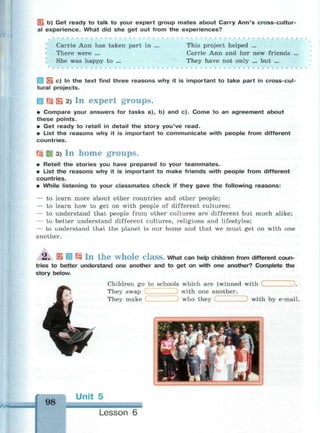
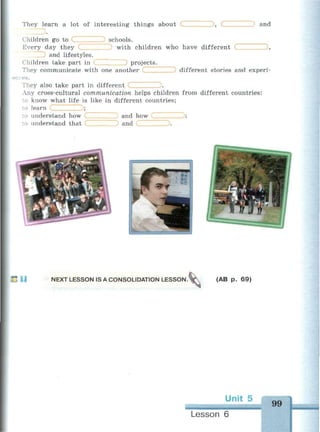
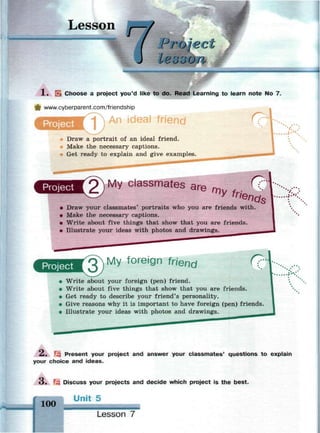
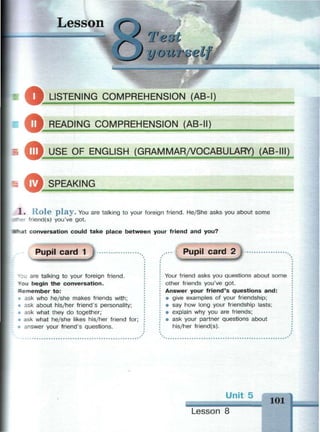
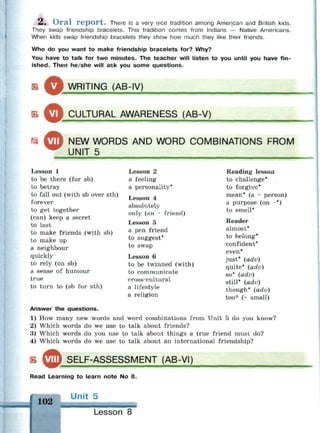
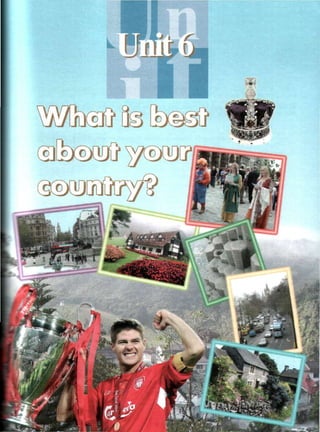
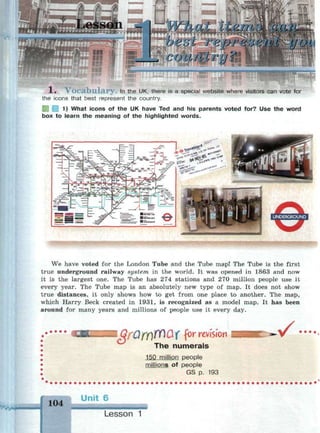
![I have voted for the British Library, the national
ibrary of the UK and one of the world's greatest
libraries. It is packed with millions of books, magazines,
newspapers, maps and other items. The Library has a
copy of every publication which is produced in the UK.
The collection includes more than 150 million items in
foreign languages and some very significant things:
Leonardo da Vinci's* notebook and the Beatles* manu
scripts! The Library is a true icon of the UK!
• • •
My choice is Sherlock Holmes,* the most famous detective in the world! Sherlock
Holmes is part of our culture. He represents all that is great in this country. To
-iany, Sherlock Holmes is the most typical example of an English character. Every
ly Sherlock Holmes' fans from all over the world visit his museum at 221b, Baker
Street in London.
2) Have Ted and his parents made their choice because of the following reasons?
Use the texts to prove that:
• the London Tube is the oldest underground railway system in the world.
• the London Tube is the largest one in the world.
• the London Tube map is an absolutely new type of map.
• the British Library is one of the greatest libraries in the world.
• Sherlock Holmes is one of the most famous detectives in the world.
^.QrOjfYiWQf fw revision • / •
The degrees of comparison of adjectives
large famous
larger more famous
the largest the most famous GS p. 192—193
to vote (for) — голосовать (за)
a tube — туннель, метрополитен
an underground railway — подземная
железная дорога
to recognize — признавать
as — как, в качестве
to be around idm — существовать
to pack (with sth) — заполнять (чём-л.)
an item — предмет (из списка)
a publication [,pAbli'keijh] — произведе
ние, издание
to include — включать, содержать
significant [sig'nifikant] — значительный
a manuscript ['masnjusknpt] — руко
пись, партитура
an icon f'aiksn] — символ
to represent — представ
лять (собою)
a character — 1. характер,
нрав 2. герой, персонаж
Words to guess
a type n — ?
a distance n — ?
a copy n — ?
to collect — коллекционировать;
a collection n — ?
a detective n —?
a fan n — ?
Unit 6
105
Lesson 1](https://image.slidesharecdn.com/14858-160704171440/85/14858-7-2011-252-audio-105-320.jpg)
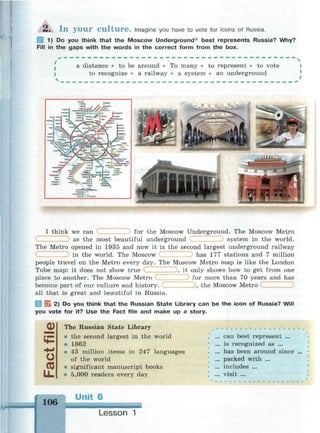
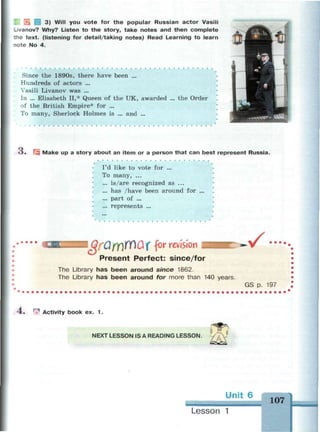
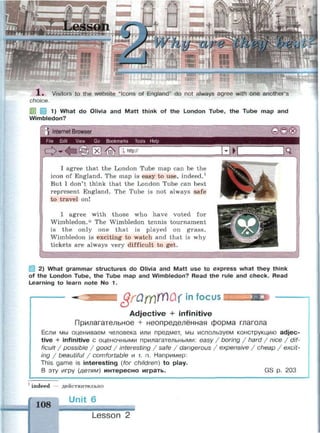
![ГОЯ*>
Prefixes
im + possible = impossible
in + expensive = inexpensive
un + easy = uneasy
un + interesting = uninteresting
un + safe = unsafe
un + exciting = unexciting
un + comfortable = uncomfortable
L-. Visitors to the website "Icons of England" do not only vote for other people's
znoice but they can make their own choice.
What items do some British people vote for? What is special about these items?
Match the two parts and the pictures on p. 110.
^- www.icons.org.ru
I My choice is fish and chips.*
» Cottage gardens are recognized as part
f our culture.
3) I love the British weather!
I'd like to include Madame Tussaud's
•fuseum.*
i i I vote for Alice's Adventures
Vonderland* by Lewis Carroll.*
in
6) I vote for the Oxford English
Dictionary!
') A traditional cup of tea!
a) It is a typically English dish. I think
that fish and chips is necessary for every
visitor to the UK to try!
b) The book is a significant part of British
culture. It is very exciting for both chil
dren and adults to read.
c) They are not easy to look after but they
are absolutely marvellous!
d) It is very interesting to talk about
because it is always changing!
e) British everyday life is impossible to
imagine1
without afternoon tea.
f) It has been around for more than 200
years. The collection of life-size figures of
famous people is exciting to look at,
indeed.
g) It is made up of 20 books and includes
5,000,000 English words! The Dictionary
is necessary for every English language
lover to have and use.
to imagine [I'mascfcin] — представлять, воображать
Unit 6
Lesson 2
109](https://image.slidesharecdn.com/14858-160704171440/85/14858-7-2011-252-audio-109-320.jpg)
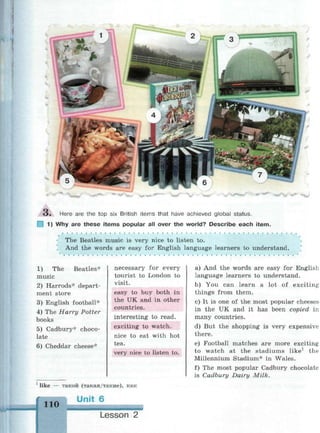
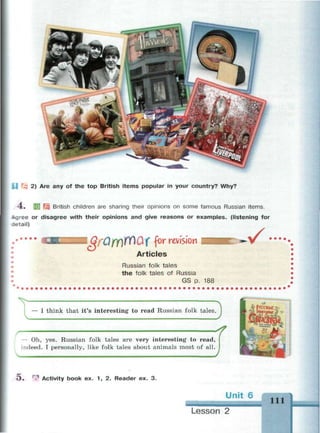
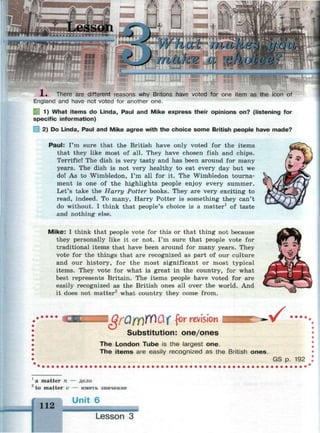
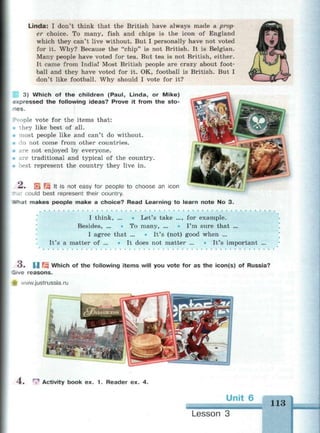
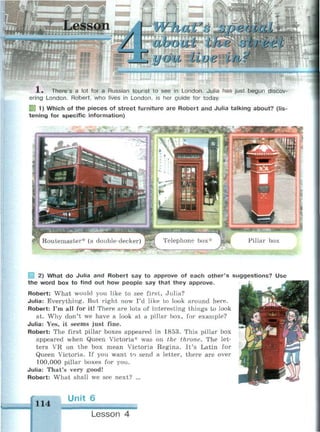
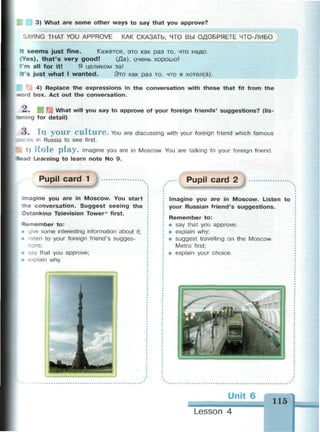
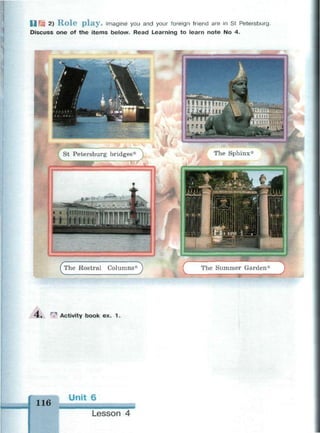
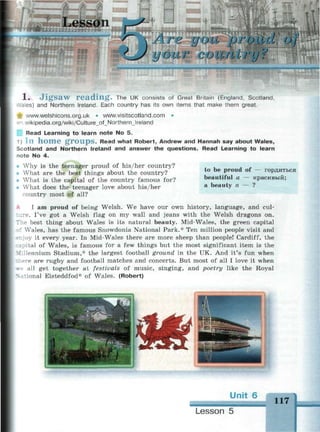
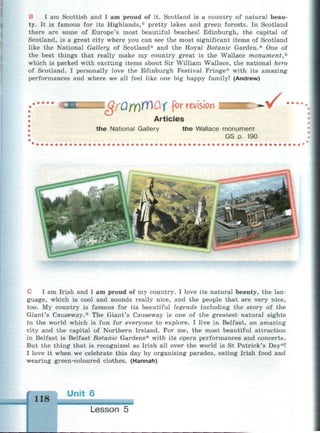
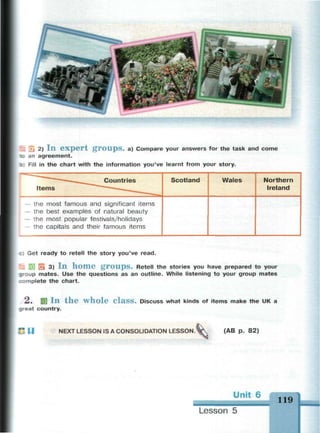
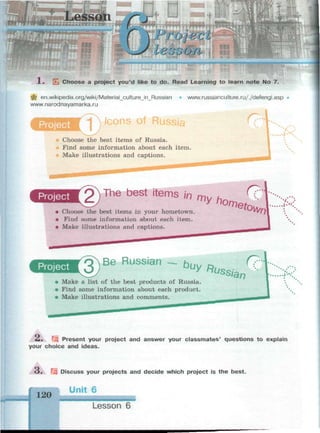
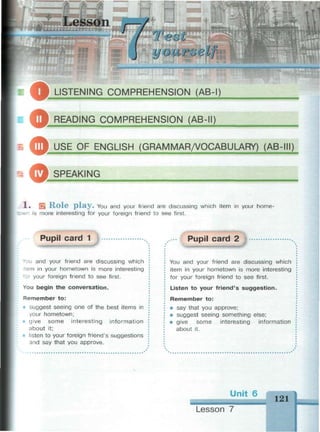
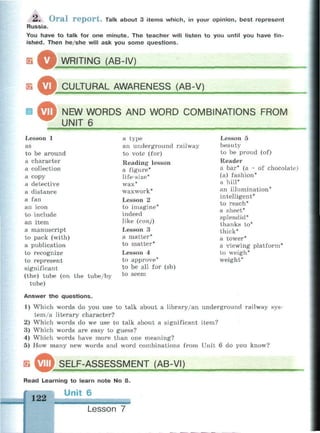
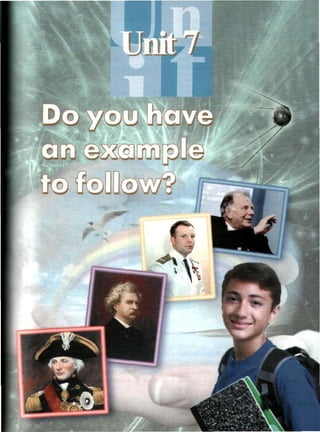
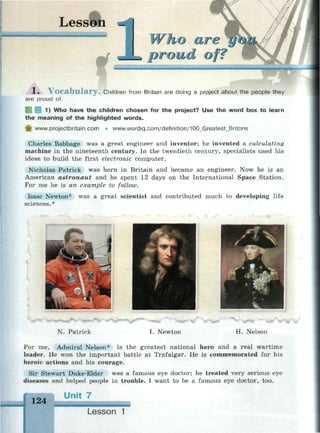
![The noun as an attribute
an eye doctor a heart disease
f • • m
a space station
GS p. 188
an inventor [in'venta] — изобретатель
to invent [m'vent] — изобретать,
делать открытие
a machine [ma'Jni] — машина;
механизм
a century ['sentfan] — столетие, век
space [speis] — космос, космическое
пространство
an example to follow — пример для
подражания
a scientist ['saisntist] — учёный
to develop [di'velap] — развивать;
совершенствовать
a hero ['гпэгэи] — герой
a leader [МЫэ] — руководитель, глава,
лидер
to commemorate [кэ'тетэ-
reit] — ЧТИТЬ память
heroic [пэ'гэшк] — героичес
кий
an action ['aekfn] — дейст
вие, поступок
courage ['клпф] — мужество
to treat [tri:t] — лечить
a disease [di'zi:z] — болезнь
trouble [ЧглЫ] — неприятности, горе,
беда
Words to guess
an astronaut ['eestrsnoit] — ?
a cosmonaut ['kozmanoit] — ?
2) Why have the children included these people into the project?
2. I n your culture. Here are the people that children from Russia have cho
sen for their project.
| Щ 1) Why have they chosen them? Match the two parts.
t:::::z:z в Oft) ft) Q( for revision v •••••
Articles
to be a scientist to become queen
GS p. 189 AB ex. 1
Unit 7
125
Lesson 1](https://image.slidesharecdn.com/14858-160704171440/85/14858-7-2011-252-audio-125-320.jpg)
![1) Petr Kapitsa* (1894—1984) was a great
Russian scientist.
2) Valentina Tereshkova (1937—) is the
first woman cosmonaut.
3) Igor Sikorsky* (1889—1972) was a
famous engineer and inventor.
4) Alexander Bakulev (1890—1967) was a
great surgeon.
5) Alexander Suvorov (1729—1800) was a
great military leader.
6) Alexander Matrosov was a wartime hero
who became famous for his courage.
a) He treated people who had serious hear-
,
diseases.
b) He was famous for his works
Physics.
c) His heroic action saved many soldiers.
d) He was a hero of the 18th century. K-
is commemorated for many battles that i-
won.
e) He developed a helicopter, the fir-
practical flying machine in the 1930s.
f) She went to space in 1963.
V. Tereshkova P. Kapitsa One of Sikorsky's helicopters
1 2) Here is the page from Sveta's project.
Do you agree with her choice? Fill in the gaps with the words from the box in the
correct form.
• »
I action • century • commemorate • courage • Hero
invent • inventor • scientist • treat • trouble »
I admire Vladimir Shukhov.* He is often called the number one Russian engi
neer. And he is a famous Russian , architect and . He
many useful things. He built bridges, factories, special towers, ships,
railways and railway stations. Vladimir Shukhov invented the first pipeline1
in
Russia in the nineteenth
tre of Moscow.
! He is in the statue in the cen-
a pipeline ['paiplam] — нефтепровод
126
Unit 7
Lesson 1](https://image.slidesharecdn.com/14858-160704171440/85/14858-7-2011-252-audio-126-320.jpg)
![I respect Leonid Roshal.* He is the most famous children's doctor in Russia.
children inHe helped many children in
angerous places. For his
. Doctor Roshal
and for his
he European of the Year in 2005, the Doctor of Peace1
and a National
he got many awards:
: Russia. In 1996 he became the Doctor of the World. For me, Doctor Roshal
.5 an example to follow.
One of Shukhov's towers V. Shukhov L. Roshal
3) Who do you admire?
... is/was ...
... lives/lived in ...
... is/was famous for ...
... is commemorated for
о . ^ Activity book ex. 2. Reader ex. 3.
ace [pi:s] — мир
Unit 7
127
Lesson 1](https://image.slidesharecdn.com/14858-160704171440/85/14858-7-2011-252-audio-127-320.jpg)
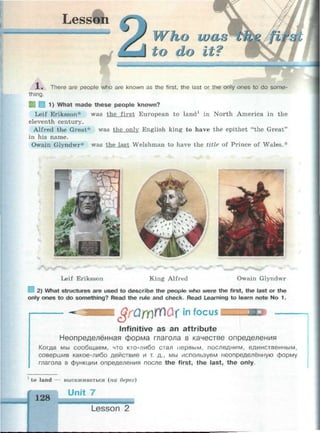
![На русский язык такая конструкция переводится с помощью придаточного
определительного предложения:
Leif Eriksson was the first European to land in North America in the eleventh
century.
Лиф Эриксон был первым европейцем, который высадился в Северной
Америке в одиннадцатом веке.
GS р. 203
| 3) Do you know what these people did? Match, listen to check and translate.
1 i Richard Burbage was the first English
tor
_ i Elizabeth I was the last
:» Captain James Cook was the first
European
41 Sir Robert Falcon Scott* was the second
European
: i John Logie Baird was the first inventor
~ i Elizabeth Garrett Anderson was the
first
Harrison Schmitt was the only scientist
a) to come to the South Pole in 1912.
b) English woman doctor to treat people.
c) to show television in 1926.
d) to visit the Moon.
e) Tudor* monarch* to rule1
England.
f) to play the role of Hamlet.*
g) to visit Australia.
Articles
the South Pole — Южный Полюс
the Moon [mu:n] — Луна
GS p. 190
R. Burbage J. L. Baird E. G. Anderson
to rule — править
Unit 7
129](https://image.slidesharecdn.com/14858-160704171440/85/14858-7-2011-252-audio-129-320.jpg)
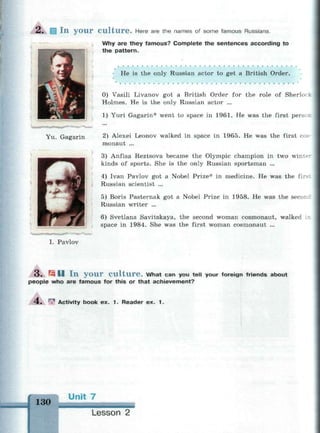
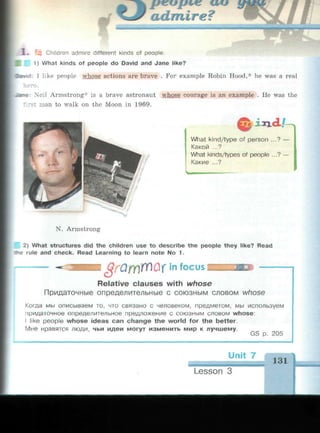
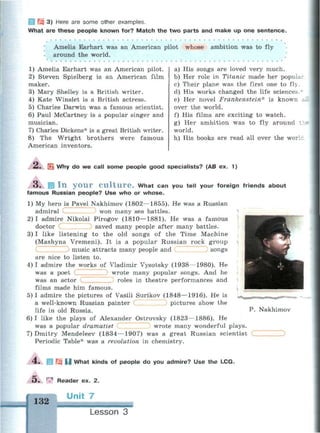
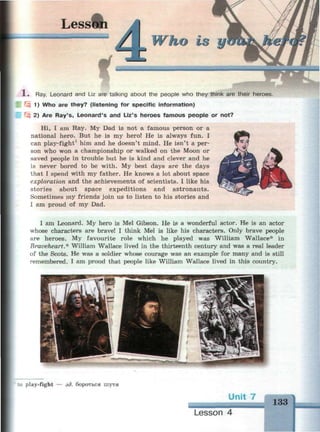
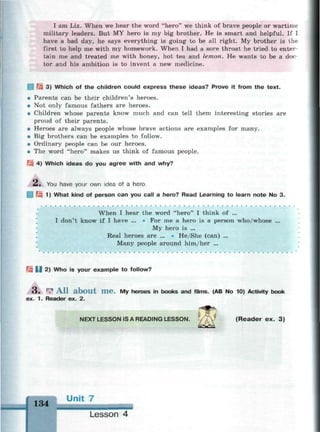
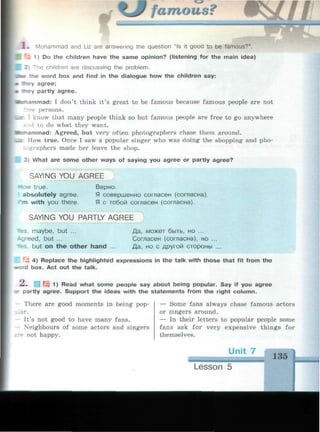
![— There are bad things in being popular.
— All popular people are very busy.
— Young and unknown singers are free to
go anywhere.
— Some fans are not polite.
— People don't recognize1
young singer?
— People give gifts and flowers to pop 1.
lar actors, sportsmen or singers.
— They don't have time to enjoy then
selves.
— The fans of these actors and singers i
noisy2
and leave litter.
U Щ 2) Think of good and bad moments in the lives of popular actors, singers or sports
men and write your statements.
FJ3 3) P a i r w o r k . Come out with your statements. Agree or partly agree with
your group mates.
O . ^Activity book ex. 1.
1
to recognize ['rekagnaiz] — узнавать
2
noisy ['noizi] — шумный
136 I
Lesson 5](https://image.slidesharecdn.com/14858-160704171440/85/14858-7-2011-252-audio-136-320.jpg)
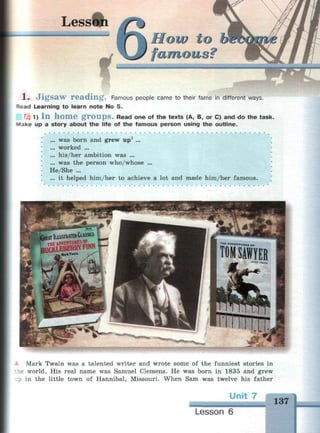
![died. The shock changed him and he became a different boy. He stopped his lit
tle-boy games and thought about his mother's hard work and money problems.
He had to help his mother. Sam went to work in his brother Orion's printing
shop.2
At that time Sam began to write funny stories and took the name Mark
Twain. Mark Twain had to change many jobs. He worked hard and visited many
places in the USA. His experience and talent helped him to write his funny sto
ries and people in America began to read and like what he wrote, and soon his
stories became popular all over the world.
1
to grow up ['дгэи Чр] — становиться взрослым
2
a printing ['pnntin] shop — печатная мастерская
В Henry Ford was a man whose ideas changed the world.
He was born in 1863 on a farm near Detroit, USA. But he didn't want to live
on the farm because he hated farming and he liked cars. When he was 16, he
went to Detroit to work in a workshop. He worked hard and learnt how to use
different machines. He began his experiments with machines and in 1896 he built
his first car.
In 1903, when H. Ford was 40, he started the Ford Motor Company. At that
time the car was expensive for ordinary people. Henry Ford decided to change
the situation. He was the first to use an assembly line2
and in 1908 the compa
ny made a car that many people could buy. The assembly line was a revolution
in cars making.
1
to grow up ['дгэи Чр] — становиться взрослым
2
an assembly [Vsembli] line — сборочный конвейер
138 U n i t 7
м а и и и и и м и н в и м а м
Lesson 6](https://image.slidesharecdn.com/14858-160704171440/85/14858-7-2011-252-audio-138-320.jpg)
![Evangeline Booth was born in London on Christmas Day in 1865 and since her
.dhood she wanted to be like her father, William Booth.* The Booth home was
: lace of good actions and wonderful ideas for helping others. William Booth
T.ed to give the poorest people food and to get jobs for them. He started the
^^.ration Army.*
Evangeline was only thirteen when she came to work in the Salvation Army.
•ople called her the "White Angel". She raised money for poor people, support-
*c needy people and brought them food. Many workers of the Salvation Army
s-:it to other countries and Evangeline came to the USA and made the Army a
r.rong organisation there. President Woodrow Wilson* gave her a medal for her
* rk. Then she came back to London and became the world leader of the
solvation Army.
to grow up ['дгэи 'лр] — становиться взрослым
| 3 2) I n e x p e r t g r o u p s . Compare your answers for the task. Come to an
agreement. Get ready to retell your classmates the text.
• Б 3) I n h o m e g r o u p s . Retell your group mates the text you have read.
erhile listening to your group mates, make up two more stories according to the
ratline.
2 . Щ I n t h e w h o l e C l a s s . Discuss what helped Mark Twain, Henry Ford
and Evangeline Booth to become famous.
O . r
:^ Reader ex. 4.
С Ц NEXT LESSON IS A CONSOLIDATION LESSON. W (AB p. 99)](https://image.slidesharecdn.com/14858-160704171440/85/14858-7-2011-252-audio-139-320.jpg)
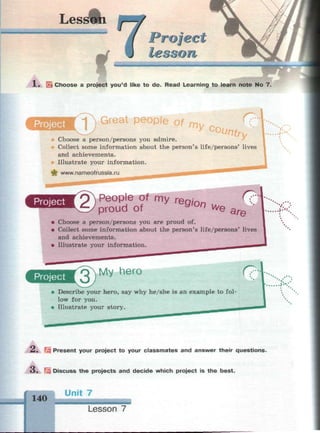
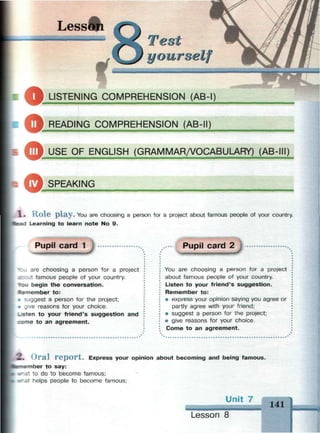
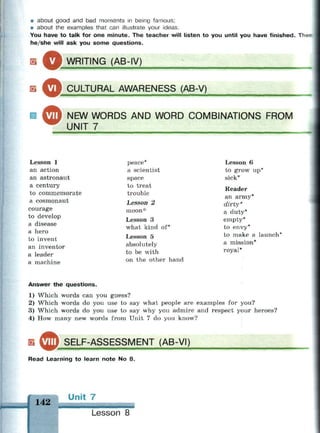
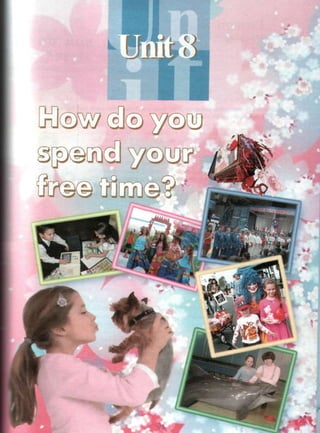
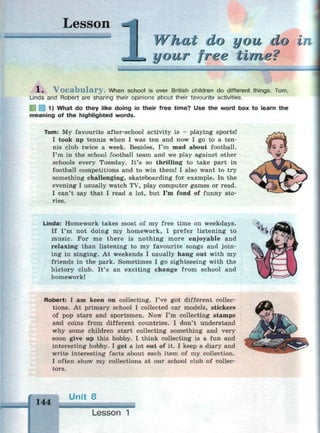
![to take up phr — приступить, занять
ся (чём-л.)
mad (about sth) — обожающий
(что-л.), помешанный (на чём-л.)
thrilling — захватывающий
challenging ['tjzelincfcin] — трудный, но
увлекательный
to be fond of — любить (кого-л.,
что-л.)
enjoyable [m'dpiabl] — приятный
relaxing [n'laeksin] — расслабляющий
to hang out (with sb) phr — постоян
но бывать где-л. (с кем-л.)
a change (from sth) — пе
ремена обстановки, раз
нообразие
to be keen on — очень лю
бить (что-л.), увлекаться
(чем-л.)
a sticker — наклейка, этикетка
a stamp — марка
to give up phr — отказаться, бросить
to get sth out of sth — получить поль
зу (опыт, знания и т. д.) от чего-л.
2) Why do the children like doing these activities?
3) Which activities do you like doing in your free time? Which activities don't
*ou like? Why?
4) What's your opinion about what Tom, Linda and Robert do in their free time?
2.
I think listening to music is relaxing.
British children write about their favourite after-school activities on the Internet.
•*^at do they prefer doing after school? Fill in the gaps with the words from the
xcx. You can use some words more than once.
I change • enjoyable • fond • free • get
hanging out • keen • mad • relaxing • stamps • take • thrilling
In my
I am
I am
.time I enjoy listening to music. It's С
of bowling. It's ZZZZZZ3.
about climbing. I can't wait to go to the climbing club. It's
sport!
I am on field trips. They are a from school.
I'd like to up collecting . It's very interesting.
I go to the Guides* twice a week. I a lot out of this experience.
I'm not going, I'm С ) with my friends.
3 . S i I n y o u r C u l t u r e . How do Russian children spend their free time?
id ex. 1)
Unit 8
145
Lesson 1](https://image.slidesharecdn.com/14858-160704171440/85/14858-7-2011-252-audio-145-320.jpg)
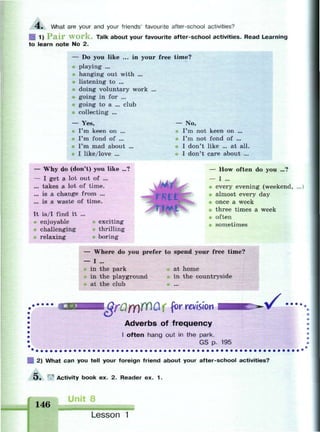
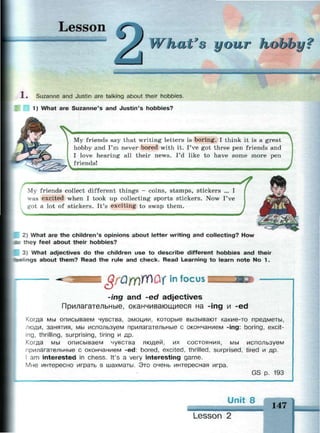
![2 . Ш
Many British schools organise different clubs
for children to do their favourite activities in the evening
or at holiday time.
What do different children say about one and the
same activity?
Why sit in front
of the television? J
.,
a*
It's boring!
Drama
Join our clubs!
Linda says that the drama club is in
teresting.
Helen says that she is interested in per
forming different roles at their school
parties.
Photography «pbtf^
anting <«t^
1 laying the guitar
Drawing &*&b.j/
Horse-riding
' Motosport ' ^ а д » / ^ / .
Climbing **vi%4^3*-
Linda: The drama club is interesting. T«*r %
Tom: I'm excited about horses.
Robert: I'm thrilled about motorsport.
Sue: I'm surprised that some people are bored with photography.
Alex: I feel relaxed when I play the guitar.
Steve: I took up climbing three months ago. And now I'm really excited about it.
Mark: It's thrilling to watch motor races and to take part in them.
Josh: Climbing is a thrilling and challenging kind of sport. I'd like to take it up.
Justin: Riding horses is very exciting and I'd like to take up a horse-riding club.
Helen: I'm interested in performing different roles at our school parties.
David: I think that playing a musical instrument is relaxing. I can play the gui
tar for hours.
Judy: I don't think that photography is a boring hobby. I find it very interesting.
3. Here are the results of the hobby survey among British children.
1) What is Dan's opinion about the results of the survey? Use -ing or -ed adjec
tives.
Most popular non-sporting hobby
Collecting 72% (per cent
Drama 66%
Drawing 60%
Most popular collections
Stamps 25%
Stickers 19%
Coins 15%
[ps'sen
Most popular musical instrument
Piano 26°/.
Guitar 25%
Violin 12%
t])
Most popular sporting hobby
Swimming 24%
Football 20%
Hockey 9%
Top hobbies you'd like to take up
Horse-riding 23%
Ice skating 15%
Fishing 14%
148
Unit 8
_...._.
Lesson 2](https://image.slidesharecdn.com/14858-160704171440/85/14858-7-2011-252-audio-148-320.jpg)
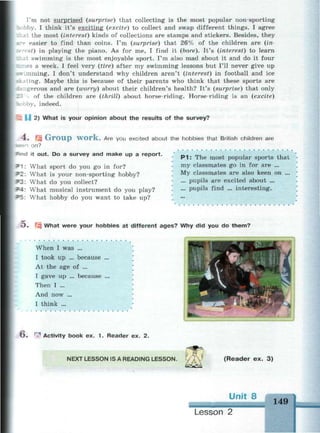
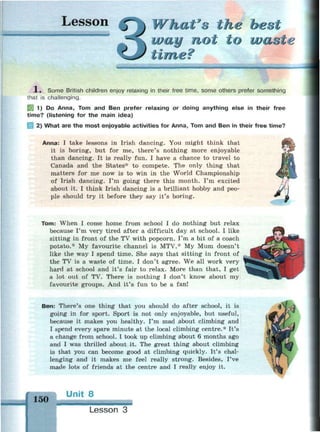
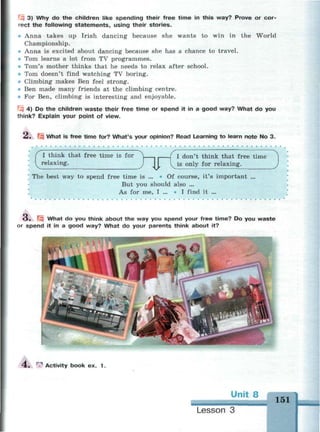
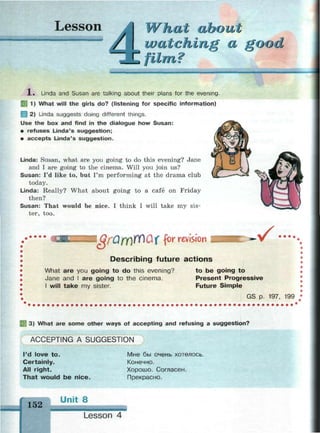
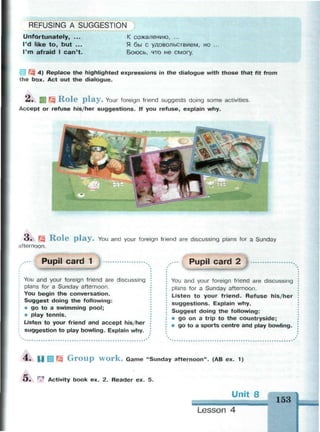
![Lesson How do teens from
different coimtrieo
spend their free ume<
1. Jigsaw reading. Most schoolchildren from different countries have free time
every day.
Do children from Great Britain, America and Australia do similar activities after
school? Read Learning to learn note No 5.
1) I n h o m e g r o u p s . Read one of the texts (A, B, or C) and do the task.
I EL A How do children in Great Britain spend their free time? Answer the ques
tions.
• What hobbies do children enjoy?
• What sports do children go in for?
• What do children do to earn money?
• What clubs/organisations are most children involved
into?
In Great Britain most children spend their free time at
home, watching TV or doing chores about the house. Or
they may listen to music or read. Many children have
hobbies. They are great collectors, they collect stamps, or
postcards, or stickers of favourite footballers or pop
stars. Young people hang out in streets and parks, visit
town centres and go window shopping.1
Many young peo
ple use some of their spare time to earn2
money by work
ing in shops at weekends, delivering newspapers, helping
in the yard or car washing for people in their communi
ty. Children are also involved in different clubs and
organisations: they go to the Scouts,* Boys' and Girls'
Brigades.* Children enjoy playing and watching different
sports: football, rugby,* cricket,* swimming, horse-rid
ing, tennis and many other games.
1
to go window shopping — рассматривать витрины
2
to earn [з:п] — зарабатывать
С! г
В How do children in the USA spend their free time? Answer the questions.
• What hobbies do children enjoy?
• What sports do children go in for?
• What do children do to earn money?
• What clubs/organisations are most children involved into?
154
Unit 8
Lesson 5](https://image.slidesharecdn.com/14858-160704171440/85/14858-7-2011-252-audio-154-320.jpg)
![Children in the USA have a lot of interests. Both boys
and girls play many of the same games. They swim,
play baseball and basketball, go boating and camping.1
Youth organisations like the Boy Scouts,* the Girl
Scouts* and the Boys' Clubs of America* involve chil
dren in different activities. After school children take
part in activities of different clubs. They join photog
raphy, music, art, stamp collecting, theatre and other
clubs. Often schools have bands, choirs and sports for
boys and girls. In farm areas children learn to work
together in 4-H* clubs. Many children have part-time
jobs after school hours. They earn2
money by delivering
newspapers or helping to take care of elderly people in
nursing homes. During the summer holidays children go
to camps where they have lots of activities and learn
different skills.
1
to go camping — ходить в поход
2
to earn [з:п] — зарабатывать
I В С H ° w
do children in Australia spend their free time? Answer the questions.
* What hobbies do children enjoy?
* What sports do children go in for?
« What do children do to earn money?
* What clubs/organisations are most children involved into?
In Australia sports are an important part of many chil
dren's life, with cricket,* football (soccer) and swim
ming being the most popular. Most children take part
in after-school sports during the year. Most girls choose
netball,* and boys often choose rugby* or cricket.
Children prefer to spend a lot of time chatting online
with their friends or hanging out at the beach. After
school many children also do different chores about the
house or they may earn1
money by working at the local
supermarket or fast-food restaurant. Thousands of
Australian children join the Scouts* and Girl Guides*
clubs where they learn different skills.
to earn [з:п] — зарабатывать
Unit 8
155
Lesson 5](https://image.slidesharecdn.com/14858-160704171440/85/14858-7-2011-252-audio-155-320.jpg)
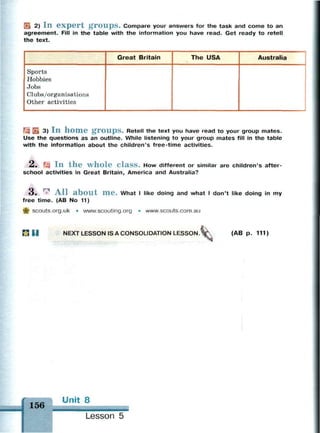
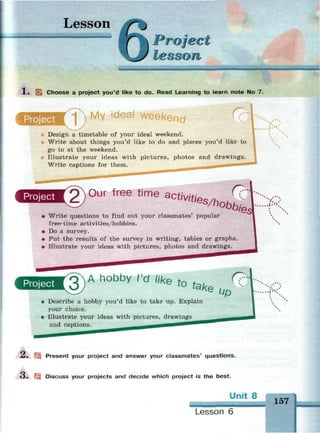
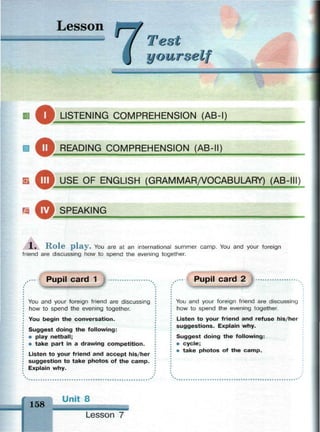
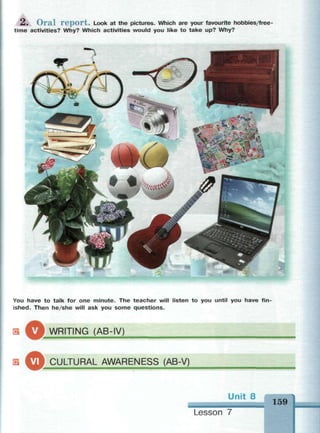
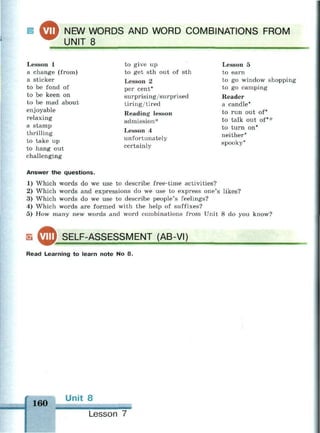
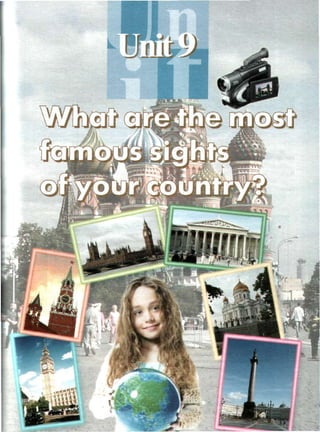
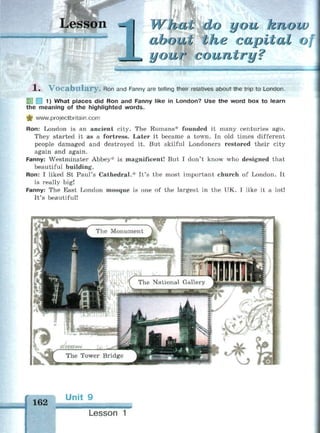
![Ron: The British Museum* and the National Gallery* house world masterpieces:
rare paintings, ancient sculptures, unique books and metal works of old mas
ters.
Fanny: I admired the Monument. Christopher Wren, a famous British architect,
designed it to commemorate the Great Fire of London.*
ancient ['einfant] — древний
to found [faund] — основывать
as [sez] — как
a fortress ['fo:tr3s] — крепость
a gallery ['gaelsn] — галерея
later ['leita] — позже
to restore [n'sto:] — восстанавливать,
реставрировать
magnificent [iraeg'nifisant] — велико
лепный, величественный
to design [di'zam] — проектировать
a building ['bildin] — здание, сооружение
^ ^ • • ^ • • • ш в н н а р а в ^ ^ н ^ ^ ^ в а н н ^ н ш ^ н н р н н н м ^ м н м н н ^ ^ Я Я ^ В к ^ Л
a cathedral [ka'Gkdral] — &Ох^
кафедральный собор
a church [tf3:t(] — церковь
a mosque [rrmsk] — мечеть
to house [haus] — вмещать(ся), поме
щаться)
a masterpiece ['ma:st9pi:s] — шедевр
rare [геэ] — редкий
a painting ['pemtin] — картина
unique [ju'nv.k] — уникальный
a master ['ma:st9] — мастер
a monument ['monjumant] — памятник
2 2) What did you learn about London? Decide if the following sentences are
true, false or unstated according to the story.
1) The Romans founded London two centuries ago.
2) The Romans began London as a fortress.
3) Later London became a town.
4) Very good masters restored the city again and again.
5) The magnificent building of Westminster Abbey houses rare paintings and
unique books.
Christopher Wren designed Westminster Abbey.
St Paul's Cathedral is a big church.
There are a lot of masterpieces in the National Gallery and in the British
Museum.
The Great Fire of London is commemorated in the Monument.
Unit 9
6)
8)
9)
163
Lesson 1](https://image.slidesharecdn.com/14858-160704171440/85/14858-7-2011-252-audio-163-320.jpg)
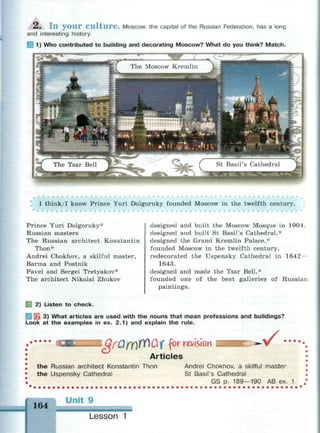
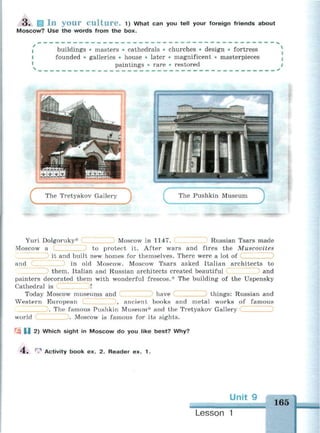
![tat do you kno
about the history
of your hometown?
1 . Tourists from many countries like to visit the Tower of London.
| 1) Why do tourists visit the Tower of London?
The Tower of London is a popular tourist attrac
tion. It was founded by William the Conqueror* in
the eleventh century and was used as a fortress and
a palace. Then it was made a prison.1
Later an
interesting museum was opened in the Tower of
London.
| 2) What did you learn about the history of the Tower of London? What structures
are used to tell about it? Read the rule and check. Read Learning to learn note No 1.
§rQYY)№(1 in focus
Past Simple Passive
Страдательный залог в прошедшем времени
1. Когда мы сообщаем, что произошло (было сделано) с предметом или чело
веком, мы используем страдательный залог в прошедшем времени, который об
разуется при помощи was/were + V3:
The Tower was founded in the 11th century. Тауэр был основан в XI веке.
Was the Tower founded in the 11th century?
When was the Tower founded?
The Tower was not (wasn't) founded in the 10th century, it was founded later.
2. Если нам необходимо сообщить, кем было совершено действие, мы исполь
зуем предлог by:
The Tower was founded by William the Conqueror. Тауэр был основан Вильгель
мом Завоевателем.
Who was the Tower founded by?
GS p. 201
1
a prison ['prizn] — тюрьма
166
Unit 9
Lesson 2](https://image.slidesharecdn.com/14858-160704171440/85/14858-7-2011-252-audio-166-320.jpg)
![2 . Ш I n y o u r C u l t u r e . Here are some facts from the history of St Petersburg.
1) Put the facts in the chronological order.
1) The Peter and Paul Cathedral* was designed by Domenico Trezzini at the
beginning of the eighteenth century.
2) The Mikhailovsky Castle was built by Vasili Bazhenov* and Vincenzo Brenna
at the beginning of the nineteenth century.
3) St Isaac's Cathedral* was decorated by famous Russian painters in the mid
dle of the nineteenth century.
4) The magnificent Kazan Cathedral was built in 1811.
5) St Petersburg was founded by Peter the Great* on May 27, 1703.
6) The Victory Monument was created in 1975.
7) The Dutch Church was housed in the beautiful building in Nevsky Prospect
in 1831 — 1837.
• • •
I ОгйюГПОХ for revision v •••••
Dates
We write: on May 27, 1703.
We read: on the twenty-seventh of May, nineteen о [эи] three.
or May the twenty-seventh, nineteen о three
GS p. 194
1 2) P a i r w o r k . Ask your teacher for additional information about the sights
of St Petersburg.
® Was the Victory Monument built in 1975?
• Who was the Kazan Cathedral designed by?
• When was the Peter and Paul Fortress started?
• M
Lesson 2](https://image.slidesharecdn.com/14858-160704171440/85/14858-7-2011-252-audio-167-320.jpg)
![3 3) What would you tell tourists about the sights of St Petersburg?
The Winter Palace was built and designed by Bartolomeo Rastrelli.
The Winter Palace was built in 1754—1762.
1) Bartolomeo Rastrelli built and designed the Winter Palace.
2) They founded the Hermitage museum* in 1764.
3) Designers decorated the Summer Gardens* with wonderful sculptures in the
18th century.
4) Well-known architects designed and decorated the famous St Petersburg
bridges.*
5) Bartolomeo Rastrelli designed the Catherine Palace for Tsarina Elisabeth.*
6) They restored and redecorated the Peterhof* palaces after the Great Patriotic
War.
O . Belgorod, the capital of the Belgorod Region, is another Russian city with a long
and interesting history.
What is Veronika telling her foreign friends about Belgorod? Use the verbs in the
Present Simple and Past Simple Passive or Active.
I live in Belgorod and I like my city very much.
Belgorod (mean) "white city" because the region is rich
in1
limestone.2
My city is very old, it (start) in the thir
teenth century. I know that Belgorod (destroy) by
Mongols and in 1596 the town (found) again as a
fortress to protect the borders3
of Russia.
Today Belgorod is a modern and beautiful city.
Belgorod is famous for its cathedrals, they (build) in
the eighteenth and nineteenth centuries. The
Preobrazhensky Cathedral is my favourite, it (design) by
the architect Evgeny Vasiliev. I like Selivanov's House, it
(build) in 1792. Now it (house) the Literature Museum.
There are funny metal sculptures in the streets. Ordinary people (commemo
rate) in them. The sculptures (create) by masters from Belgorod and Kharkov.
I think that people who (visit) Belgorod 10 or 15 years ago will like it how the
city looks like today.
The Burning Bulge Diorama
4 . S A l l a b o u t m e . Facts about my hometown. (AB No 12)
О. гл
Activity book ex. 1 , 2 . Reader ex. 2 .
1
rich — богатый; to be rich in — ?
2
limestone paimstsun] — известняк
8
border ['boida] — граница
168
Unit 9
• * •
Lesson 2](https://image.slidesharecdn.com/14858-160704171440/85/14858-7-2011-252-audio-168-320.jpg)
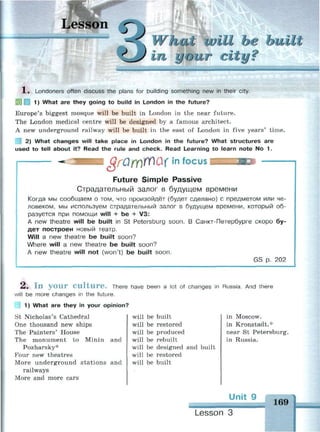
![fzi 2) P a i r W O r k . Compare your suppositions with your partner.
• Will St Nicholas's Cathedral be rebuilt?
« Where will four new theatres be built?
Щ 3) Ask your teacher to check your suppositions.
3. Dinara lives in Kazan.
j 1) What is Dinara saying about her hometown? Use the verbs in the Present,
Past, Future Simple Passive or Active.
My city is very old, it (found) in 1005. Kazan
(destroy) by wars and fires. After one of the fires
the icon1
Our Lady of Kazan (discover). Today it is
a famous icon and it (respect) by many Christians.
During the Great Patriotic War Kazan (become)
an important city where planes and tanks (produce).
Today Kazan is the capital of Tatarstan. In 2005
we (celebrate) its birthday, one millennium. The
Kazan Kremlin was the centre of the celebration. The
Kremlin (include) Muslim and Christian monuments.
The Qol Sharif mosque (rebuild) in 1996, it's one of
the largest mosques in Russia. The magnificent
Blagoveshchensky Cathedral (build) in the middle of
the sixteenth century.
I am sure that my city will be better and more beautiful. In a few years' time,
new underground railways and new roads2
(build). New wonderful buildings
(design) in the future. I hope that our people (create) new theatres, museums,
unique medical centres and big libraries.
Щ 2) What can you say about your hometown?
The Qol Sharif mosque
4 . " What does Oiga want to be done in her hometown? (AB ex. 1)
5 . Г
Л A l l a b o u t m e . My hometown's plans. (AB No 13)
1
an icon ['aikan] — икона
2
a road [raud] — дорога
170
Unit 9
ьйч»;5йвч«««;
Lesson 3](https://image.slidesharecdn.com/14858-160704171440/85/14858-7-2011-252-audio-170-320.jpg)
![Lesson V !/!/ I/ 9££/J
/У>4У
/ y - f
of ike
1 . The Official New 7 Wonders' of the World* were chosen on the Internet in 2007.
| 1) Listen to Fred and Lisa and say which sights they chose, (listening for the
main idea)
1
a wonder ['wAnds] — чудо
Unit
171
Lesson 4](https://image.slidesharecdn.com/14858-160704171440/85/14858-7-2011-252-audio-171-320.jpg)
![Щ 2) Do Lisa, Fred and Misha agree with the Internet choice?
Fred: For me it is hard to decide what sight to choose. I think I'd like to choose
Christ the Redeemer because it is magnificent. It is a wonderful and sym
bolic sculpture. It is really interesting and I'd like to see it with my own
eyes. I also think that the Great Wall of China is really great! It is so1
large
that it can be seen from space. And it was built centuries ago! My choice is
two wonders out of the seven ones.
Lisa: All the sights are beautiful but most of them were created centuries ago!
The new "wonders of the world" include no modern buildings or towns! But
we can't do without them. Yes, the Taj Mahal is really beautiful! But I
admire the Sydney Opera House* building in Australia. I think we must
include it in the list2
of the New Wonders.
Misha: I like the idea of the New Seven Wonders of the World. It is a bridge
between the past and the future, between cultures and religions. But I am
upset that the Kremlin and Red Square3
are not included in the list of the
New Wonders. I am sure they deserve it! The Kremlin and Red Square are
symbols of Russia, one of the biggest countries in the world.
1 Щ 3) Which of these ideas could belong to Lisa, Fred or Misha?
1) Modern buildings must be included in the list of the New Wonders.
2) The Internet choice is the right choice.
3) It is difficult to decide what sights can be included in the New Seven Wonders.
4) The idea of the New Seven Wonders is very good.
5) Different cultures become closer5
in the New Wonders of the World.
6) It's good when people from different cultures make an important choice together.
Щ 4) Which opinion do you share? Why?
£. Maybe one day you will take part in the New Wonders of the World competition.
1 Щ 1) What constructions6
would you like to choose as new wonders of the world?
Why? Read Learning to learn note No 3.
For me it's hard to decide/choose ... • My choice is ...
I am sure that ... • But I am not sure that ...
We can't do without ... • I think it's quite right to ...
2) What constructions can be chosen as "wonders of your hometown"?
O . r
^ Activity book ex. 1 . Reader ex. 3.
1
so — так, настолько 4
to deserve [di'z3:v] — заслуживать, быть достойным
2
a list — список 5
closer ['kbusa] — ближе
8
a square [skwea] — площадь 6
a construction [ksn'strAkfn] — строение, здание
172
Lesson 4](https://image.slidesharecdn.com/14858-160704171440/85/14858-7-2011-252-audio-172-320.jpg)
![Lesson
you go to the
i&iumoi
1 . Many foreign tourists visit the Russian Museum in St Petersburg.
Щ 1) Which picture are the guide and the tourist talking about? (listening for the
main idea)
2) The British tourist is interested in the painting but he doesn't understand all.
Use the word box and find in the dialogue how the tourist:
• asks the guide to say something again;
• shows he is listening.
— Here is the picture of the famous Russian painter Victor Vasnetsov Vitiaz at
the Crossroads.* The painter showed the world of Russian fairy tales in his works.
— How interesting!
— Yes, I think that this vitiaz comes from those old fairy tales.
— Sorry, what does "vitiaz" mean?
— Vitiaz is the Russian word for "knight".1
— Could you repeat the name of the painter, please?
— V-I-C-T-O-R V-A-S-N-E-T-S-O-V. Victor Vasnetsov.
a knight [nait] — рыцарь
Unit 9
173
1
Lesson 5](https://image.slidesharecdn.com/14858-160704171440/85/14858-7-2011-252-audio-173-320.jpg)
![1 3) What are some other ways to ask someone to say something again and to
show you are listening?
ASKING SOMEONE
TO SAY SOMETHING AGAIN
1 am sorry, what did you say? Извини
те, что вы сказали?
Pardon? Прошу прощения?
1 beg your pardon? Я прошу прощения?
Could you repeat ..., please? He могли
бы вы повторить ..., пожалуйста?
Really?
Indeed?
1 see.
SHOWING YOU ARE
LISTENING
Вот как!
Неужели!
Я понимаю.
How interesting! Как интересно!
3 4) Replace the highlighted expressions in the dialogue with those that fit from
the word box. Act out the dialogue you've got.
2. 5 ) ] g ^ Pair work. You are listening to the guide at the Tower of London.
Respond to the guide's remarks.
— There is a legend which says that the Tower was built by the Romans, not
by William the Conqueror.*
— The White Tower is the oldest part of the Tower of London. It was built
in 1078.
— The White Tower is a symbol of London and Britain.
— The Tower of London is famous for ghost stories.
— The Tower was a prison, most famous prisoners were kings, queens,
princes and princesses.
— Lady Jane Grey* was queen for nine days in 1553. She was the saddest
person in the history of the Tower.
3 . Щ R o l e p l a y . You are talking to your foreign friend.
Read Learning to learn note No 9.
Pupil card 1
Tell your foreign friend about your
hometown.
— My hometown has a long/not very long
history. It was founded in ...
— There are wonderful sights in my home
town. They are ...
Listen to your friend and respond to
his/her remarks.
Pupil card 2 |
Tell your foreign friend about your
hometown.
— My hometown Glasgow is the largest
city in Scotland.
— Glasgow has always been famous for
building ships.
Listen to your friend and respond to
his/her remarks.
4 . ^ Activity book ex. 1 .
NEXT LESSON IS A READING LESSON. ( R e a d e r e x . 4 )
174
Unit 9
;•- -.•••• fess • а а ы а & а
Lesson 5](https://image.slidesharecdn.com/14858-160704171440/85/14858-7-2011-252-audio-174-320.jpg)
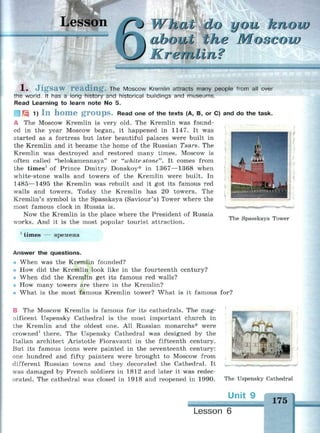
![The Blagoveshchensky Cathedral is another masterpiece of the Kremlin. It was
built by Pskov masters in 1484—1489. Many of its unique icons were painted by
the great Russian icon-painter Andrei Rublev.*
1
to crown [kraun] — короновать
Answer the questions.
• What cathedrals are there in the Kremlin?
• Who built them? When were they built?
• Who painted their icons?
• What happened to the cathedrals in different historical periods?
С There are wonderful museums in the Kremlin. The
Oruzheinaya Palata* is one of the oldest museums in the
Kremlin and in Russia. It was built by the architect Konstantin
Thon* from St Petersburg. The building was designed special
ly for the museum. It houses one of the richest collections1
of
Russian, West European and Eastern arms, silver and gold
dishes, men's and women's clothes — masterpieces of different
periods in Russian history.
One of the most interesting things that can be seen in the
Oruzheinaya Palata is the Monomakh Cap.* It was used as the
Crown2
of the Russian Tsars.
In 1806 the Oruzheinaya Palata became a public museum
and today many tourists visit the famous exhibitions every
day.
1
to collect — коллекционировать; a collection [ka'lekfn] — ?
2
a crown [kraun] — корона
Answer the questions.
• What is the most famous Kremlin museum?
• Who designed the building of the museum?
• When did it become a public museum?
• What collections are housed in this Kremlin museum?
176 U n i t 9
Lesson 6
The Oruzheinaya Palata](https://image.slidesharecdn.com/14858-160704171440/85/14858-7-2011-252-audio-176-320.jpg)
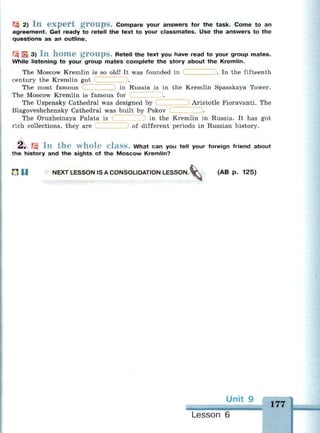
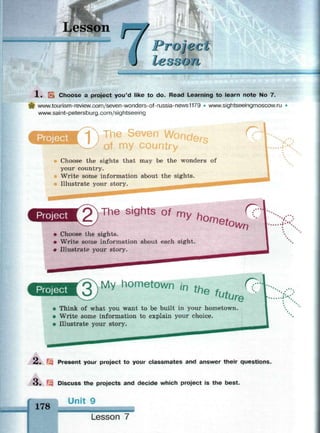
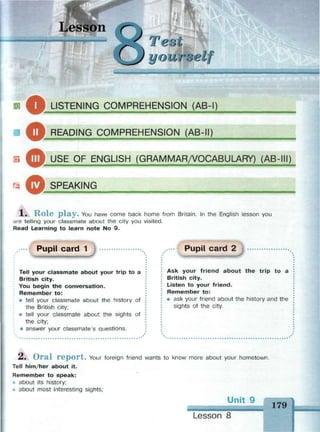
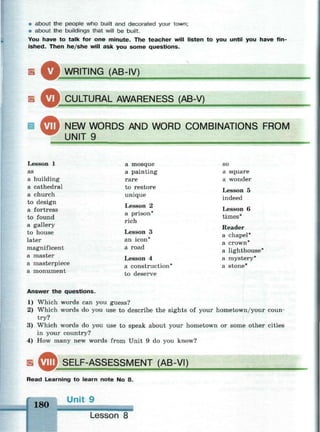
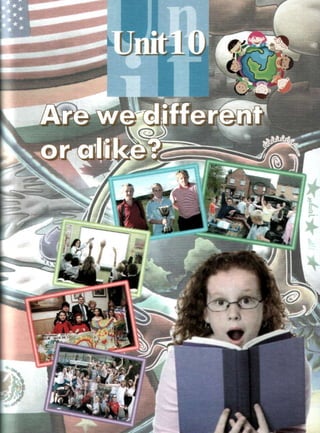
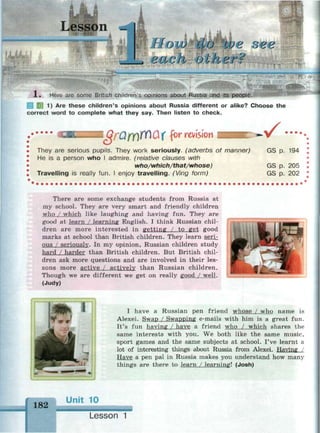
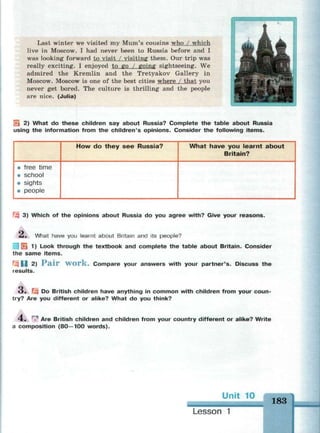
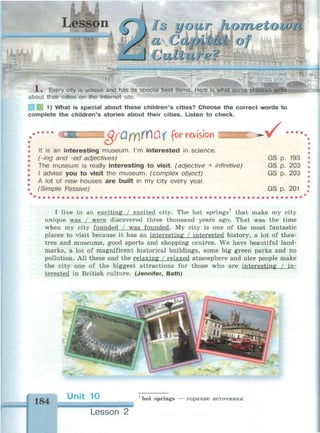
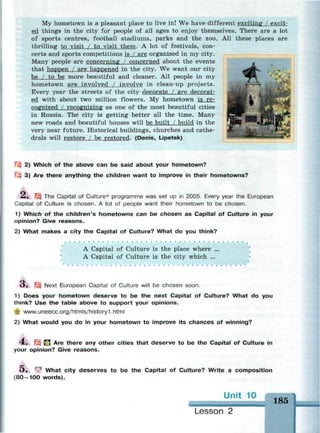
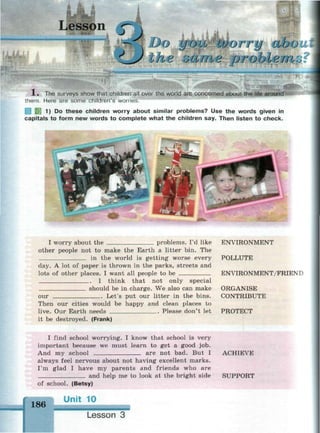
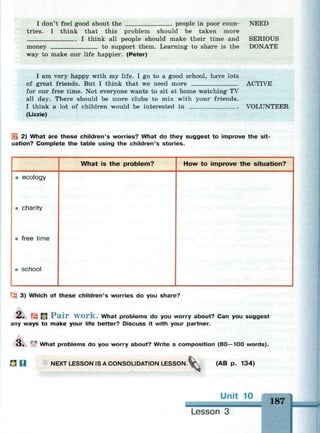
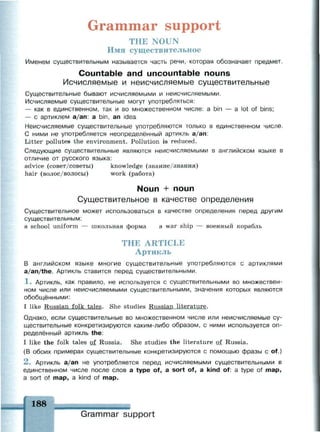
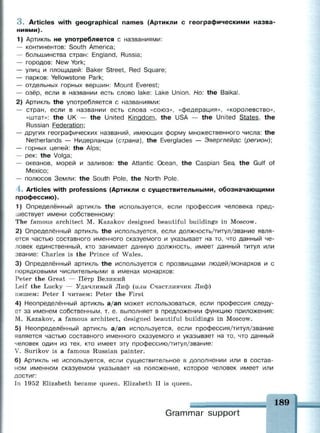
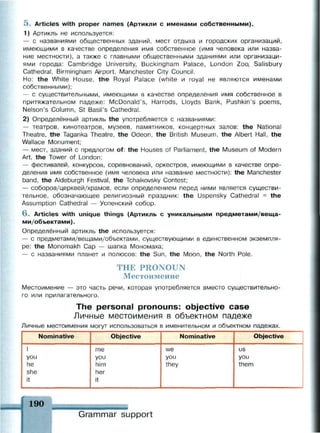
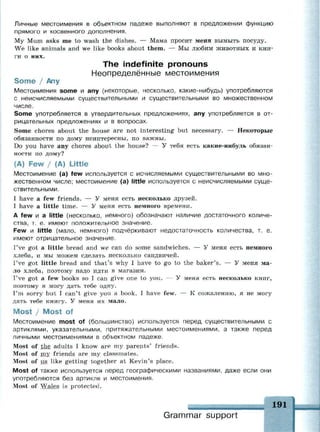
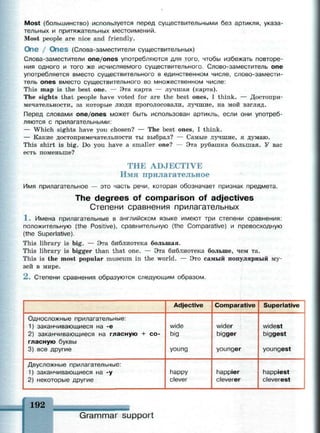
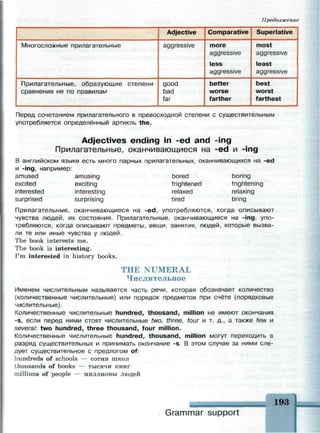
![Dates
Даты
1 . В Британии наиболее распространённый способ написания дат следующий:
27 Мау(,) 1703; 27th May(,) 1703, т. е. запятая может ставиться или не ставить
ся. Когда дата пишется в предложении, то запятая ставится обязательно:
Не was born on 23rd May, 1968.
2 . Даты читаются так:
27 Мау(,) 1703 = the twenty-seventh of May, nineteen о [зи] three или May the
twenty-seventh, nineteen о [эи] three
1900 = nineteen hundred 2009 = two thousand and nine
1380 = thirteen (hundred and) eighty the 1960s = the nineteen sixties
2000 = two thousand the 30s = the thirties
THE ADVERB
Наречие
Наречием называется часть речи, указывающая на признак действия или на раз
личные обстоятельства, при которых протекает действие. Наречие относится к
глаголу и показывает, как, где, когда и т. п. совершается действие.
Adverbs of manner
Наречия образа действия
Наречия образа действия показывают, как (каким образом) кто-то совершает то
или иное действие.
She plays beautifully. — Она прекрасно играет.
Образование наречий от прилагательных
1 . Наречия могут образовываться от прилагательных при помощи суффикса -1у.
Не is serious. He studies seriously. — Он серьёзный (ученик). Он относится к
учёбе серьёзно.
При прибавлении суффикса -1у происходят следующие изменения:
slow + -ly —*• slowly
heavy + -ly —*- heavily
terrible + -ly —*- terribly
Исключения: good — well.
2 . Некоторые наречия не отличаются по форме от соответствующих прилага
тельных.
Не is a fast runner. He runs fast. — Он быстрый бегун. Он бегает быстро.
3 . Некоторые наречия имеют две формы: одну, сходную с прилагательным, и
другую, образованную при помощи суффикса -1у. Эти две формы отличаются по
значению.
high/highly
You can jump high. — Ты можешь прыгать высоко.
The sportsmen are highly popular. — Спортсмены очень популярны.
hard/hardly
She works hard. — Она упорно работает.
She hardly knows him. — Она едва его знает.
194
_
Grammar support](https://image.slidesharecdn.com/14858-160704171440/85/14858-7-2011-252-audio-194-320.jpg)
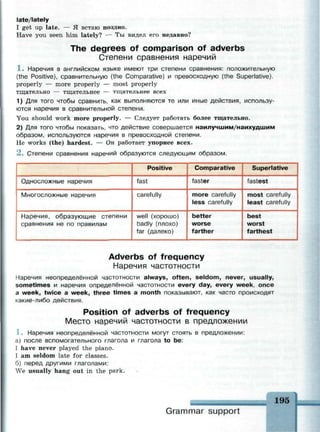
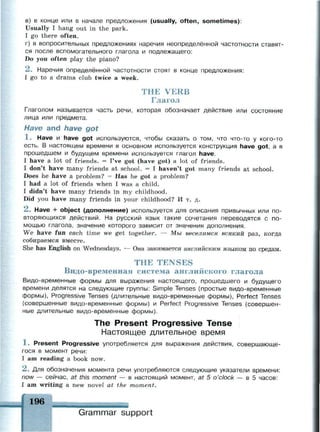
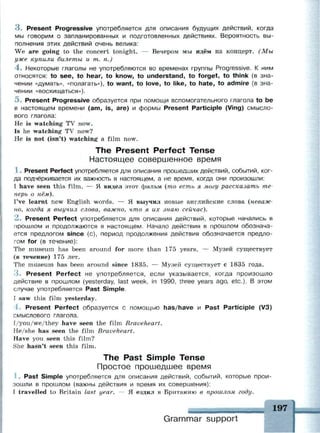
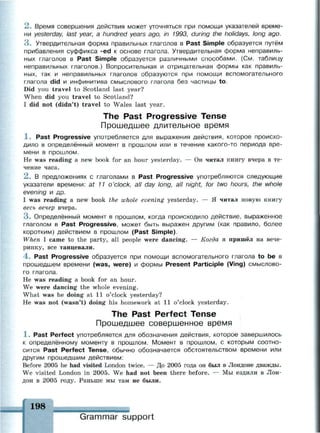
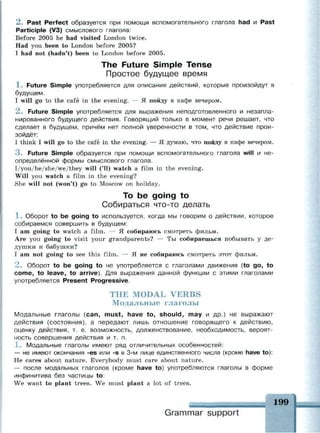
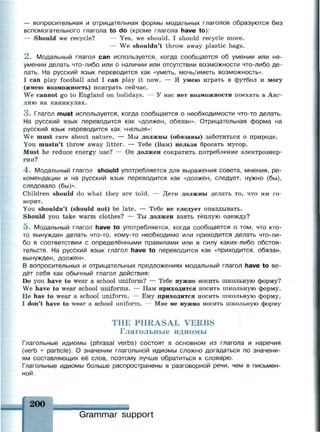
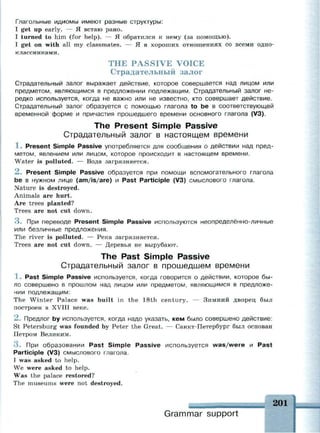
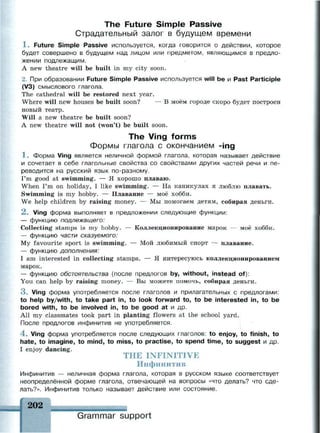
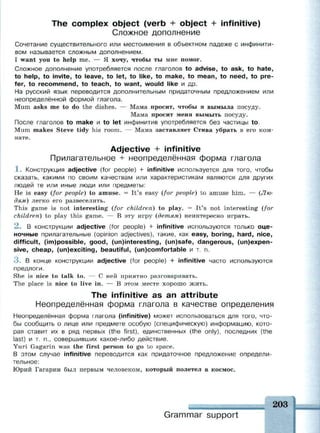
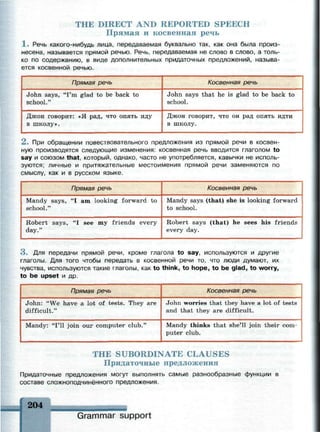
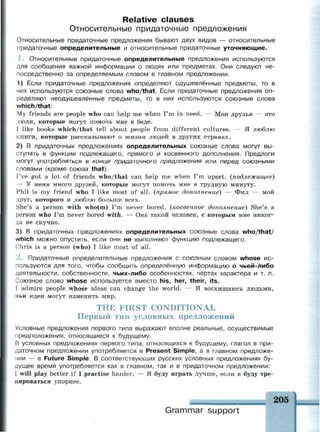
![Linguistic and cultural guide
4-H [fo:r'eitf] — a club that teaches farming to boys and girls in country areas.
The four h's stand for head, heart, hands and health. The purpose of this
club is to improve the head, heart, hands and health of each of its members.
A and В ['ei and 'bi:] 5 и 4 — schools in England and America use their own marks:
letters or percentages. (A = 90—100% — отлично; В = 80—89% — хорошо;
С = 70—79 % — удовлетворительно; D = 60—69% — плохо; F = 0—59% —
очень плохо.)
Alf [£elf] Альф — a title character of an American television serial (appeared in
1986). Alf is an alien ['eilisn] (пришелец). His name is Gordon Shumway and
his nickname is ALF (Alien Life Form). He is from the planet Melmac, which
has green sky, pink grass and a purple sun. Alf has a huge appetite (he eats
everything, but likes to eat cats), he is troublesome (причиняет беспокойство)
and sarcastic but friendly, and he helps people around him.
Alfred the Great [.aslfrsd дэ 'greit] Альфред Великий (849—899) — king of
Wessex. Alfred fought against Danes (= people from Denmark) to win back
English land. He is usually considered to be the first king of England. Alfred
was a well-educated man who encouraged (поощрял) education, improved his
army and the law (закон) system.
Alice's Adventures in Wonderland [,aelisiz 9d,ventf9z in 'wAndalasnd] (or Alice in
Wonderland) «Приключения Алисы в Стране чудес» — a children's book
written by Lewis Carroll* in 1865. It tells the story of the dream adventure
of a young girl, Alice. She meets many strange creatures, including animals
that speak and characters from playing cards. She also changes size several
times as a result of eating or drinking something.
Armstrong, Neil ['a:mstron, 'ni:l] Нил Армстронг (1930—) — an American astro
naut. As commander (командир) of the Apollo 11 («Аполлон-ll») spaceship
in 1969 he was the first person to step (ступил) onto the Moon.
Art [at] школьный предмет «Изобразительное искусство» — the subject that
gives some skills in painting, drawing and sculpture.
assembly [s'sembli] собрание — all schools must organise a short daily meeting
for the whole school to give important information and provide some form of
religious worship (богослужение).
Babayevskaya joint-stock company, the [bA'bAJevskaja ,cfpmtstDk 'клтрэш] Кондите
рский концерн «Бабаевский» — one of the best companies that has been pro
ducing chocolate and sweets in Russia since 1804. The company has a long
and wonderful history which is closely connected with the Abrikosoff and Sons
company. In 1922 it got the name "Babayevsky". Now a great choice of choco
late bars and sweets includes 3,000 brand names.
bank holiday [,Ьазпк 'hntadei] официальный выходной день — an official public
holiday when all banks and post offices are closed, as well as most factories,
offices and shops.
Bazhenov [Ьэ'зепэг], Vasily Василий Иванович Баженов (1737 or 1738—1799) —
a famous Russian architect who worked mostly in Moscow. His most famous
building is Pashkov's House (дом Пашкова) — now the Russian State Library.
BBC [,bi:bi:'si:] (in full the British Broadcasting Corporation [,britiJ~,bro:dka:stin
,кэ:рэ'ге1[эп]) Би-Би-Си (Британская радиовещательная корпорация) — the
largest British radio and television broadcasting company.
206
Linguistic and
cultural guide](https://image.slidesharecdn.com/14858-160704171440/85/14858-7-2011-252-audio-206-320.jpg)
![Beatles, the [bktlz] Битлз — a popular British music group who made their first
record (запись) in 1962 and became probably the most famous and successful
group ever. Their songs and their films were popular in the 1960s. The group
broke up in 1970, but they have remained famous as the most talented pop
ular musicians of their time.
Belfast Botanic Gardens [,berfa:st ЬэДгешк 'ga:dnz] Ботанический парк Белфаста —
a public park in Belfast, the capital of Northern Ireland. The park occupies
110,000 m2
of south Belfast. The Gardens were opened in 1828 as the private
Royal Belfast Botanical Gardens. In 1895 it became a public park. The
Gardens' most famous item is the glasshouse called Palm House. In the
Gardens there are a great number of rare flowers, trees and other plants. In
the Gardens concerts and music festivals are held. The gardens are popular
with office workers, students and tourists.
bobcat ['bobkcet] рысь рыжая — a wild cat in North America.
Booth, William ['bir.d/wiljam] Вильям Бут (1829—1912) — the English founder
of the Salvation Army.* He was a preacher (священник) and started the move
ment to bring Christianity (христианство) to poor people while giving them
food, clothes, etc.
Boys and Girls Clubs of America [,bmz эп дз:1г ,kLbz sv э'тепкэ] клубы для маль
чиков и девочек — federation of more than 1000 organisations set up (1906)
in Boston. Most clubs consist of a neighbourhood building dedicated (предна
значенный) to children and young people and staffed (укомплектованный) by
professionals and volunteers. The centres are open after school and at week
ends to provide a safe place for free time activities such as sports and com
puter classes.
Boys' Brigade, the ['boiz bn,geid] «Бригада мальчиков» — an organisation which
was set up in Britain in 1883 for boys to develop team spirit (дух) and respon
sible behaviour.
Braveheart ['breivhat] «Храброе сердце» — a popular movie made by the famous
Australian actor Mel Gibson who played the main role of William Wallace.*
British Library, the (BL, the) [,bntif 'laibrsn] Британская библиотека — the
largest public library in Britain. The library has more than 10 million books
which occupy 320 km of shelf space. It has a copy of every book published in
the country. It has more than 6,000 different editions of Shakespeare's plays.
It can take up to two days to find a necessary book.
British Museum, the [,bntij" mju'zKsm] Британский музей — the national museum
of Britain, founded in 1753. It has one the world's best collections of art and
archeological treasures (сокровища).
Cadbury ['kcedban] «Кэдбери» — a British company which makes chocolate. The
company was created by George and Richard Cadbury. Cadbury is especially
famous for its Dairy Milk Chocolate. There exists a Cadbury World exhibition
which tells about the history of chocolate making and the role played by
Cadbury in this amazing story. This "factory in the garden" appeared in 1890.
Carroll Lewis ['казгэ1, 'km] (nickname of Charles Dodgson) Льюис Кэрролл
(1832—1898) — an English writer and lecturer in mathematics at Oxford
University, famous as the author of the classic children's stories Alice's
Adventures in Wonderland and Through the Looking-Glass. He also wrote non
sense (funny) poems.
Linguistic and
cultural guide
207](https://image.slidesharecdn.com/14858-160704171440/85/14858-7-2011-252-audio-207-320.jpg)
![Cathedral of Christ the Saviour, the [кэ,0Ыгэ1 sv ,kraist дэ 'seivjs] храм Христа
Спасителя — a cathedral in Moscow. The original (подлинное, первоначаль
ное) building of the cathedral was started in 1839 and finished in 1883. It
was designed by Konstantin Thon* and devoted (посвящен) to the victory of
the Russian army over Napoleon's troops (войска) in the Patriotic War of
1812. The original building was destroyed in 1931. The new building was built
in 1995—1997.
Cheddar cheese [,tjed3 'tfi:z] сыр Чеддер — hard, pale yellow cheese, originating
in the English village of Cheddar, in Somerset, UK. Cheddar cheese has been
produced since 1170 and has been copied widely, both in the UK and in other
countries. Cheddar cheese is the most popular cheese in the UK.
Chernobyl (ЧГз:'пэиЬэ1] Чернобыль — a town in Ukraine where in 1986 an explo
sion (взрыв) at nuclear power station (атомная станция) caused deaths, ill
nesses and pollution.
Chernobyl Children Lifeline [^з:,пэиЬэ1 ,tfildr9n 'laiflam] Детская линия жизни
Чернобыля — a charity that brings children from the polluted areas to stay
with families in the UK.
Childnet Award [,tjaild'net 9'wo:d] Награда за лучший детский интернет-сайт —
each year, Childnet — a charity organisation based in London — recognizes
the most outstanding Web projects developed by and for children. Childnet
awards first-, second-, and third-place prizes in different categories: individ
uals, schools, etc. Also, there are some there special awards.
Children in Need [,tfildr3n in 'ni:d] Фонд помощи нуждающимся детям — а
British charity organisation which raises money and helps children in Britain
and all over the world.
climbing centre ['klaimm senta] центр, где можно заниматься восхождением, ла
заньем — there are a lot of indoor (находящиеся в помещении) climbing
centres in the UK. Most centres hire equipment (дают напрокат снаряжение).
community [ka'mjuiniti] община — a group of people living together. They have
the same interests, religion, nationality, etc.
couch potato ['kautf рэДепэи] лежебока, телеман — a lazy, do-nothing television
watcher.
cricket ['knkit] крикет — a very popular summer game which is played with a
ball, a bat and wickets (ворота) by two teams of eleven players.
da Vinci, Leonardo [da 'vmtfi, ,Н:э'na:dau] Леонардо да Винчи (1452—1519) — an
Italian artist, scientist and writer. One of the greatest painters of the
Renaissance.* He was also an engineer, mathematician, musician, naturalist
and philosopher, as well as an architect and sculptor. His most famous paint
ings include the Mona Lisa and The Last Supper («Тайная вечеря»).
darts [darts] игра «метание стрелок» — a game in which darts are thrown at a
circular board.
Design and Technology [dizain and tek'nDlscfei] школьный предмет «Трудовое обу
чение» — this brings together practical subjects like cooking, woodwork,
sewing and metalwork with the new technology used in those fields.
Dickens, Charles ['drkmz, 'tjaizj Чарлз Диккенс (1812—1870) — one of the great
est English writers. He described life in Britain in the times of Queen Victoria
and showed how hard it was, especially for the poor and children. His most
famous novels are Oliver Twist, David Copperfield, A Tale of Two Cities,
A Christmas Carol and others.
Linguistic and
cultural guide](https://image.slidesharecdn.com/14858-160704171440/85/14858-7-2011-252-audio-208-320.jpg)
![Dolgoruky [,(Мдэ'гик1], Prince Yuri князь Юрий Долгорукий — the founder of
Moscow (1147) and an important person in the transition (перемещение) of
political power (власти) from Kiev to Vladimir—Suzdal.
Donskoy [don'skoi], Dmitry Дмитрий Донской (1350—1389) — the Grand (Вели
кий) Prince of Moscow since 1359 and of Vladimir since 1362. He led (воз
главил) the Russian troops (войска) in the Battle of Kulikovo in 1380 where
he defeated (нанёс поражение) the Mongol-Tartars.
Doyle, Sir Arthur Conan [,кэипэп 'doil, S3: 'а:0з] сэр Артур Конан Дойль (1859—
1930) — the British writer who created the fictional detective Sherlock
Holmes.* Arthur Conan Doyle was a doctor, but after the success of his first
Holmes story in 1887 he began writing full-time.
Duke of Edinburgh, the [,dju:k av 'edmbsra] герцог Эдинбургский (1921—) — also
called Prince Philip. The husband (муж) of the British queen, Elizabeth II.
He is involved in many public organisations, for example the one that gives
the Duke of Edinburgh's Award.
eco-school ['i:k9u,sku:l] экошкола — a school that joins the Eco-Schools pro
gramme. Eco-Schools is a global programme, that encourages pupils and teach
ers to come up with fun, eco-friendly projects to help make their school a
more pleasant place to be and reduce its impact (влияние) on the environ
ment. A school must form an eco-committee of interested pupils and a teacher
representative (представитель). The group meets regularly to discuss and
agree on environmental projects to help achieve the programme's Bronze,
Silver and Green Flag awards.
Edinburgh Festival Fringe, the [^edmbsra festival 'ичпаз] (The Fringe) Фестиваль
искусств в Эдинбурге — the world's largest arts festival. It was established
(был учреждён) in 1947. It takes place in Scotland's capital Edinburgh dur
ing three weeks every August. The Fringe mostly attracts events (представ
ления) from the performing arts, particularly theatre and comedy. Fringe
often shows experimental works. In addition to events included in the pro
gramme, there is a street fair.
eisteddfod [ai'stedfad] айстедвод (состязание бардов) — an annual gathering in
Wales where competitions are held for poets and musicians. Eisteddfods are
important celebrations of Welsh language and culture, and date back to the
12th century.
Elizabeth [i'liZ3b30] Елизавета Петровна (1709—1761) — the Russian Empress
(императрица) in 1741 —1761. A daughter of Peter the Great.* During her
reign (царствования) the University of Moscow was founded in 1755. No one
person was executed (казнён) when she ruled Russia.
Elizabeth I, Queen [ХкгэЬэб бэ 'f3:st] королева Елизавета I (1533—1603) — the
queen of England and Ireland (1558—1603). Her reign (царствование) is con
sidered one of the greatest periods of English history.
Elizabeth II, Queen [iJizabsG 5э 'seksnd] королева Елизавета II (1926—) — the
queen of Britain since 1952.
Eriksson, Leif ['erikssn/lkf] Лиф Эриксон — a Viking who is considered (счита
ется) to be the first European to land (высадиться) in Northern America. It
happened in about the year 1000.
European Capital of Culture, the [Jusra'piisn 'kaspitl av 'kAltfa] Европейская куль
турная столица — every year the European Union (EU) chooses a city which
deserves (заслуживает) to be the Centre of Culture. The first Capital of
209
шшшвшшшшшшвшшшшшшяшшшшшшшшявявшшш
Linguistic and
cultural guide](https://image.slidesharecdn.com/14858-160704171440/85/14858-7-2011-252-audio-209-320.jpg)
![Culture was Cork in the Republic of Ireland in 2005, followed by Patras in
Greece in 2006, Luxemburg in 2007 and Liverpool in 2008. The EU has
designed the Capital of Culture programme to replace the City of Culture sta
tus which began with Athens in 1985.
fancy-dress party [,famsi ,dres 'pa:ti] костюмированный вечер — a party which
people come to in unusual or amusing clothes (dressed as characters from
books, films, past or future periods of history, etc.).
field trip ['fi.ld trip] учебная экскурсия — a week away from home in a study
centre where pupils not only practice various skills in geography, biology and
history but also enjoy spending time with people of their own age, walking
and playing games.
fish and chips [,fif and 'tfips] рыба с картофелем во фритюре — a meal consist
ing of fish fried in butter and eaten with fried potato chips. Fish and chips
is the British favourite takeaway dish since the late Victorian* era. The first
fish-and-chip shop opened in London in 1860.
football ['futbo:l] футбол — a sports/ball game originated in Britain and is known
officially as "association football" and sometimes as "soccer". It has been
played since the 12th century. The Football Association Cup (FA Cup) is com
peted for in the Cup Final every year. This is the biggest day in the football
calendar. The football season lasts from August to May.
Form 3W [fo:m '6ri: 'dAblju:] ЗВ класс — the pupils of this form are in the third
year of secondary school and the first letter of their form teacher's name is W.
fresco ['fresksu] фреска — a painting on the wall and ceiling (потолке) made on
wet plaster (штукатурке), common for Russian churches.
freshman ['frefman] первокурсник (BE) — a student in the first year at college
or university.
Friends of the Earth [,frendz av di 'з:0] (FoE) «Друзья Земли» — an environmen
tal group, founded in the UK in 1971. The aim of the group is to protect the
environment. It has branches in 30 countries.
Giant's Causeway, the [^cfeaisnt 'ko:zwei] Тропа великана — an assembly of
impressive basalt (базальтовые) columns located in Northern Ireland occupy
ing an area of about 0.7 km2
. The tallest columns are about 12 metres. The
Giant's Causeway is recognized as the fourth greatest natural wonder (чудо)
in the UK and the most popular tourist attraction. According to a legend the
Irish warrior (воин) Finn McCool built the causeway to walk to Scotland to
fight his Scottish counterpart (противник) Benandonner.
Girls' Brigade, the ['g3.*lz bn,geid] бригада девочек — an organisation that spe
cializes in working with churches to provide fun and inspiring local groups
(known as companies) where girls and young women can belong, achieve and
discover Jesus. GB companies are primarily for girls and young women, aged
4 to 18, and meet in safe and friendly environments.
grammar school ['дгазтэ ,sku:l] классическая школа — a school where pupils over
the age of 11 get academic education and prepare for higher education.
Grand Canyon, the [,gr£end 'kasnjan] Большой каньон — a very large, deep gorge
(ущелье) cut by the Colorado River in the US state of Arizona. The Canyon
is about 350 km long. It was made a national park in 1919. This is one of
the deepest gorges on the land.
Grand Kremlin Palace, the [,gra?nd ,kremJin 'psehs] Большой Кремлёвский дворец —
a palace in the Moscow Kremlin that was designed and built by Konstantin
Thon* in 1836—1849.
210
м а н и м а я м м м в и а а а н а в
Linguistic and
cultural guide](https://image.slidesharecdn.com/14858-160704171440/85/14858-7-2011-252-audio-210-320.jpg)
![Great Fire of London, the [,greit ,faisr sv 'Undsn] Великий пожар в Лондоне —
a very serious fire that destroyed most of the City of London, including
St Paul's Cathedral, in 1666.
Great Smoky Mountains, the [,greit ,sm3uki 'mauntinz] Голубой хребет (часть Ап-
палачских гор) — a range of mountains (горная цепь) between the US states
of North Carolina and Tennessee.
Greenpeace ['gri:npi:s] «Гринпис» — an international environmental group, start
ed in the 1960s in Canada. Its members work actively to protect the environ
ment. It prevents companies from throwing chemicals into the sea and tries
to save whales and other sea animals.
Grey, Lady Jane ['grei, ,leidi 'cfeein] леди Джейн Грей (1537—1554) — Lady Jane
was queen for nine days but she was deposed (свергнута) and kept as a pris
oner (узница) in the Tower of London, later she was executed (казнена).
Guides, the [gaidz] гайды (BE) — the Guides Association, which teaches girls
practical skills.
half-term [,ha:ft3:m] короткие каникулы — a short holiday from school, usual
ly two or three days, in the middle of a term.
Hamlet ['haemlst] «Гамлет» — one of the most famous plays by William
Shakespeare about Hamlet, the Prince of Denmark.
Harrods ['haeredz] Хэрродз — the fashionable private department store in London,
founded by Charles Henry Harrod in 1834. It is one of the largest department
stores in the world with its 330 departments offering a wide range of prod
ucts and services. The Harrods slogan is All Things for All People, Everywhere.
Hazel Grove High School [,heizl ,дгэш 'hai sku:l] Средняя школа в Ореховой ро
ще — English schools have names not numbers. They are taken from the name
of the town, district, village or street in which the school is situated (распо
ложена). Some schools are named after a well-known person.
Help the Aged [,help di 'eufeid] Фонд помощи престарелым людям — a British
charity organisation which collects money and helps old people.
Hermitage, the ['h3:mitKfc] Эрмитаж — (from the French word ermitage — мес
то уединения) a museum in St Petersburg. It is the largest art museum in
Russia and the second largest art museum in the world after the Louvre
(Лувр) in Paris. It was founded as a private collection of Empress (императ
рицы) Catherine II in 1764 and was opened to the public in 1852.
Highlands ['hailsndz] высокогорные районы Шотландии — the mountainous part
of Scotland famous for its mountains, lochs (lakes), and many islands. The
Highlands are regarded as typically "Scottish".
ICT (Information and Communication Technology) [,ai si: 'ti:] школьный предмет
«Информатика» — the science or practice of collecting, storing (хранение),
using and sending out information by means (с помощью) of computer sys
tems. It is taught as a subject at many British schools.
jack-of-all-trades [,c&aek av 'y treidz] мастер на все руки — a person who can do
many different kinds of work. But who may not be very good at any of them.
(Jack of all trades and master of none. — За всё берётся и ничего не удаётся.)
Kapitsa [kA'pitss], Petr Пётр Леонидович Капица (1894—1984) — an outstand
ing (выдающийся) Russian physicist and Nobel Prize winner (1978) who made
important discoveries in different areas.
Kronstadt [kron'Jta:t] Кронштадт — a town and a port on Kotlin Island near the
head of the Gulf of Finland (Финского залива), 20 miles west of
Linguistic and
cultural guide](https://image.slidesharecdn.com/14858-160704171440/85/14858-7-2011-252-audio-211-320.jpg)
![St Petersburg. The town of Kronstadt was founded by Peter the Great in 1703
as a fortress that could protect St Petersburg from the sea.
Lake District, the ['leik ,distnkt] Озёрный край — an area of lakes and moun
tains in the northwest of England.
life sciences ['laif ,sai3nsiz] естественные науки — a group of subjects studied at
university, and concerned with plants, animals and the human race.
locker [Чокэ] запирающийся шкафчик — in most British schools each pupil has
two lockers: a gym locker and a hall locker. The lockers are important and
will guarantee the safety of the pupils' things.
Madame Tussaud's (Museum) [,maed3m tu'so:dz] Музей (восковых фигур) мадам
Тюссо — the famous waxworks museum in London, opened by Marie Tussaud
(1760—1850). The museum contains wax figures of famous and infamous
characters in both history and modern life. There are several halls at Madam
Tussaud's which more than 2,500,000 tourists visit every year. It costs about
40,000 dollars to make a wax figure at Madam Tussaud's.
Millennium Stadium, the [mijemam 'steidiam] Стадион Тысячелетия — the
national stadium of Wales, located in Cardiff. Since its opening in June 1999
the Millennium Stadium has welcomed over 1.3 million visitors a year. The
Stadium is the home of the Wales national rugby union team and the Wales
national football team. It also hosts many music concerts and performances.
Minin, Kuzma ['mmm, kuz'ma] Кузьма Минин (? —1616) — see Pozharsky,
Dmitry,
monarch ['топэк] монарх — a ruler (правитель) of a state, such as a king,
queen, etc. who has a right to rule by birth (по рождению) and does not have
to be elected (не нужно было избирать).
Monomakh Cap, the ['топота:h ,kaep] шапка Мономаха — one of the symbols of
the Russian monarchy, it was the crown of Moscow Grand Princes and Tsars
from Dmitry Donskoy* to Peter the Great.* The oldest crowns can be seen in
the Oruzheinaya Palata in the Moscow Kremlin.
Moscow Underground, the [,mosk3u 'Andsgraund] Московская подземная желез
ная дорога (метро) — the busiest underground system in the world. The first
Metro line went into service on May 15, 1935 between Sokolniki and Gorki
Park. It ran 11.6 kilometres. During the Second World War some of the Metro
stations were used as air-raid shelters (убежище). Each day the Moscow
Underground carries 9 million passengers. The longest line takes 58 minutes
and 30 seconds to travel 38 km.
Mrs Langridge [,misiz Чагпдпф] миссис Лэнгридж — pupils should address teach
ers by title (Mrs, Mr, or Miss) and surname, for example Mrs Langridge,
Mr Kernel.
MTV [,em ti: 'vi:] музыкальный канал на телевидении — music television, an
American television company whose programmes are shown around the world.
It shows popular music and pictures of singers and groups performing
24 hours a day.
National Gallery of Scotland, the [,пае|пэ1 ,дэе1эп sv 'skotbnd] Национальная га
лерея Шотландии — the gallery located in Edinburgh, the capital of
Scotland. The building designed by William Henry Playfair, was first opened
to the public in 1859. The Gallery includes collections of Scottish and
European art and the library. The Gallery also includes a lecture theatre, edu-
Linguistic and
cultural guide](https://image.slidesharecdn.com/14858-160704171440/85/14858-7-2011-252-audio-212-320.jpg)
![cation area, shop, restaurant and an interactive, touch-screen Gallery.
National Gallery, the [,пае|пэ1 'gaelsri] Национальная галерея — an art gallery
in London, which contains the largest permanent (постоянная) collection of
western paintings in Britain, most of which were painted between 1200 and
1900. It was founded in 1824.
Neill [nil], A. S. Александр Нилл (1883—1973) — a British teacher who start
ed a new school called Summerhill, where children can choose to study what
they like, and are not told what to do by their teachers.
Nelson, Horatio ['nelssn, hs'reifisu] Горацио Нельсон (1758—1805) — an English
admiral who lost his right arm, and the sight (зрение) in his right eye, dur
ing the wars against France in the 1790s. He became a national hero after
winning several victories at sea, the most famous was the battle at Trafalgar*
in 1805.
netball ['netbo:l] нетбол — a game which is similar to basketball, played in
Britain, especially by girls.
Newton, Isaac ['njir.tn, 'aizsk] Исаак Ньютон (1642—1727) — a British physicist
and mathematician who is best known for discovering gravity (гравитации).
He made many other important scientific discoveries.
Nobel Prize, the [пэи,Ье1 'praiz] Нобелевская премия — one of the prizes given
in Sweden (в Швеции) each year to people for important work in physics,
chemistry, medicine, economics, literature and peace.
Official New 7 Wonders of the World, the [s'fijl ,njir. ,sevn 'wAndsz sv дз 'w3:ld]
Новые семь чудес света — a modern list of the 7 Wonders of the World that
includes: Chichen Itza (Чичен-Ица), a large pre-Columbian (доколумбовый)
archeological site in Mexico; Christ the Redeemer (статуя Христа Спасите
ля), a statue of Jesus Christ in Rio de Janeiro, Brazil; the Colosseum or
Roman Coliseum (Колизей), an amphitheatre in Rome, Italy; the Great Wall
of China (Великая китайская стена); Machu Picchu (Мачу-Пикчу), a pre-
Columbian archeological site in Peru; Petra (Петра), an archeological site in
Jordan; the Taj Mahal (Тадж-Махал), a mausoleum in Agra, India.
Olympic Games, the [3,hmpik 'geimz] (also Olympics [s'limpiks]) Олимпийские
игры — a modern international sports event in which people from different
countries compete in different sport.
Order of the British Empire (OBE) [,эх!эгэудэ ^ntif'empais] Орден Британской
Империи — an honour given to someone as a title, to thank them or show
respect for the work they have done in various fields, including sport, enter
tainment, politics, business, etc. The medal marking the title is given by the
Queen in a special ceremony.
Oruzheinaya Palata, the [,ш"и'зетл)л рэ'кгЛэ] (also the Armoury ['а:тэп]) Оружей
ная палата — a museum in the Moscow Kremlin, one of the oldest museums
of Russia, its collections were started in the late 14th — early 15th centuries.
Ostankino Television Tower, the [DS,ta:nkirm ,tehvi3n Чаиэ] Останкинская телебаш
ня — one of the tallest television and radio towers in the world. It is 549
meters tall. Ostankino was designed by Nikolai Nikitin and built in 1967. It
is named after the Ostankino district of Moscow in which it is located.
Owain Glyndwr [,owam glm'dur] Оуайн Глендур (с. 1354 or 1359 — с. 1416) —
a Welsh ruler (правитель) and the last native Welsh person to have the title
of the Prince of Wales. In 1400 he instigated (спровоцировал) the revolt (вос
стание) against the rule of Henry IV of England. The revolt was unsuccess
ful. His final years are a mystery.
i i4ini..ui.iMi HI nil ж in.ia
Linguistic and
cultural guide](https://image.slidesharecdn.com/14858-160704171440/85/14858-7-2011-252-audio-213-320.jpg)
![РЕ (physical education) [,pi: 'i:] школьный предмет «Физкультура» — sport and
physical activity taught as a school subject.
Periodic Table, the [,pin'Ddik 'teibl] периодическая система элементов Менделе
ева — a system of chemical elements made by the famous Russian chemist
D. I. Mendeleev on the base of the periodic law (закона) discovered by him in
1869.
Peter and Paul Fortress, the [,pi:t9r and ,po:l 'fo:tns] Петропавловская крепость —
a fortress in St Petersburg that was founded on May 16, 1703 by Peter the
Great. This day is also celebrated as the birthday of St Petersburg itself.
Peter the Great [,pi:t9 бэ 'greit] (also Peter I (the First) [,pi:ta дэ 'f3:st]) Пётр Ве
ликий (также Пётр I) (1672—1725) — the Russian Tsar since 1682, the first
Russian Emperor (император) since 1721.
Peterhof ['piitshnf] Петергоф — one of St Petersburg's environs (окрестности), а
residence of the Russian monarchs* started in the 18th century, famous for
the Grand Palace by the architect Bartolomeo Rastrelli, its parks and foun
tains (фонтаны).
pillar box ['pita bolts] (also the Royal Mail red pillar box) почтовая тумба — one
of the most familiar items of British street furniture introduced in 1853. It
was invented by the English writer Anthony Trollope, who worked for the
postal service for over 30 years. Pillar boxes always have the monogram of
the reigning monarch (монограмма правящего монарха). Pillar boxes have
different designs, but the cylindrical pillar boxes are the ones that are recog
nized all over the world.
Pozharsky [p9'3a:rski], Dmitry Дмитрий Михайлович Пожарский (1578—1642) —
a Russian military (военный) leader, a prince. In 1613 D. Pozharsky and
Kuzma Minin (? —1616) organised the Russian resistance (сопротивление)
against the Polish invaders (захватчиков).
Prince of Wales, the [,pnns av 'weilz] принц Уэльский — the official title of the
heir (наследника) to the British throne, the title has been given to the heir
since the 13th century. Now the elder son of Queen Elizabeth II, Charles, has
the title.
Pushkin Museum of Fine Arts, the [,pufkm mju:'zi:9m] Музей изобразительных
искусств им. А. С. Пушкина — the largest museum of art in Moscow which
has one of the largest art collections in the world. It was founded by Ivan
Tsvetayev and Yuri Nechaev-Maltsev and opened in 1912.
rainforest ['rein^fonst] тропический лес — a tropical forest with tall trees grow
ing thickly together. The word is usually used to talk about the rainforest of
South America with different animals and plants.
registration Lrec&i'streijn] регистрация присутствующих учеников — in schools,
the form teacher marks the register every morning before lessons, and often
before afternoon lessons too. The register is a book with a list of the pupils'
full names, addresses and dates of birth.
Religious Education [n,lKfe9s ^dju'keijh] школьный предмет «Религиозное обра
зование» — the study of religion at school. In Britain all children receive
some religious education at school.
Renaissance (sing) [n'neissns] Ренессанс (эпоха Возрождения) — (period of the)
revival (возрождение) of art and literature in Europe in the 14th, 15th, and
16th centuries, based on classical forms. The Italian city of Florence is usu
ally considered to be the place where the Renaissance started.
214
Linguistic and
cultural guide](https://image.slidesharecdn.com/14858-160704171440/85/14858-7-2011-252-audio-214-320.jpg)
![report card [n'pat kcud] табель успеваемости — at the end of each term school
sends a report to parents. It has the pupil's marks in all the subjects and the
teacher's comments on the pupil's progress.
Robin Hood [, robin 'hud] Робин Гуд — a legendary English outlaw (разбойник)
who stole (воровал) from the rich to give to the poor. He and his band of
men lived in Sherwood Forest near Nottingham. His group of companions
included Little John, Friar Tuck, and Robin's girl Maid Marion. His main
enemy (враг) was the Sheriff of Nottingham, who was always trying to catch
and punish him. Robin Hood is usually shown holding a bow and arrow (лук
и стрела).
Romans, the ['гэитэпг] римляне — members of the ancient Roman Empire (им
перия).
Roshal [гэ'/сгЛ], Leonid Леонид Михайлович Рошаль (1933—) — a famous chil
dren's surgeon, a professor, the head of the Moscow Institute of Emergency
Children's Surgery and Traumatology (Московского НИИ неотложной дет
ской хирургии и травматологии), which treats 60,000 children a year.
Rostral Columns, the [, rostral 'kobmz] Ростральные колонны — the two Rostral
columns are part of the Strelka ensemble on Vasilyevsky Island. The two brick
Columns, painted brown, are 30 metres high and they are situated in front
of the Exchange (здание Биржи) on the Strelka. The columns were designed
by Thomas de Thomon. They remind us of the ancient tradition of celebrat
ing naval victories by creating triumphal columns. The five-metre tall figures
at the foot represent four Russian rivers — the Volga, the Dnieper,
the Volkhov and the Neva.
Routemaster ['ru:tma:st3] Рутмастер («Хозяин дорог») — тип двухэтажного ав
тобуса — а type of double-decker buses (with two passenger decks (floors).
Routemaster buses first appeared in the 1950s. In their original form there
were no doors and there was a conductor. The last Routemaster bus was built
in 1968. Because of different reasons, in 2005 the last Routemaster buses
were taken out of service. Some double-deckers have been transformed into
bars, homes, mobile discos and restaurants. There are only few Routemasters
that link most famous landmarks of London.
Royal Botanic Garden Edinburgh, the (RBGE) [,киэ1 bd,taenik 'ga:dn 'edmbsrs]
Королевский ботанический сад Эдинбурга — both а scientific institution
and a tourist attraction located not far from the city centre. It was founded
in 1670 to grow medicinal plants. Today, it occupies four gardens each with
its own collection. The Royal Botanic Garden Edinburgh is the main garden
with its thousands of rare trees, flowers and other plants of botanical inter
est. It is the second oldest botanic garden in Britain.
Royal National Eisteddfod* of Wales, the [,гою1 ,пае/пэ1 ai'stedfad av ,weilz] Вал
лийский Королевский национальный фестиваль — the annual festival of
music, singing, prose and poetry contests, all in Welsh. The winner of the
poetry competition is ceremoniously crowned as the "bard" (a poet).
RSPB, the [,a:r es pi: 'bi:] (the Royal Society for the Protection of Birds) Коро
левское общество защиты птиц — a voluntary organisation (charity) in
Britain founded in 1889 with the aim of protecting wild birds. The society
has over 200,000 members.
RSPCA, the [,a:r es pi: si: 'ei] (the Royal Society for the Prevention of Cruelty to
Animals) Королевское общество защиты животных — a British charity
т . 215
Linguistic and
cultural guide](https://image.slidesharecdn.com/14858-160704171440/85/14858-7-2011-252-audio-215-320.jpg)
![organisation which protects animals. The society was founded in 1824 to stop
cruel treatment of animals. It campaigned throughout the 19th century for
government action and this resulted in the Protection of Animals Act, 1911.
RSPCA inspectors have the right to enter people's houses if they think there
is cruelty or if somebody has made a report to them. The charity depends
mainly on donations and has an income of 21 million pounds a year.
Rublev [ru:b'l3:v], Andrei Андрей Рублёв (about 1360—70 — about 1430) —
a famous Russian icon painter. He decorated many cathedrals and churches,
for example, the Blagoveshchensky Cathedral in the Moscow Kremlin.
rugby ['глдЫ] регби — an outdoor game that is played by two teams with an oval
ball that you kick or carry.
Salvation Army, the [sasl,veijh 'a:mi] Армия спасения — a Christian (христианс
кая) organisation whose members wear military-style uniforms, and who work
to help the poor.
Save the Children (Fund), the [,seiv дэ 'tftldrsn (,fAnd)] Фонд помощи детям —
a large international charity organisation that takes care of children in poor
countries.
school bus ['skid DAS] ШКОЛЬНЫЙ автобус — a bus used to transport children to
and from school and school events.
science ['saisns] предметы цикла естественных наук — science department
includes Chemistry, Biology and Physics.
Scott, Captain Robert Falcon [skot, ,k£eptan 'robst 'foiksn] капитан Роберт Скотт
(1868—1912) — a British naval officer who led (возглавил) two expeditions
to the Antarctic to try to be the first person to reach the South Pole. He and
his group reached (достигли) the South Pole in 1912, shortly after the
Norwegian explorer Roald Amundsen, but they all died on the way back.
Scouts, the [skauts] скауты — an international organisation formed in Britain in
1908 by Lord Robert Baden-Powell. It organises outdoor activities for boys
such as camping, and aims to teach them practical skills, disciple and social
responsibility. Members wear uniforms and their motto is "Be prepared". The
Boy Scouts is an organisation for boys in the USA. It was formed in 1910
and was based on the British organisation. The US scouts have kept the tra
ditional camps and skills and also learn about different careers. The main
groups are Cub Scouts (7 to 10), Boy Scouts (11 to 17) and Venturers (14 to
20). The Girl Scouts is an organisation for girls similar to the Boy Scouts of
America. It was set up in 1912. The main groups of Girl Scouts are Daisy
Girl Scouts (for ages 5 to 6), Brownie Girl Scouts (6 to 8), Junior Girl Scouts
(8 to 11), Cadette Girl Scouts (11 to 14) and Senior Girl Scouts (14 to 17).
Sherlock Holmes [,j3:bk 'haumz] Шерлок Холмс — a famous detective, a hero of
the books written by Sir Arthur Conan Doyle.* Using his intelligence and pow
ers of observation (наблюдательность) and deduction, he solved (together with
his friend Doctor Watson) cases which the police could not solve. The Holmes
stories are still very popular and have been filmed many times.
Shukhov ['Juhsf], Vladimir Владимир Григорьевич Шухов (1853—1939) — an
outstanding (выдающийся) Russian engineer, inventor, architect and scien
tist.
Sikorsky [si'koiski], Igor Игорь Иванович Сикорский (1889—1972) — an aviation
engineer and designer, was born in Kiev, the Russian Empire (now Ukraine)
and designed his first airplanes in Russia. In 1919 I. Sikorsky emigrated to
216
Linguistic and
cultural guide](https://image.slidesharecdn.com/14858-160704171440/85/14858-7-2011-252-audio-216-320.jpg)
![the USA where he continued his work. In the USA he created his helicopters
(вертолёты) and in 1925 he founded the Sikorsky Aircraft Corporation, one
of today's leading helicopter manufacturers (производителей).
Snowdon ['snaudn] Сноудон — a mountain in Wales. It is the highest point in
England and Wales.
Snowdonia National Park [sn3u,d3uni9 ,nEeJh3l 'pa:k] (Snowdonia) национальный
парк Сноудония — a region in north Wales and a national park of 2,170 km2
in area. It was opened in 1951 as the third National Park in England and in
Wales. More than 26,000 people live within the Park. The Park attracts over
6 million visitors every year, which makes it the third most visited National
Park in England and Wales.
Sphinx, the [sfinks] Сфинкс — the stone statue in Egypt with a lion's body and
a man's or an animal's head. Two sphinxes were brought over from Thebes
(Тибет), the ancient capital of Upper Egypt to St Petersburg in 1832. The
sphinxes were put on pedestals in front of the Academy of Arts building.
Spring Week of Good [,spnn 'wi:k av 'gud] Весенняя неделя добра — a volunteer
week, which takes place every year in more than 150 countries as a part of the
Global Youth Service Day. The aim of it is supporting of youth volunteer service
and initiatives, providing a healthy way of living, showing the role of voluntee
ring and charity activities. The first Spring Week of Good took place in 2002.
St Basil's Cathedral [snt ,ba;zlz кэ'6Ыгэ1] (also the Pokrovsky Cathedral) собор Ва
силия Блаженного (также Покровский собор) — the cathedral on Red
Square in Moscow. It was built by the architects Barma and Postnik (or one
architect whose name was Postnik Barma) in 1555—1561. It was built in hon
our (в честь) of the victory of the Russians over the Kazan khanate (Казанс
ким ханством). The Cathedral is often taken as a symbol of Moscow.
St Isaac's Cathedral [snt ,aizaks кэ'0Ыгэ1] Исаакиевский собор — the cathedral in
St Petersburg that was built in honour (в честь) of St Isaac of Dalmatia (свя
того Исаакия Далматского) because on St Isaac's Day Peter the Great* was
born (9 June). The cathedral was designed and built by the architect
A. Montferrand (Огюст Монферран) in 1818—1858.
St Patrick's Day [snt ,pa3tnks 'dei] День святого Патрика — the national holiday
of Ireland: it is a bank holiday* in Northern Ireland and a public holiday in
the Republic of Ireland. It is also widely celebrated in other countries but is
not an official holiday. St Patrick's Day celebrates (прославляет) Saint
Patrick, one of the patron saints (святые покровители) of Ireland and is gen
erally celebrated on the 17th of March. On St Patrick's Day both Christians
and non-Christians wear something green like ribbons and shamrocks
(трилистник) because the colour green is traditionally associated with Ireland.
St Paul's Cathedral [snt ,po:lz ka'Gr.drsl] собор Святого Павла — the main cathe
dral in London. It was designed by Christopher Wren in 1675—1710. It is
one of London's best known landmarks.
St Petersburg bridges [snt ,pi:t3zb3:g 'bncfoiz] мосты Санкт-Петербурга — there are
hundreds of bridges in St Petersburg. There are long and short bridges, wide
and narrow bridges, stone and wooden bridges, bridges across the broad Neva,
the canals, the River Fontanka and the River Moika. The bridges make a part
of St Petersburg which cannot be imagined without them. The first bridge
over the Neva was built in 1727 to connect the Admiralty and Vasilyevsky
Island. The longest bridge in St Petersburg is the Alexander Nevsky bridge.
Linguistic and
cultural guide](https://image.slidesharecdn.com/14858-160704171440/85/14858-7-2011-252-audio-217-320.jpg)
![States, the [steits] Штаты (США) — an informal name for the United States of
America.
summer classes ['sAms ,kla:siz] уроки летом — lessons or lectures that are held
during the summer holidays.
Summer Garden, the [,здтэ 'ga:dn] Летний сад — the oldest garden in
St Petersburg, opened in 1704. It has an area of 11 hectares (гектар). The
planning was done by Peter the Great* who wanted to have a better garden
than the French king had in Versailles (Версаль). There you can find Marble
(мраморные) statues, a "Coffee House", a "Tea House", a bronze monument
to the great Russian fabulist (баснописец) Ivan Krylov and a lot of other
interesting things. The Summer Garden is one of the favourite attractions for
residents of St Petersburg and its tourists.
Sunday school ['sAndi skir.l] воскресная школа — classes that are giving religious
instruction to children, organised by churches on Sundays.
Sydney Opera House, the ['sidni 'пргэ haus] Сиднейский оперный театр — one of
the most famous performing arts centres in the world that is in Australia. It
is one of the great iconic buildings of the 20th century, an image of great
beauty that has become known throughout the world — a symbol for not only
a city, but for a whole country and continent.
telephone box ['tehfaun ,boks] телефонная будка — the red phone box which is
always associated with British national culture. The red phone box was
designed by the architect Giles Gilbert Scott in the 1920s. The red box had
different modifications until it achieved perfection (совершенная форма) in
1936. The red telephone box remains a visible symbol of England.
Thon [6on], Konstantin Константин Андреевич Тон (1794—1881) — a famous
Russian architect who designed and built beautiful buildings in St Petersburg
and Moscow. His major works are the Grand Kremlin Palace* and the
Cathedral of Christ the Saviour.*
three R's, the [,0ri: 'a:z] три буквы Р — the base of children's education. The
expression comes from the sound at the beginning of the words reading, writ
ing, and (a)rithmetic. Also is used to talk about the base of protecting nature
(reuse, reduce and recycle).
Trafalgar [tra'fselgs] (also the Battle of Trafalgar) Трафальгар (Трафальгарская
битва) — a decisive (решающее) sea battle near Cape (мыс) Trafalgar (Spain)
against the French and Spanish, won by British ships under Admiral Nelson*
in 1805.
TREC [trek] ТРЕК — a unique equine ['ekwam] (конный) sport for all levels of
riders, involving a challenging mixture of orienteering and cross-country rid
ing. Riders will find themselves in the following situations: riding through
the gates (ворота), over fallen logs (брёвна), across streams (ручьи) and under
low branches (ветви). The British Horse Society brought TREC to the UK from
France in 1998 and its popularity is growing fast. The discipline is known by
its French name, Technique de Randonnee Equestre de Competition (T.R.E.C.).
Tretyakov [tret]Vko:f], Pavel Павел Михайлович Третьяков (1832—1898) —
a Moscow merchant (купец) and industrialist (промышленник), he is famous
for founding one of the best galleries of Russian art, the Tretaykov Gallery.*
Tretyakov Gallery, the [tretJA'ko:f ,дге1эп] Третьяковская галерея — the art gallery
in Moscow and one of the greatest museums in the world. It has a large col
lection of Russian art that was started by Pavel Tretyakov* as a private col-
218
Linguistic and
cultural guide](https://image.slidesharecdn.com/14858-160704171440/85/14858-7-2011-252-audio-218-320.jpg)
![lection in 1856. Pavel Tretyakov gave his collection, and the collection of his
brother Sergei Tretyakov, to the city of Moscow in 1892. The main building
of the gallery was designed by V. Vasnetsov in 1902.
Tsar Bell, the [,za: 'bel] Царь-колокол — the bell in the Moscow Kremlin that
was made by the Russian cast master Ivan Motorin and his son Mikhail in
1735. This is the heaviest bell (222.6 tons) but it doesn't ring (не звонит).
Tudor ['tjuxto:] Тюдор — the English royal dynasty that ruled (правила) from
1485 to 1603.
UNICEF ['juinisef] (United Nations International Children's Fund) Международ
ный детский фонд Организации Объединенных Наций — an organisation
that helps needy children all over the world.
USA, the [,ju: es 'ei] США — a country in North America, which is made up of
50 states. Capital: Washington, D.C.
Victoria, Queen [vik'tsns, 'kwi:n] королева Виктория (1819—1901) — the queen
of the UK in 1837—1901. She had the longest reign (время правления) in
British history. During her reign Great Britain became the world's most pow
erful nation.
Vitiaz at the Crossroads [,vitJAZ 3t cb 'krosraudz] «Витязь на распутье» — a
painting by Victor Vasnetsov (1848—1926) created in 1882.
Wallace monument, the [,WD1IS 'monjumsnt] (the National Wallace monument) па
мятник, посвященный национальному герою Шотландии Уильяму Уолле
су — the monument commemorates Sir William Wallace,* the 13th-century
Scottish hero. The monument is a tall tower located near Sterling in Scotland.
It was completed in 1869. The tower stands on the Abbey Craig, a volcanic
crag (mountain), from which Wallace was watching the gatherings of the army
of English king Edward I before the Battle of Sterling Bridge. The monument
is open to the public. Visitors can climb the 246-step staircase to the viewing
gallery inside the monument.
Wallace, William ['WDIIS, 'wiljam] Уильям Уоллес (1270—1305) — a Scottish
national hero. He led (возглавил) Scottish resistance (сопротивление) to the
English invaders (захватчиков). Не was killed by the English.
Welsh dragon, the [,welj 'draegsn] валлийский дракон — the red dragon appears
on the national flag of Wales on a green and white field. The exact represen
tation of the dragon is not standardised and many variants exist.
Westminster Abbey [,westminst3r 'азЫ] Вестминстерское аббатство — a church in
Westminster. The present building was started in 1245. Most British kings
and queens were crowned there, and many famous people are buried (похоро
нены) there.
William the Conqueror [,wilj9m дэ 'копкэгэ] Вильгельм Завоеватель (1027—1087)
— the Duke of Normandy (герцог Нормандский) that became king of England
in 1066 and ruled (правил) England till his death (смерти) in 1087.
Wimbledon [Vimbdldsn] Уимблдон — the short name of the All England Club,
in the district of Wimbledon, southwest London. The biggest tournament in
the world, one of the four great world tennis championships and the only one
that is played on grass. It is held in the last week of June and the first week
of July at Wimbledon. Lots of people queue overnight (стоят в очереди всю
ночь) to get tickets for the Centre Court, the best tennis court. Wimbledon
also means summer fashions, strawberries and cream, garden parties and long
summer evenings.
Linguistic and
cultural guide
219](https://image.slidesharecdn.com/14858-160704171440/85/14858-7-2011-252-audio-219-320.jpg)
![Wordsworth, William [y
W3:dzwg0, 'wiljam] Уильям Вордсворд (1770—1850) — one
of the greatest English poets. Wordsworth turned to nature for his inspira
tion (вдохновение), in particular (в частности) to his native Lake District.
World Wide Fund for Nature, the [,w3:ld waid ,fAnd fa 'nertjb] WWF
[,dAblju: dAblju: 'ef] Всемирный фонд природы — formerly the World Wildlife
Fund. An international charity organisation founded in 1961 to raise fund for
conservation. The Project includes protection of particular species (видов жи
вотных), for example, the tiger and giant panda.
World Wildlife Fund, the [,w3:ld ,waildlaif 'fAnd] Всемирный фонд дикой приро
ды — former and US name of the World Wide Fund for Nature.
Yellowstone National Park [Jebustsun ,паз[пэ1 'pa:k] Йеллоустоунский националь
ный парк — the largest US national park, founded in 1872, in the Rocky
Mountains (в Скалистых горах). The park contains more than 3,000 geysers
and hot springs (источников).
York [joik] Йорк — an ancient city in northern England. York was originally a
Roman (римский) city, and it is a popular place for tourists to visit because
of its old city wall and its large cathedral, York Minister.
220
Linguistic and
cultural guide](https://image.slidesharecdn.com/14858-160704171440/85/14858-7-2011-252-audio-220-320.jpg)
![Vocabulary
СПИСОК СОКРАЩЕНИЙ
Английские
а — adjective — имя прилагательное
adv — adverb — наречие
АЕ — American English — американ
ский английский
attr — attribute — определение
BE — British English — британский анг
лийский
cj — conjunction — союз
emph — emphatic (pronoun) — усили
тельное (местоимение)
idm — idiom — идиома, устойчивое вы
ражение
indef — indefinite (pronoun) — неопреде
лённое (местоимение)
int — interjection — междометие
inter — interrogative (pronoun) — вопро
сительное местоимение
n — noun — имя существительное
neg — negative (pronoun) — отрицатель
ное (местоимение)
пит — numeral — числительное
пит card — numeral cardinal — количе
ственное числительное
пит ord — numeral ordinal — порядко
вое числительное
phr — phrasal verb — фразовый глагол
pi — plural — множественное число
p. p. — past participle — причастие про
шедшего времени, или причастие II
poss — possessive (pronoun) — притяжа
тельное (местоимение)
predic — predicative — предикативное
употребление
prep — preposition — предлог
pron — pronoun — местоимение
refl — reflexive — употребляется с воз
вратным местоимением
sing — singular — единственное число
v — verb — глагол
Русские
астр. — астрономия
безл. — безличный
грам. — грамматика
зд. — здесь
знач. — значение
зоол. — зоология
измен. — изменение
ист. — история
косе. — косвенный
миф. — мифология
мн. ч. — множественное число
муз. — музыка
нареч. — наречие
обыкн. — обыкновенно
прил. — имя прилагательное
разг. — разговорное слово, выражение
см. — смотри
собир. — собирательно
сокр. — сокращение, сокращённо
спорт. — физкультура и спорт
сравн. ст. — сравнительная степень
сущ. — имя существительное
театр. — театральный термин
тж. — также
тле. — телевидение
т к. — только
употр. — употребляется
физ. — физика
хим. — химия
Аа
abbey ['aebi] n аббатство
ability [s'bilati] n способность
about [a'baut] prep 1) около 2) о
above [Э'ЬЛУ] prep 1) над 2) выше
absolutely ['aebssluitli] adv 1) абсолютно
2) конечно, точно, именно
accept [sk'sept] v принимать
accident ['aeksident] n несчастный случай,
авария
according [s'koidio] adv: * to согласно,
в соответствии с
achieve [a'tjirv] v достигать, добиваться
achievement [s'tflivmant] n достижение
across [a'kros] prep через
act [sekt] v театр, играть
action ['aekfn] n действие
active ['eektiv] а активный, энергичный
activity [eek'tivsti] n 1) деятельность
2) мероприятие
I
„ ^ . . „ ^ ^ 221
Vocabulary](https://image.slidesharecdn.com/14858-160704171440/85/14858-7-2011-252-audio-221-320.jpg)
![actor [y
aekt9] n актёр
actress ['aektres] n актриса
actually ['aektfroh] adv фактически, на са
мом деле
ad [aed] n (сокр. от advertisement) разг.
объявление, реклама
add [aed] v прибавлять, присоединять
additional [a'difnsl] а дополнительный
address [a'dres] n адрес
admiral ['аеёт(э)гэ1] п адмирал
admire [sd'mais] v восхищать(ся)
adult ['aedAlt] n взрослый
adventure [sd'ventfe] n приключение
advice [ad'vais] n совет
advise [sd'vaiz] v советовать
afraid [s'freid] а испуганный; I'm ~
к сожалению
after ['а:иэ] prep после; Who is after you?
Кто за тобой гонится?
afternoon [,а:пэ'гш:п] п время после по
лудня
again [э'деп] adv снова, опять
against [a'genst] prep против
age [eicfe] n 1) возраст 2) век
aged [eicfeid] а старый, престарелый
agency ['eicfc(3)nsi] n агентство
ago [э'дэи] adv тому назад
agree [э'дп:] v соглашаться
agreement [э'дгктэШ] n (взаимное) согла
сие
aim [eim] n цель
air [еэ] п воздух, атмосфера
alike [a'laik] а одинаковый, похожий
all [D:1] 1. pron indef 1) все 2) вообще,
совсем 2. adv 1) ~ over повсюду
2) ~ over the world по всему миру
alligator ['aeligeita] л аллигатор
almost ['oilmaust] adv почти, едва не
along [э'1оп] adv дальше, вперёд; ~ this
наряду с этим
already [o.l'redi] adv уже
also ['o:lsau] adv тоже, также
aluminium [,ае1э'тт1эт] п алюминий
always ['o:lweiz] adv всегда
amazing [э'тешп] а удивительный
ambition [ает'Ы/эп] n стремление, цель
among [э'тлп] prep среди, между
amuse [a'mjuiz] v забавлять, развлекать
222
amusing [s'mjiKzin] а забавный, занима
тельный
ancient ['einjbnt] а древний
angel ['ешо^(э)1] п ангел
animal ['аештэ1] n животное
announcement [s'naunsmsnt] n объявле
ние, сообщение
another [э'плбэ] pron другой
answer ['a:ns9] 1. n ответ 2. v отвечать
any ['em] pron indef 1) кто-нибудь, что-
нибудь, сколько-нибудь 2) любой
anyone f'eniWAn] pron кто-нибудь
anything ['eniOin] pron indef что-нибудь
anywhere ['eniwea] adv везде, всюду
appear [э'рю] v появляться
approve [s'pru:v] v одобрять
April ['eiprel] n апрель
archaeological [,a:ki3'h)cfcikl] а археологи
ческий
architect ['a:kitekt] n архитектор
area ['еэпэ] п 1) площадь 2) район, край
argue ['a:gju:] v спорить (with — с кем-л.;
about — о чём-л.)
argument ['a:gjum9nt] n 1) доказательство,
аргумент 2) ссора
arm [a:m] n 1) рука 2) pi оружие
armchair ['a:mtfe9] n кресло
army ['a:mi] n армия
around [9'raund] 1. adv кругом, вокруг;
to be ~ idm существовать (долгое вре
мя) 2. prep вокруг, по
arrival [э'гаМ] п появление
art [a:t] n искусство
article [y
a:tikl] n статья
as [эг] adv как; as ... as ... так же ... как;
as well также; as to что касается
ask [a:sk] v спрашивать; to * for спраши
вать о чём-л.
assembly [9'sembli] n сбор, собрание
association [9,s9usi'eifn] n общество,
объединение
astronaut ['aestr9n9:t] n астронавт
at [aet] prep 1) у, около (места)
2) в (определённый момент времени)
atmosphere [y
aetm9sfi9] n атмосфера
attitude ['aetitju:d] n отношение к чему-л.
attract [9'traekt] v привлекать
Vocabulary](https://image.slidesharecdn.com/14858-160704171440/85/14858-7-2011-252-audio-222-320.jpg)
![attraction [эЧгжк/п] п 1) место, привлека
тельное для туристов 2) аттракцион
attractive [s'trasktrv] а привлекательный
August ['D:gast] n август
autumn ['atam] n осень
award [a'vrad] 1. п награда 2. и награждать
away [s'wei] adv прочь
Bb
babysit ['beibisit] и сидеть с чужими деть
ми (за плату)
back [Ьазк] 1. п спина 2. adv назад, об
ратно
bad [basd] a (worse; worst) плохой
badly ['bcedli] adv (worse; worst) плохо
bag [Ьзед] п мешок; сумка
bake [beik] v печь(ся)
baker ['beiks] n булочник, пекарь
band [basnd] n оркестр
bar [ba:] n бар
baseball ['beisbD:l] n бейсбол
basketball ['ba:skitbo:l] n баскетбол
battle ['baetl] n битва
be [bi:] v (was, were; been) быть, нахо
диться; to ~ back вернуться; to ~ there
(for sb) idm быть готовым прийти на
помощь (кому-л.)
beach [bi:tf] n берег, пляж
bear [Ьеэ] п медведь
beautiful ['bjurtsfl] а красивый, прекрасный
beauty ['bjuiti] n красота
became [bi'keim] v past от become
because [bi'koz] cj потому что, так как;
- of из-за
become [Ы'клт] v (became; become) де
латься, становиться
bedroom ['bedru:m] n спальня
before [bi'fo:] 1. adv раньше, прежде
2. prep перед
begin [bi'gm] v (began; begun) начи
наться)
beginning [bi'gmin] n начало
behave [bi'heiv] v поступать, вести себя
believe [bi'li:v] v 1) верить 2) думать
bell [bel] n колокол
belong [bi'lon] v принадлежать
below [bi'lau] 1. adv ниже, внизу 2. prep
ниже, под
besides [bi'saidz] adv кроме того
best [best] a (npeeocx. ст. от good) лучший
betray [bi'trei] v предавать
better ['beta] а (сравн. ст. от good) лучший
between [bi'twi:n] prep между
bicycle ['baisikl] n велосипед
big [big] а большой
bike [baik] n (сокр. разг. от bicycle) вело
сипед
bin [bin] n мусорное ведро
Biology [bai'Dtadsi] n биология
bird [b3:d] n птица
birthday ['b3:9dei] n день рождения
bit [bit] n кусочек, частица; а ~ немного
board [bo:d] n 1) доска 2) борт (самолё
та, корабля и т. п.)
board game ['bo:d geim] n настольная игра
boating ['bautin] n катание на лодке
book [buk] n книга
bore [bo:] v надоедать
bored [bo:d] а уставший
boring ['bo:nn] а скучный
born [Ьэ:п] р. р. от bear; to be ~ родиться
bossy ['bosi] а надменный
botanic [bs'taenik] а ботанический
both [Ьэи0] ргоп оба
bottle ['botl] n бутылка
bowling ['bsulin] игра в кегли, боулинг
box [boks] n коробка, ящик; a bird ~ до
мик для птиц
boy [boi] n 1) мальчик 2) парень
bracelet ['breislit] n браслет
brave [breiv] а храбрый, смелый
break [breik] v (broke; broken) 1) разби
вать, ломать 2) разрушать(ся)
bridge [brick] ^ 1 ) наводить мост 2) прео
долевать препятствие
bright [brait] a 1) яркий 2) смышлёный
brilliant ['bnljsnt] а блестящий
bring [bnn] и (brought) приносить, до
ставлять
Briton ['bntn] n англичанин, британец,
уроженец Великобритании
bronze [bronz] а бронзовый
brother [Ъглбз] п брат
build [bild] v (built) строить
building ['bildirj] n здание
built [bilt] past и р. р. от build
223
щяштяттштшшяшшшшшшнттштшшттшшштшт
Vocabulary](https://image.slidesharecdn.com/14858-160704171440/85/14858-7-2011-252-audio-223-320.jpg)
![bully ['bull] n задира, хулиган
bus [DAS] n автобус
business ['biznss] n дело, коммерческая
деятельность
busy ['bizi] а занятой
but [bAt] conj но
buy [bai] v (bought) покупать
by [bai] adv 1) около 2) указывает на
автора a book by Tolstoy книга, на
писанная Толстым 3) указывает на
средство передвижения by plane са
молётом 4) указывает на характер
действия by chance случайно
Сс
cafe ['kasfei] n кафе
cage [keicfc] n клетка
cake [keik] л торт, пирожное
calculating ['kaslkjuleitin] а счётный, счи
тающий
calendar ['kaelmda] n календарь
call [ko:l] v 1) звонить по телефону 2) на
зывать; to ~ names ругать(ся)
camp [кжтр] 1. п лагерь 2. v распола
гаться лагерем, ходить в поход
сап I [кзеп] и мочь, быть в состоянии, уметь
сап II [казп] п консервная банка
canteen [kseny
ti:n] n буфет, столовая
capital ['kcepitl] n столица
caption ['kaepjh] n заголовок
car [ka:] n автомобиль
саге [кеэ] 1. п забота, попечение; to take ~
of заботиться о 2. v 1) заботиться (for,
of, about) 2) to ~ for интересоваться;
3) беспокоиться, тревожиться
careful ['ke9f(s)l] a 1) заботливый 2) осто
рожный 3) точный, аккуратный
careless ['keatas] а небрежный
carry ['казн] v 1) везти, перевозить 2) пе
реносить
cartoon [ka:'tu:n] n 1. мультфильм 2. юмо
ристический рисунок
cartoonist [kai'tuinist] n художник-юмо
рист
castle ['ka:sl] n замок
cat [ka?t] n кошка
cathedral [кэ'0Ыгэ1] n собор
cause [ko:z] v быть/являться причиной,
вызывать
celebrate ['selibreit] v праздновать
celebration [,sel9'breif(9)n] n празднова
ние, торжества
central ['sentral] а центральный
centre ['sents] n центр, середина
century ['sentfan] n век
certainly ['s3:tnli] adv конечно, несом
ненно
challenging ['tfslmc&in] а трудный, но ув
лекательный
champion ['tfisempisn] n чемпион
championship ['tjaempisnfip] n чемпионат
chance [tja:ns] n 1) случай 2) шанс
change [tfeincfe] 1. n изменение; а ~ from
перемена обстановки 2. v менять(ся),
изменять(ся)
channel ['tfaenl] n канал
character ['kaenkts] n 1) характер 2) пер
сонаж, герой
characterize ['kaeraktaraiz] и характеризо
вать
charge [tfacfc] n забота; to be in charge ~
of быть ответственным
charity ['tfseriti] n 1) благотворительность
2) благотворительная организация
chart [tfa:t] n таблица; схема
chase [tfeis] v преследовать (around)
chat [tfaet] v болтать
cheap [tfi:p] a дешёвый
check [tfek] v проверять
cheese [tji:z] n сыр
chemical ['kemikl] 1. n химикат 2. a хи
мический
Chemistry ['kemistn] n химия
chess [tfes] n шахматы
child [tfaild] n (pi children) ребёнок, дитя
childhood ['tfaildhud] n детство
children f'tfildran] n дети
chocolate ['tfoklit] n шоколад
choice [tfois] n выбор
choir ['kwaia] n хор
choose [tju:z] v (chose; chosen) выбирать
choosy ['tfu:zi] a разг. разборчивый
chosen ['tf9uz(3)n] p. p. om choose
chore [tjb:] n домашние обязанности
chronological [,кгопэ'1ос-51к(э)1] а хроноло
гический
church [t|3:tf] n церковь
224
Vocabulary](https://image.slidesharecdn.com/14858-160704171440/85/14858-7-2011-252-audio-224-320.jpg)
![cinema ['simma] n кино
city ['siti] n большой город
classmate ['klcusmeit] n одноклассник
classroom ['kla.srom] n классная комната
clean [kli:n] 1. а чистый 2. v чистить,
убирать
cleaning ['kli:nin] n чистка, уборка,
очистка
clean-up ['kliirup] n уборка
climate ['klaimat] n климат
climb [klaim] v подниматься, карабкаться
clock [kick] n часы (стенные^ настоль
ные, башенные)
close [kbus] а близкий
closed [klsuzd] а закрытый; замкнутый
clothes [kbudz] n одежда
club [kUb] n клуб
coach [kautfj n карета
coin [кэш] п монета
cold [kauld] а холодный
collage ['ко1а:з] п коллаж
collect [ks'lekt] v собирать
collection [ka'lekfn] n коллекция
collector [ks'lekts] n коллекционер
coloured ['Lvtad] а окрашенный, раскра
шенный
column ['kotam] n 1) столбик 2) графа
come [клт] v (came; come) 1) приходить; to
~ back возвращаться 2) происходить
(from)
comfortable ['клтиэЫ] а удобный, ком
фортабельный, уютный
commemorate [ka'memareit] v чтить па
мять
comment ['koment] 1. n комментарий 2. v
комментировать что-л. (on, upon)
common ['котэп] а обычный, обыкновен
ный
communicate [ka'mjuirukeit] v общаться
communication [ks'mjuinikeijh] n общение
community [ka'mjuiniti] n община
company ['клтрэш] п компания, общество
compare [кэт'реэ] v сравнивать (to)
compete [ksm'pkt] v участвовать в сорев
новании
competition [/kDmp3'ti/(3)n] n соревнование
complain [ksm'plein] и жаловаться
complete [kom'pli:t] v заканчивать, завер
шать
computer [кэш pju.ta] n компьютер
concerned [k3n's3:nd] а озабоченный
concert ['konsat] n концерт
confident ['ktmfidsnt] а уверенный в себе
consider [kan'sids] v принимать во внима
ние
consist [kan'sist] v состоять (of — из)
construction [kan'strAkfn] n строение, зда
ние
container [кэпЧешэ] п контейнер
contribute [ksn'tnbjiKt] v вносить вклад,
способствовать; делать пожертвования
contribution [,kDntri'bju:Jn] n вклад; по
жертвование; to make a ~ сделать
вклад, внести свою лепту
conversation [,kDnv3'seiJn] n разговор, бе
седа
cook [kuk] v готовить, варить
cooking ['kukin] n кулинария
cool [ku:l] а разг. классный
copy ['kopi] 1. п копия 2. и переписы
вать, списывать; копировать
correct [ks'rekt] 1. а правильный, точный
2. и исправлять
corridor ['kondD.] n коридор
cosmonaut ['kozmsnort] n космонавт
cost [kost] 1. п цена, стоимость 2. v (cost)
стоить
cottage ['kDtid$] n коттедж, небольшой дом
could [kud] past от can
country ['kAntn] n 1) страна, край
2) деревня
countryside ['Lvntrisaid] n сельская мест
ность
courage ['клпаз] п
мужество, смелость
course [kD:s]: of ~ конечно
courteous ['k3:ti9s] а вежливый
cousin ['клг(э)п] n двоюродный(-ая) брат
(сестра)
crazy ['kreizi] а сумасшедший, разг. поме
шанный (на чём-л.)
create [kn'eit] v творить, создавать
cross-cultural [, kiDs'kAltflrsi] а межкуль
турный
crown [kraun] 1. n корона 2. v короновать
culture ['клИ/э] п культура
cunning ['клшп] а хитрый
cup [клр] п 1) чашка 2) кубок
Vocabulary](https://image.slidesharecdn.com/14858-160704171440/85/14858-7-2011-252-audio-225-320.jpg)
![curfew ['кз:1]и:] п воен. комендантский час
cut [kAt] v (cut) резать; to - down рубить
(деревья)
cycle ['saikl] v разг. ездить на велосипеде
cyclist ['saiklist] n велосипедист
Dd
dad [dsed] n nana
dairy ['dean] а молочный
damage ['daemicfe] v вредить, портить
dance [dans] 1. n танец 2. и танцевать
dancer ['da:ns3] n танцор, танцовщица
danger ['deincfea] n опасность
dangerous ['demcfcsras] a опасный
day [dei] n день, сутки; one ~ однажды
dear [dis] a дорогой
decide [di'said] v решать, принимать
решение
decorate ['dek(3)reit] и украшать
deer [dia] n (pi без измен.) олень
deliver [di'hva] v доставлять (почту, то
вары)
department [di'pcr.tmsnt] n отдел; а ~ store
универмаг
describe [di'skraib] v описывать, изобра
жать
deserve [di'z3:v] v заслуживать
design [di'zain] 1. n проект 2. v состав
лять, проектировать
designer [di'zaina] n проектировщик,
конструктор
destroy [di'stroi] v уничтожать, разрушать
detective [di'tektiv] n сыщик, детектив
develop [di'velap] v развивать(ся), совер
шенствовать
dialogue ['daislog] n диалог
diary ['daian] n дневник
dictionary ['dikjbnn] n словарь
die [dai] v умирать
difference ['difrans] n разница, различие
different ['difrant] a 1) другой 2) разный,
различный
difficult ['d/fikalt] а трудный, тяжёлый
dinner ['dino] n обед
dinosaur ['dainaso:] n динозавр
disagree [,dis9'gri:] v расходиться во мне
ниях; не соглашаться
disappear Ldiss'pis] v исчезать, пропадать
226 ,
Vocabulary
disco ['diskau] n (сокр. от discotheque)
дискотека
discover [dis'kwd] v открывать, делать
открытие
discuss [di'skAs] v обсуждать
disease [di'zi:z] n болезнь
dish [dij] n 1) блюдо, тарелка, pi посуда
2) кушанье
distance ['dist(9)ns] n расстояние; дистан
ция
disturb [dr'st3:b] v причинять беспокой
ство, мешать
do [du:] v (did; done) делать
doctor ['dokta] n врач, доктор
dog [dog] n собака, пёс
doll [dol] n кукла
donate [dau'neit] v передавать в дар;
жертвовать
donation [d9u'neij(9)n] n передача в дар;
пожертвование; to make ~s делать по
жертвования
double [Ч1лЫ] v удваивать(ся)
drama ['dra:m3] n драма
dramatist ['dramatist] n драматург
draw [dro:] v (drew; drawn) рисовать
drawing ['dro:in] n рисунок
dream [dri.m] n мечта
drink [drink] v (drank; drunk) пить, вы
пить
drive [draiv] v (drove; driven) вести (авто
мобиль); ехать (в автомобиле)
during ['djuann] prep в течение, в продол
жение, во время
Dutch [dAtf] 1. п нидерландцы, голланд
цы 2. а нидерландский; голландский
Ее
each [i:tf] pron каждый; - other друг
друга
early ['s:li] 1. а ранний 2. adv рано
earn [з:п] v зарабатывать
earth [з:0] п земля; земной шар
east [i:st] 1. п восток 2. а восточный
eastern ['irstsn] а восточный
easy ['i:zi] 1. а лёгкий, нетрудный 2. adv
легко
eat [i:t] и (ate; eaten) есть
eco-friendly ['i:kou,frendli] а не принося
щий вреда природе](https://image.slidesharecdn.com/14858-160704171440/85/14858-7-2011-252-audio-226-320.jpg)
![ecological [,ккэ'1оаз1к(э)1] а экологический
ecology [,i:'kDbd3i] n экология
editor ['edits] n редактор
education [,edju'keijh] n образование
effect [1'fekt] результат, следствие
either ['aids] adv
elderly ['eld(3)li] а пожилой
electricity [i,lek'tnsiti] n электричество
electronic [i,lek'tn)nik] а электронный
element ['elimsnt] n хим. элемент
else [els] 1. adv с 2. pron indef и pron
inter ещё, кроме
e-mail [,i:'meil] (= electronic mail) n
электронная почта
end [end] 1. n конец 2. v кончать(ся)
energy n ['епэф] n энергия
engineer [,епф'шэ] п инженер
enjoy [in'dpi] v получать удовольствие,
наслаждаться
enjoyable [m'dpisbl] а приятный, достав
ляющий удовольствие
enough [т'плт] 1. а достаточный 2. adv
достаточно, довольно
entertain ^ents'tem] v развлекать
environment [m'vairsnmant] n окружаю
щая среда, природа
environmental [ir^vairsn'mentl] а относя
щийся к окружающей среде
epithet ['epiBet] n эпитет
especially [is'pejli] adv особенно, специ
ально
evening ['i:vnin] n вечер, attr вечерний
event [l'vent] n случай, событие
ever ['eva] adv когда-либо
every ['evn] pron indef каждый
everybody ['evribodi] pron indef каждый
(человек)
everyone ['evnwAn] = everybody
everything ['evnGin] adv всё
everywhere ['evnwes] adv всюду, везде
ex- [eks] pref бывший, прежний, экс-
example [ig'za:mpl] n пример
excellent ['eksstant] а отличный
exchange [iks'tfeincfe] v 1) обменивать
2) менять(ся)
excite [ik'sait] v побуждать, призывать к
деятельности
excited [ik'saitid] а взволнованный
exciting [ik'saitin] а увлекательный, вол
нующий
excursion [ik'sk3:Jh] n экскурсия
exercise ['eksssaiz] n упражнение
exhibition[,eksi'bij3n] n выставка
expedition [,ekspi'dif(3)n] n экспедиция
expensive [ik'spensiv] а дорогой, дорого
стоящий
experience [ik'spisrisns] n опыт
experiment [ik'spenmsnt] n опыт, экспери
мент
explain [ik'splem] v объяснять
exploration [,ekspl9'reijh] n исследование
explore [ik'spb:] v исследовать, изучать
express [ik'spres] v выражать
expression [ik'sprejh] n выражение
eye [ai] n глаз
Ff
fact [faskt] n факт, событие; in ~ факти
чески, на самом деле
factory ['faektsn] n фабрика, завод
fair I [fea] n ярмарка
fair II [fea] а честный, справедливый
fairy [Теэп] а волшебный, сказочный
fairy tale ['fesnteil] n (волшебная) сказка
fall [fo:l] v (fell; fallen) падать, понижать
ся; to ~ out (with sb over sth) ссорить
ся (с кем-л. по какому-л. поводу)
false [foils] а ложный, неверный
fame [feim] n слава
family [ТазглэП] п семья
famous [Teimas] а знаменитый
fan [fa?n] n разг. болельщик, фанат
fantastic [fa3n'ta3stik] а фантастический
fantasy ['faentasi] n воображение, фанта
зия
far [fa:] a (farther, further; farthest, fur
thest) дальний, далёкий
farm [fa:m] n ферма
fast [fast] 1. а быстрый 2. adv быстро
favourite ['feivsnt] a (AE favorite) любимый
federation [/fed(3)'reij(3)n] n федерация
feed [fi:d] v (fed) кормить
feel [fi:l] v (felt) 1) чувствовать 2) пола
гать, считать
feeling [Tr.Iin] n чувство
227
Vocabulary](https://image.slidesharecdn.com/14858-160704171440/85/14858-7-2011-252-audio-227-320.jpg)
![festival ['festivl] n фестиваль, празднество
few [fju:] а немного, немногие, несколько
(тж. а ~)
field [fi:ld] n поле
fight [fait] 1. п драка, борьба 2. и (fought)
сражаться, бороться
figure ['идэ] п фигура (человека)
fill [fil] v заполнять(ся); to ~ in заполнять
film [film] n фильм
find [famd] v (found) 1) находить; to ~
out узнать, разузнать, выяснить
2) считать, полагать
fine [fain] а прекрасный, превосходный
finish ['finij] v кончать(ся), заканчи
ваться)
fire [Таю] п пожар
first [f3:st] 1. пит ord первый; ~ ever са
мый первый 2. adv сперва, сначала
fish [fij] 1. п (pi часто без измен.) рыба
fit [fit] 1. а здоровый, бодрый 2. и соот
ветствовать; to ~ in подходить, соотве
тствовать
flag [пжд] п знамя, флаг
float [flaut] v плавать; держаться на по
верхности воды
floor [AD:] n этаж
flower ['flaua] n цветок
fly [flai] 1. п полёт 2. v (flew; flown) ле
тать, пролетать
folk [fauk] n (ynomp. во мн. ч.) 1) люди
2) attr народный; а ~ tale народная
сказка
follow ['fobu] v следовать
following ['folauin] а следующий, после
дующий
fond [fond] а любящий; to be ~ of sb, sth
любить кого-л., что-л.
food [fu:d] n пища, еда
football ['futbo:!] n футбол
footballer ['futbo:ta] n футболист
for [fo:] prep 1) для, ради 2) за 3) в тече
ние, в продолжение
foreign ['form] а иностранный
forest ['forist] n лес
forever [fs'reva] adv навсегда, навеки
forget [fa'get] v (forgot; forgotten) забы
вать
form [fD:m] 1. n 1) форма 2) класс (в шко
ле) 2. v формировать
f
Vocabulary
fort [fo:t] n форт; a tree ~ домик на де
реве
fortress ['foitras] n крепость
found [faund] v основывать
fox [foks] n лиса
free [fri:] а свободный
Friday ['fraidei] n пятница
freak [fri:k] n разг. помешанный (на чём-л.);
health ~ помешанный на своём здо
ровье
French [frentj] а французский
friend [frend] n друг, приятель; to make
~s (with sb) idm подружиться
friendly ['frendh] а дружеский, друже
любный
friendship [Trend/ip] n дружба
frog [frog] n лягушка
from [from] prep от, из, с
front [frAnt] n фасад, передняя сторона;
in ~ of перед, впереди
fun [fXn] n веселье
fundraising [fnd'reizin] n сбор денежных
средств (на благотворительные нуж
ды)
funny [ТАГИ] а забавный, смешной
furniture ['f3:nitj9] n мебель, обстановка
Gg
gallery ['дгЫэп] п галерея
game [geim] n игра
gap [дагр] п промежуток, интервал
garbage ['ga:bicfe] n мусор
garden ['ga:dn] n сад; pi парк
general ['c&enarsl] n генерал
geography [ф'одгэп] п география
get [get] v (got) получать, приобретать;
to ~ up вставать; to ~ to добираться;
to ~ together phr собираться, встре
чаться; to - on ладить; to ~ sth out of
sth получать (пользу, опыт и т. д.) от
чего-л.
ghost [gsust] n привидение, призрак
giant ['c^aisnt] n великан, гигант
gift [gift] n подарок
girl [дз:1] п 1) девочка 2) девушка
give [giv] v (gave; given) давать, отда
вать; to - up оставить, отказаться
glad [glced] a 1) predic довольный 2) ра
достный](https://image.slidesharecdn.com/14858-160704171440/85/14858-7-2011-252-audio-228-320.jpg)
![glass [glci:s] я 1) стекло 2) стеклянная по
суда 3) стакан
global ['gtaubal] a 1) мировой, всемирный
2) всеобщий
go [дэи] v (went; gone) идти, ходить;
to ~ in for заниматься, увлекаться
gold [gauld] а золотой
good [gud] а хороший; to be - at sth хо
рошо уметь делать что-л.
grandparents ['gra2n(d),pe3r3nts] n pi ба
бушка и дедушка
graph [gra:f] n график, диаграмма, схема
grass [gra:s] n трава
great [greit] a 1) большой 2) великий;
разг. восхитительный, великолепный
3) замечательный, выдающийся
green [gri:n] а зелёный
greenhouse ['giinhaus] 1. п оранжерея,
теплица 2. а парниковый
grey [grei] а серый
grocery ['gr9us(9)n] n бакалейный магазин
ground [graund] n 1) почва, земля
2) спортивная площадка
grow [дгэи] v (grew; grown) расти, произ
растать; to ~ up становиться взрослым
guess [ges] v угадать, отгадать
guide [gaid] n 1) экскурсовод 2) путево
дитель, справочник
gulf fgAlf] n морской залив
guitar [gi'ta:] n гитара
Hh
hair fhea] n волос, волосы
half [ha:f] n (pi halves) половина
hand [heend] n рука; on the one - ... on
the other ~ с одной стороны ... с дру
гой стороны
hang [пазп] v (hung) to ~ out постоянно
бывать где-то
happen ['пазрэп] v случаться, происходить
happy ['hsepi] а счастливый
hard [ha:d] l. a трудный 2. adv усердно,
упорно
hard-working Lhad'waikin] а трудолюбивый
hate [heit] и ненавидеть
have [hasv] v (had) иметь, обладать
heading ['hedin] n заглавие, заголовок
health [helG] n здоровье
healthy ['helGi] a 1) здоровый, процвета
ющий 2) полезный для здоровья
hear [his] v (heard) 1) слышать 2) слушать
heart [ha:t] n сердце; by ~ наизусть
helicopter ['hehknpta] n вертолёт
help [help] 1. n помощь 2. v помогать
helpful ['helpfl] а полезный, готовый
прийти на помощь
here [hia] adv здесь, тут
hero ['hisrau] n герой
heroic [пэ'гэшк] а героический
high [hai] а высокий
highlight ['hailait] n самое главное событие
himself [him'self] pron себя, себе, собой
(о 3-м лице ед. числе мужск. рода)
historian [hi'stoinan] n историк
historical [hi'stonkl] а исторический; ис
торически установленный; относя
щийся к истории
history ['histsri] n история
hobby ['hobi] n увлечение
hockey ['hokr] n спорт, хоккей
holiday ['hotadei] n 1) праздник 2) pi ка
никулы
home [haum] n 1) дом; at ~ дома 2) до
машний очаг, родные, семья; a nurs
ing ~ лечебница
hometown ['hsumtaun] n город, в котором
живёшь
honest ['onist] a 1) честный 2) правдивый
honey ['плш] п мёд
hope [пэир] и надеяться
horse [ho:s] n лошадь, конь
horse-riding ['ho:sraidin] n верховая езда
hot [hot] а горячий
hour ['аиэ] п час
house [haus] n дом
housework ['hausw3:k] n домашняя работа
how [hau] adv inter как, каким образом
however [hau'eva] adv как бы ни
huge [hju:d3] а огромный
humour ['hjuima] n юмор
hundred ['hAndnd] пит сто
hungry ['плпдп] а голодный
hurt [h3:t] v (hurt) 1) причинить боль
2) обижать, делать больно
229
Vocabulary](https://image.slidesharecdn.com/14858-160704171440/85/14858-7-2011-252-audio-229-320.jpg)
![Ii
ice [ais] n лёд
icon ['aikon] n 1) икона 2) символ
idea [ai'dia] n идея; мысль
ideal [ai'disl] 1. n идеал 2. а идеальный
if [if] cj если
illuminate [i'lu:mmeit] v 1) освещать
2) устраивать иллюминацию
illustrate ['ilsstreit] v иллюстрировать
imagination [ijmaecfei'neijh] n воображение
imagine [I'mascfein] и представлять себе;
воображать
important [im'pDitant] а важный, значи
тельный
importance [im'po:t3ns] n важность, зна
чительность
impossible [im'pnssbl] а невозможный
impression [im'prefn] n впечатление
impressive [im'presiv] а впечатляющий
improve [im'pru:v] v улучшать(ся)
in [in] prep в(о), на, у
include [in'klu:d] v 1) заключать, содер
жать в себе 2) включать
indeed [m'di:d] adv в самом деле, действи
тельно
information [jHuVmeiJh] n информация,
сообщение
instead [m'sted] prep: ~ of вместо
instrument ['mstramant] n инструмент,
орудие чего-л.
interest ['mtrsst] 1. n интерес 2. v интере
совать, заинтересовывать
international [,int3'naejh3l] а международ
ный
Internet ['intsnet] n Интернет
into [y
mt3] prep в(о), на
invent [m'vent] v изобретать
inventor [in'vents] n изобретатель
invite [m'vait] и приглашать
involve [in'vnlv] v 1) вовлекать 2) вклю
чать себя в (in)
Irish ['ai(9)nf] 1. n 1) (the ~) pi собир. ир
ландцы, ирландский народ 2) ирланд
ский язык 2. а ирландский
island ['aitand] n остров
item ['aitam] n предмет (из списка)
job [cfenb] n работа, труд
join [dpin] v 1) соединять(ся), присоеди
няться) 2) вступать
jump [с&лтр] v прыгать
just [c&st] adv точно, как раз
Кк
keen [ki:n] а сильно желающий, стремя
щийся; to be * on увлекаться чем-л.
keep [ki:p] v (kept) 1) держать 2) оста
ваться в каком-л. состоянии 3) вести
(дневник) 4) хранить
kind I [kamd] n сорт, разновидность; раз
ряд; класс
kind II [kamd] а добрый
kindergarten f'kindsgatn] n детский сад
king [kin] n король
kitchen ['krtjin] n кухня
kite [kait] n воздушный змей
knight [nait] n рыцарь, витязь
know [пэи] v (knew; known) знать
knowledge ['nolicfe] n знания
Kremlin ['kremlin] n Кремль
L1
lake [leik] n озеро
land [lasnd] n земля
landmark ['landmark] n объект местности,
достопримечательность
language ['laengwicfe] n язык
large [Iaicfe] а большой
last [la:st] 1. а последний 2. v продол
жаться, длиться
late [leit] l. a (later, latter; latest, last)
опоздавший; поздний 2. adv (later;
latest) поздно
later ['leita] adv позже
Latin ['lastrn] n латинский язык
laugh [la:f] 1. n смех 2. v смеяться
layer ['leia] n слой
leader [ЧЫэ] п руководитель, вождь, лидер
learn [1з:п] v (learned; learnt) учиться,
учить что-л.
leave [li:v] v (left) 1) покидать 2) остав
лять
left [left] 1. а левый 2. adv налево, слева
legend ['lecfeand] n легенда
lemon ['lermn] n лимон](https://image.slidesharecdn.com/14858-160704171440/85/14858-7-2011-252-audio-230-320.jpg)
![let [let] v (let) позволять, разрешать; ~ us
go идём(те)
letter ['lets] n 1) письмо 2) буква
level ['levl] n уровень, ступень
library ['laibrsn] n библиотека
life [laif] n (pi lives) жизнь
life-size ['laifsaiz] а в натуральную вели
чину
lifestyle ['laifstail] n стиль жизни
light [lait] n свет
like I [laik] 1. n нечто подобное, похожее
2. adv так, подобно этому
like II [laik] v любить, нравиться
line [lam] n линия, черта
list [list] 1. n список 2. v составлять спи
сок
listen ['lisn] v слушать
literary ['litreri] п литературный
literature ['litretfs] n литература
litter ['lits] n мусор
little ['litl] 1. a (less, lesser; least) малень
кий, небольшой 2. adv немного, мало
live [liv] v жить
llama ['1а:тэ] п лама
local ['taukl] а местный
Londoner [Члпаэпэ] п лондонец
long [lt>n] 1. a 1) длинный 2) долгий,
продолжительный 2. adv 1) долго
2) давно; - ago давно
look [luk] 1. n взгляд; to have a ~ по
смотреть на 2. v 1) смотреть, глядеть
2) выглядеть; to - after присматри
вать за, заботиться о; ухаживать; to -
for искать; to ~ forward to с нетерпе
нием ожидать; to ~ through просмат
ривать
lose [lu:z] v терять
lot [lot] a 1) разг. большое количество,
множество; а ~ of много, множество;
lots of огромное количество кого-л.,
чего-л.
love [Uv] 1. п любовь 2. v любить
lover ['Uvs] n любитель
loyal ['1э1э1] а верный, преданный
lunch [Until n
обед (обычно в полдень в
середине рабочего дня), ленч
Mm
machine [ms'Jim] n машина
mad [тага1
] а помешанный на чём-л.,
увлечённый чем-л.
magazine (^таедэ'гт] п (периодический)
журнал
magnificent [masg'nifsssnt] а великолеп
ный; величественный
mail [meil] n почта
main [mem] а главный, основной
make [meik] v (made) 1) делать, совер
шать; to ~ (it) up 1) составлять, выду
мывать 2) мириться; to ~ a difference
делать что-л. значительное, важное
2) заставлять
maker ['meika] n 1) творец, создатель
2) мастер 3) производитель, изготови
тель
man [mam] n (pi men) 1) человек 2) муж
чина
manuscript ['mamjusknpt] n рукопись
many ['mem] a (more; most) много
map [тгер] п карта (географическая)
mark [mcr.k] n отметка
marvellous ['maivbsj а изумительный,
удивительный
masterpiece ['ma:st9pi:s] n шедевр
match [mcetf] 1. n матч, соревнование
2. v подбирать (под пару), сравнивать
material [тэ'ШпэХ] п материал
mathematics [/m£e0i/
ma3tiks] n математика
maths [masGs] n (сокр. разг. от mathe
matics) математика
matter ['masts] 1. n вопрос, дело 2. v
иметь значение
may [mei] v модальный глагол мочь,
иметь возможность
maybe ['meibi] adv может быть, возможно
meal [mi:l] n еда
mean [mi:n] v (meant) 1) значить, озна
чать 2) намереваться, иметь в виду
meaning ['mi:nin] n значение; смысл
medal ['medl] n медаль
medical ['medikl] а медицинский
medicine ['medsn] n 1) медицина 2) ле
карство
meet [mi:t] v (met) 1) встречать(ся)
2) удовлетворять, соответствовать (же
ланиям, требованиям)
231
Vocabulary](https://image.slidesharecdn.com/14858-160704171440/85/14858-7-2011-252-audio-231-320.jpg)
![melt [melt] v таять
member ['memos] n член, участник
messy ['mesi] a 1) грязный 2) беспорядоч
ный
metal ['metl] n металл
metre ['mi:t3] n метр {мера)
metro ['metrsu] n {pi -os) метрополитен,
метро
mice [mais] pi от mouse
middle ['midl] а средний
might [mait] v past от may
military ['militan] а военный
milk [milk] n молоко
millennium [mi'leniam] n {pi тж. -nia)
1) тысячелетие 2) тысячелетняя го
довщина
million ['miljan] пит card миллион
mind [maind] v 1) обращать внимание,
придавать значение 2) возражать
minute ['minit] n минута
miss [mis] v 1) пропустить 2) скучать (по
ком(у)-л.)
mix [miks] v 1) мешать, смешивать(ся)
2) общаться
mobile ['maubail] n разг. мобильный теле
фон
model ['modi] l. n 1) модель 2) эталон,
образец 2. и моделировать, лепить
modern ['rrmdn] а современный
moment ['msuimnt] n момент
Monday ['imndei] n понедельник
money ['тлш] п {тк. sing) деньги
month [тлп0] п месяц
monument ['rrmnjumsnt] n памятник
moon [mu:n] n луна
more [mo:] 1. а 1) сравн. ст. от much и
many 2) больший, более многочислен
ный 2. adv 1) сравн. ст. от much
2) больше
morning ['тэ:шп] п утро
mosque [mosk] n мечеть
most [maust] a 1) превосх. ст. от much
и many 2) наибольший
motor ['mauta] n двигатель, мотор
motorbike ['msutabaik] n мотоцикл
mountain ['mauntin] n гора
mouse [maus] n мышь
Mr ['mista] сокр. от mister
232 ш
Vocabulary
Mrs ['misiz] сокр. от mistress
much [mAtf] 1. a (more; most) 1) много
2) большой 2. adv очень
mum [ т л т ] п BE мама
Muscovite ['mAsksvait] n москвич, моск
вичка
museum [mju'zi:3m] n музей
music [y
mju:zik] n музыка
musical ['mju:zikl] а музыкальный
musician [mju'zijh] n музыкант
Muslim ['muzlam] n мусульманин, му
сульманка
must [mst] v модальный глагол, выра
жает долженствование, обязанность
myself [mai'self] pron refl себя, меня са
мого, себе
Nn
name [neim] 1. п 1) имя 2) фамилия
3) название 2. v называть, давать имя
national ['naefnal] а национальный
native ['neitiv] a 1) родной; а - language
родной язык; а ~ speaker носитель
языка 2) местный
natural ['nsetfral] а природный
naturalist ['nastfrslist] n натуралист
nature ['neitfa] n природа
near [шэ] prep около, возле
neatly ['ni:th] adv чисто, аккуратно
necessary ['nesasn] а необходимый
need [ni:d] 1. п нужда; pi нужды 2. v нуж
даться в чём-л.
needy ['ni:di] а нуждающийся, бедствую
щий
neighbour ['neiba] n сосед, соседка
neither ['гшбэ] adv также не
nervous ['ri3:v3s] а беспокоящийся, взвол
нованный
net [net] n Сеть {Internet)
never ['neva] adv никогда
new [nju:] а новый
news [nju:z] n новость, новости
newspaper ['nju.^peipa] n газета
next [nekst] 1. а следующий 2. adv затем,
потом
nice [nais] а приятный, хороший
nickname ['mkneim] n прозвище
night [nait] n ночь; вечер](https://image.slidesharecdn.com/14858-160704171440/85/14858-7-2011-252-audio-232-320.jpg)
![noisy ['noizi] а шумный, шумливый
none [плп] pron neg 1) никто, ничто, ни
один 2) никакой
north [пэ:9] п север
note [nout] n 1) (обыкнов. pi) заметка, за
пись 2) нота
notebook ['noutbuk] n записная книжка
nothing ['пл01п] 1. п ничто 2. adv ни
сколько, совсем нет
novel ['rmvl] n роман
now [паи] adv теперь, сейчас
nowadays ['nauadeiz] adv в наше время;
теперь; в наши дни
number ['плтЬэ] п 1) число 2) номер
nursing [y
n3:sin] n уход {за больным и т. д.);
а ~ home лечебница, дом престарелых
Оо
object 1. п f'obcfeikt] предмет, вещь
2. v [ab'd^ekt] возражать, противоре
чить
of [av] prep указывает на принадлеж
ность; передаётся родительным паде
жом
official [a'fijl] а официальный
often I'ofn] adv часто, много раз
old [auld] a (older, elder; oldest, eldest)
старый
Olympic [s'limpik] a олимпийский
on [on] prep на, в; о, об
once [wAns] 1. n один раз 2. adv однажды
onion [Чгуэп] п 1) лук репчатый 2) луко
вица
only ['sunli] 1. а единственный 2. adv
только, единственно
open ['эирэп] 1. а открытый 2. v от
крываться)
opera ['орэгэ] п опера
opinion [a'pmjsn] n мнение
or [о:] cj или
orchestra ['э:кштэ] п оркестр
order ['эх1э] п 1) порядок; последователь
ность 2) орден
ordinary ['oidnsn] a обычный, обыкновен
ный
organisation [,D:g9nai'zeiJn] n организация
organise ['aganaiz] v организовывать
original [a'rio^inal] a 1) оригинальный
2) подлинный 3) первоначальный
other [Чбэ] а другой, иной
otter ['ota] n зоол. выдра
ourselves [aua'selvz] pron refl себя, себе
out [aut] prep указывает на положение
вне другого предмета вне, за, из
outing ['autin] n загородная прогулка,
экскурсия
outline ['autlain] n схема, план, конспект
oven [4vn] n печь, духовой шкаф
over ['auvs] 1. adv указывает на оконча
ние, прекращение действия; the les
son is ~ урок окончен 2. prep за, в те
чение; по, по всей поверхности
owl [aul] n сова
own [зип] а {после притяжательных
местоимений и существительных в
possessive case) свой, собственный
ozone ['эигэип] п хим. озон
Рр
pack [pask] v заполнять
packet ['paskit] п пакет
page [peid$] n страница
paint [pemt] 1. п краска 2. v 1) писать
красками 2) красить
painter f'peinta] n художник
painting ['peintin] n картина
pair [рез] п пара
palace ['pastes] n дворец
paper ['peips] /г 1) бумага 2) газета
parade [pa'reid] n парад
pardon ['pa:dn] v прощать, извинять;
- me извините меня
parent ['pesrsnt] n родитель
park [pa:k] n парк
part [pa:t] 1. п 1) часть 2) роль 3) учас
тие; to take ~ in принимать участие в
чём-л. 2. v расставаться (with — с кем-л.)
partly ['pa:tli] adv частью, частично
partner ['pa:tna] n компаньон; партнёр
part-time [,pa:t'taim] n неполный рабочий
день
party [y
pa:ti] n званый вечер, вечеринка
past [pa:st] 1. п прошлое, прошедшее
2. а прошлый
patient ['peif(9)nt] n больной, пациент
patriotic [jpaetri'Dtik] а патриотический;
the Great ~ War Великая Отечествен
ная война](https://image.slidesharecdn.com/14858-160704171440/85/14858-7-2011-252-audio-233-320.jpg)
![pattern ['paetn] п образец, пример
pay [pei] v (paid) платить
peace [pi:s] n мир
peaceful ['pisfal] а мирный, спокойный
peak [pi:k] n пик, вершина
pen friend ['pen frend] n друг по переписке
penny ['peni] n (pi pence, pennies (об от
дельных монетах) пенни, пенс
people ['pi:pl] n люди
per cent [pa'sent] n процент
perfectly ['p3:fiktli] adv совершенно, вполне
perform [рэТэ:т] v играть, исполнять
performance [ps'foimsns] n спектакль,
представление
period ['piarisd] n период, промежуток
времени, срок
permission [pa'mijn] n разрешение
person ['p3:sn] n личность, человек
personal ['p3:snal] а личный
personality [,p3:s9'na2l3ti] n 1) личность,
индивидуальность 2) (известная) лич
ность, персона
personally ['p3:s3nli] adv лично
pet [pet] n любимое животное
photo ['fautau] n (pi -os [-эиг]) разг. фо
тография; to take ~s фотографировать
photographer [fs'tngrsfa] n фотограф
photography [fs'tDgrafi] n фотографирование
physical ['fizikl] а относящийся к физике
physics ['fiziks] n физика
pianist ['pianist] n пианист
piano [pi'cenau] n (pi -os [pi'a^nauz]) фор
тепьяно
pick [pik] v выбирать; to ~ up собирать
picture ['pikt/э] n картина, изображение
piece [pi:s] n кусок, часть
pilot ['paitat] n пилот, лётчик
pipe [paip] n 1) труба 2) дудка
place [pleis] n место; to take ~ случаться,
иметь место
plan [р1азп] 1. n план; проект 2. v состав
лять план, планировать
plane [plem] n разг. самолёт
planet ['plaenit] n планета
plant [pla:nt] 1. п растение 2. v сажать,
сеять
plastic ['plsestik] а пластмассовый, сде
ланный из пластика
play [plei] 1. п игра 2. v играть
Vocabulary
playground ['pleigraund] n площадка для
игр, спортивная площадка
pleasant ['plezant] а приятный
please [pli:z] v пожалуйста
pocket money ['pnkit ,тлш] n карманные
деньги
poem ['рэшт] п стихотворение
poet ['psuit] n поэт
poetry ['pauitn] п поэзия
point [point] n пункт, момент, вопрос;
~ of view точка зрения
polite [ps'lait] а вежливый
pollute [po'lir.t] v загрязнять (делать не
пригодным для использования)
pollution [рэ'1и:/эп] п загрязнение (окру
жающей среды)
pond [pond] n пруд
pool [pu:l] n спорт, (плавательный) бас
сейн (тж. swimming ~)
poor [риэ] а бедный, неимущий
pop [pop] а разг. популярный
popular ['pnpjuta] а популярный
portrait ['po:tr3t] n портрет
possible ['pnsabl] а возможный, вероят
ный
post [psust] v послать по почте
postcard f'psustkcr.d] n почтовая открыт
ка, карточка
poster ['pausta] n плакат
potato [pa'teitau] n (pi -oes) картофель
pound [paund] n 1) фунт (единица веса =
453,6 г) 2) фунт стерлингов
practical [y
pra?ktikl] a 1) практический
2) фактический
practice ['praektis] n практика
practise ['prasktis] v тренироваться, зани
маться чем-л.
prefer [рпТз:] и предпочитать (to prefer
sth/sb to sth/sb)
prepare [рп'реэ] v 1) готовить, подготав
ливать 2) готовиться
present ['prezant] n настоящее
president ['prezidsnt] n президент
pretty ['pnti] а хорошенький, приятный
prince [pnns] n 1) принц 2) князь
princess [,pnn'ses] n 1) принцесса 2) кня
гиня, княжна
prison ['pnzn] л тюрьма
prisoner ['pnzns] n узник](https://image.slidesharecdn.com/14858-160704171440/85/14858-7-2011-252-audio-234-320.jpg)
![prize [praiz] n награда, приз
produce [pra'djir.s] v производить
product ['prodAkt] n продукт
profession [pre'fefn] n профессия
professional [pra'fcfnal] n профессионал
program(me) ['ргэидгазт] п программа
programmer ['ргэидгжтэ] п программист
progressive [prau'gresiv] а передовой,
прогрессивный
project ['pnxfcekt] n проект
proper ['ргорэ] а правильный, подходя
щий
properly ['propali] adv должным образом;
как следует; правильно
prospect ['prospekt] n перспектива
protect [pra'tekt] v защищать
protection [pra'tekjh] n защита, охрана
proud [praud] а гордый; to be - of гор
диться
proverb ['prov3:b] n пословица
provide [pra'vaid] v обеспечивать
public ['pAblik] а общественный
pudding f'pudin] n пудинг
publication [,pAbli'keiJh] n публикация
(книги, фотографии, статьи и т. д.)
publish ['pAbli/J v публиковать
pudding ['pudirj] n пудинг
put [put] v (put) класть, положить
pyjamas [рэ'фа:тэг] п пижама
Qq
queen [kwi:n] n королева
question ['kwestjbn] n вопрос
quickly ['kwikJi] adv быстро
quiet ['kwaist] а тихий
quite [kwait] adv вполне, совершенно
Rr
race [reis] n состязание в беге, гонка
radio ['reidiau] n радио
raft [ra:ft] n плот
railway ['reilwei] n железная дорога;
attr железнодорожный
rain [rem] 1. n дождь 2. v (в безличн.
оборотах) it ~s идёт дождь
raise [reiz] v собирать (деньги и т. д.)
ranger ['remaps] n лесничий
гаге [геэ] а редкий
reach [ri:tf] v достигать, доходить
read [ri:d] v (read [red]; read [red]) читать
ready ['redi] а готовый, приготовленный
real [пэ1] а действительный, настоящий
really ['nsli] adv действительно, в самом
деле
reason ['ri:zn] n причина
rebuild [,ri:'bild] v перестраивать
recognize ['reksgnaiz] v 1) узнавать
2) признавать
record ['reko:d] n рекорд
recycle [,ri:'saikl] v возвращать в оборот,
перерабатывать
recycling [,ri:'saiklirj] n 1) переработка от
ходов (для повторного использова
ния) 2) сбор вторичного сырья
red [red] а красный
reduce [n'dju:s] v уменьшать, сокращать
reflect [ri'flekt] v отражать, воспроизво
дить, свидетельствовать (о чём-л.)
refuse [ri'fju:z] v отказывать
region ['п:азэп] п край, область
relative ['relstiv] n родственник
relax [n'lceks] v расслаблять(ся); делать
передышку
relaxing [n'laeksin] а расслабляющий
religion [n'hdpn] n религия
religious [n'lidps] а религиозный
rely [n'lai] v полагаться, доверять, быть
уверенным (on, upon)
remark [n'ma:k] n замечание; высказыва
ние
remember [ri'membs] v помнить, вспоми
нать
render ['rends] v переводить (на другой
язык)
repeat [n'pi:t] v 1) повторять 2) повто
ряться
replace [n'pleis] v заменять
report [n'poit] v сообщать, передавать
что-л. сказанное другим лицом
reporter [n'poita] n репортёр, корреспон
дент
represent [,repn'zent] v представлять
republic [n'pAblik] n республика
reserve [n'z3:v] n: a nature ~ заповедник
respect [n'spekt] v уважать
respond [n'spond] v отвечать, реагировать
responsible [n'sptmssbl] а ответственный
(to — перед, for — за)
Vocabulary](https://image.slidesharecdn.com/14858-160704171440/85/14858-7-2011-252-audio-235-320.jpg)
![restaurant ['restaron] n ресторан
restore [n'sto:] v восстанавливать(ся), рес
таврировать
result [n'zAlt] n результат
retell [,ri:'tel] v (retold) снова рассказы
вать, пересказывать
reuse [,ri:'ju:z] v использовать снова
revolution [,геу(э)'1и:/(э)п] п революция
rich [ntf] а богатый
ride [raid] v (rode; ridden) ехать верхом
right [rait] 1. а верный, правильный
2. adv. - now в этот момент
river ['nvs] n река
road [raud] n дорога, путь, шоссе
roast beef [,r3ust'bi:f] n ростбиф
rock [rok] n скала
role [гэи1] п роль
romantic [rau'maentik] а романтический
room [ru:m] n комната
royal froisl] а королевский
rubbish ['глЫ/] n хлам, мусор
rule [ru:l] 1. n правило 2. v управлять
ruler ['rir.la] n линейка
run [глп] 1. n бег, пробег 2. v (ran; run)
бежать
runner ['глпэ] п бегун, участник состяза
ния в беге
Ss
sad [sasd] а печальный, грустный
safe [seif] n безопасный, надёжный
safety ['seifti] n безопасность, сохран
ность
salad f'sasbd] n салат
sale [seil] n продажа; распродажа
same [seim] pron демонстр. как прил.
тот (же) самый; одинаковый
sandwich ['ssnwids] n бутерброд, сандвич
Saturday ['sastadei] n суббота
save [seiv] v 1) спасать 2) экономить
saviour ['seivja] n спасатель
say [sei] v (said) говорить, сказать
scared [skesd] а испуганный; to be ~ of
бояться (чего-л.)
school [sku:l] n школа; primary - началь
ная школа; secondary ~ средняя школа
science ['saisns] n наука
scientist ['saiantist] n учёный
236
scooter ['skim] n 1) детский самокат
2) AE скутер
Scot [skot] n шотландец
Scottish ['skotij] а шотландский
sculpture ['skAlptfs] n скульптура
sea [si:] n море
seaside ['si:said] n морской берег
secret ['si.krat] n тайна, секрет
section ['sekjn] n 1) часть 2) раздел
see [si:] v (saw; seen) видеть; смотреть
seem [si:m] и казаться
sell [sel] v (sold) продавать(ся)
send [send] v (sent) посылать, отправлять
sense [sens] n чувство
sensible ['senssbl] а разумный, здраво
мыслящий
September [sep'temba] n сентябрь
serious ['sianas] а серьёзный
service [y
s3:vis] n служба
set [set] 1. n набор, комплект 2. v (set)
ставить, помещать; to ~ the table на
крывать на стол
several ['sevrsl] а несколько
sew [sau] v (sewed [-d]; sewed, sewn) шить
sewing ['souirj] n шитьё
share [fes] v
1) делить(ся) 2) разделять
(мнение, вкусы и т. п.)
sheep [fi:p] n (pi без измен.) овца, баран
ship [fip] n корабль
shock [fok] n потрясение
shoebox ['Jkbnks] n коробка для обуви
shop [fop] 1. п магазин 2. v делать покуп
ки (обыкн. to go ~ing)
shopping ['JbPir
J] n
посещение магазина с
целью покупки; to do one's ~ делать
покупки
shore jy.] n берег (моря, озера, океана,
но не реки); побережье
show Цэи] 1. п зрелище, шоу 2. v (showed
[-d]; showed, shown) 1) показывать 2) де
монстрировать
shy [fai] а застенчивый, робкий
sick [sik] а преим. АЕ больной
side [said] n сторона
sight [sait] n 1) вид 2) pi достопримеча
тельности
sightseeing ['sait,si:in] n осмотр достопри
мечательностей; to go ~ осматривать
достопримечательности
Vocabulary](https://image.slidesharecdn.com/14858-160704171440/85/14858-7-2011-252-audio-236-320.jpg)
![silly ['sill] а глупый
silver ['silvs] а серебряный
similar ['simals] а подобный (to)
since [sins] prep с, после
sing [sin] v (sang; sung) петь
singer ['sins] n певец, певица
sir [S3: {полная форма); S3 {редуцирован
ная форма)] п сэр, господин
sister ['sists] п сестра
sit [sit] v (sat) сидеть
site [sait] n 1) место 2) сайт
situation [jSitfu'eifn] n ситуация
size [saiz] n размер
skate [skeit] v кататься на коньках
skateboarding ['skeitbo:din] n катание на
скейтборде
ski [ski:] v кататься на лыжах
skilful ['skilfl] а искусный, умелый
skill [skil] n мастерство, умение
skirt [sk3:t] n юбка
sky [skai] n небо
small [smo:l] а маленький
smart [sma:t] a 1) остроумный, находчи
вый 2) красивый
smile [smail] n улыбка
so [sau] 1. adv 1) так, таким образом
2) итак 3) употр. для усиления: так,
настолько 2. conj чтобы, для того что
бы (so (that)
soccer ['snka] n разг. футбол
sociable ['ssufabl] а общительный
soldier ['ssuk&s] n солдат
solve [snlv] v решать, разрешать {проблему)
some [SAm] pron 1) некоторый 2) некото
рое количество
someone ['sAmwAn] pron indef кто-то, кто-
нибудь
something f'sAmGin] pron indef 1) кое-что,
нечто, что-нибудь, что-то 2) некоторое
количество, несколько
sometimes ['sAmtaimz] adv иногда
song [son] n песня
soon [su:n] adv скоро
sore [so:] а больной; воспалённый
sorry ['son] a predic огорчённый; to feel ~
for sb сочувствовать кому-л.
sound [saund] v звучать
soup [su:p] n суп
south [sau9] n юг
space [speis] n космос, космическое
пространство
Spanish ['spaenij] а испанский
spare [spea] а свободный
speak [spi:k] v (spoke; spoken) говорить,
разговаривать
special ['spejl] а специальный; особый
specialist ['spejlist] n специалист
specially ['spejli] adv 1) особенно, в осо
бенности 2) специально
specific [spa'sifik] а особый, особенный
spend [spend] v (spent) 1) проводить
2) тратить, расходовать
spoil [spoil] v (spoilt; spoiled [-d]) портить
{вид, качество), делать менее привле
кательным
spring [sprin] n весна
square [skwea] n площадь
stadium ['steidiam] n {pi -dia) стадион
stamp [stasmp] n (почтовая) марка
standard ['staendad] n стандарт, норма
star [sta:] n звезда
start [sta:t] v начинать
state [steit] я 1) государство 2) штат
statement f'steitmant] n утверждение
station ['steijh] n станция
statue ['staetju:] n статуя
status ['steitss] n статус, положение
sticker ['stika] n наклейка, этикетка
still [stil] adv 1) до сих пор, (всё) ещё
2) всё же, тем не менее, однако
stop [stop] v останавливать(ся)
store [sto:] n магазин, универмаг
story ['stOTi] n рассказ, повесть
strange [streinc&] а странный
stranger ['stremc^s] n чужестранец, незна
комец
street [stri.t] n улица
strict [stnkt] а строгий, требовательный
strong [stron] a 1) сильный 2) здоровый
study ['stAdi] 1. п рабочий кабинет
2. v изучать
stuff [stAf] n вещи, имущество
subject f'sAbo^ekt] n предмет, дисциплина
suggest [sa'cfeest] v предлагать, советовать
suggestion [sa'c&estjbn] n совет, предложе
ние
237 1
Vocabulary](https://image.slidesharecdn.com/14858-160704171440/85/14858-7-2011-252-audio-237-320.jpg)
![suitable ['su:tabl] а подходящий, соответ
ствующий
summer ['SAITIS] n лето
sunbathe ['sAnbeid] v принимать солнеч
ные ванны
supermarket [y
su:p9,ma:kit] n супермаркет
support [sa'po:t] 1. n поддержка 2. v ока
зывать поддержку; помогать
supposition [,SAp9'zij3n] n предположение
sure [[иэ] 1. а уверенный 2. adv AE ко
нечно, непременно
surgeon ['s3:d$(9)n] n хирург
surname ['s3:neim] n фамилия
surprise [sa'praiz] v удивлять
surprising [sa'praizin] а удивительный
survey ['S3:vej] n обзор
swap [swop] v менять, обменивать; ме
няться, обмениваться
sweep [swi:p] u (swept) мести, подметать
sweet [swi:t] 1. n леденец, конфета; сла
дости 2. а 1) сладкий 2) милый
swept [swept] past и р. р. от sweep
swim [swim] v (swam; swum) плавать,
плыть
swimmer ['swims] n пловец
swimming ['swimin] n плавание
swop [swop] = swap
symbol ['simbl] n символ, эмблема
symbolic [sim'bolik] а символический
sympathy ['simpaGi] n сочувствие
system ['sistam] n система, устройство
Tt
table ['teibl] n 1) стол 2) таблица
take ['teik] v (took; taken) 1) брать 2) за
нимать, отнимать (время, место); to ~
part in принимать участие; to ~ pho
tos фотографировать; to - up браться
за что-л., заняться
tale ['teil] n сказка
talent ['taslant] n дарование, талант
talented ['taelsntid] а талантливый
talk [to:k] 1. п разговор 2. v разговари
вать
tank [ta^nk] n танк
task [ta:sk] n задание
taste [teist] 1. п вкус (чувство) 2. v
(по) пробовать (на вкус)
tasty ['teisti] а вкусный
tea [ti:] n чай
teach ['ti:tf] v (taught) учить, обучать
teacher ['tirtfa] n учитель
team [ti:m] n спортивная команда
teammate [#
ti:mmeit] n игрок той же ко
манды
tease [ti:z] v дразнить
technical ['teknikl] а технический
technology [tek'nolacfei] n технология
teen [ti:n] n юноша, девушка; подросток
teenager ['tiineicfea] n подросток
telephone ['telifsun] n телефон
television ['teliv^n] n телевидение
tell [tel] v (told) 1) рассказывать 2) гово
рить 3) сказать
tennis ['tenis] n теннис
tent [tent] n палатка
term [t3:m] n семестр
terrific [ta'nfik] а разг. (с усил. знач.) не
обычайный
territory ['terit(9)n] n территория
textbook ['tekstbuk] n учебник
textile ['tekstail] п (обыкн. pi) текс
тильное изделие); ткань
than [базп (полная форма), дэп (редуциро
ванная форма)] cj чем
thank [Oasnk] и благодарить; ~s to благо
даря чему-л.
that [dast] pron demonstr 1) тот, та, то
2) который (-ая, -ые)
theatre ['Gists] n театр
themselves [dam'selvz] pron refl себя, себе
then [den] adv 1) тогда 2) потом, затем
there [без] adv 1) там 2) туда
these [di:z] pi от this
thing [Bin] n вещь
think [6ink] v (thought) думать
this [dis] pron demonstr (pi these) этот,
эта, это
those [dauz] pi от that
thousand ['Gauznd] пит card тысяча
thrill [Qnl] v сильно взволновать
thrilled [9nld] a 1) взволнованный 2) за
интригованный
thrilling ['Gnlin] а волнующий, захваты
вающий
throat [0гэШ] п горло
238 • • - г • i - ii
Vocabulary](https://image.slidesharecdn.com/14858-160704171440/85/14858-7-2011-252-audio-238-320.jpg)
![throne [игэип] п трон; престол
through [6ru:] prep через, сквозь
throw [9гэи] v (threw; thrown) бросать,
кидать; to ~ out, to ~ away выбрасы
вать
Thursday ['63:zdei] n четверг
ticket ['tikit] n билет
tidy ['taidi] v убирать(ся)
till [til] cj до тех пор; пока (не)
time [taim] n 1) время 2) раз
timetable ['taim,teibl] n расписание
{школьное и т. п.)
tire [Чаю] и утомлять(ся), уставать (от
чего-л.)
tired ['taisd] а усталый, утомлённый
tiring ['taisnrj] а утомительный
title ['taitl] n звание; титул
to [tu:] prep указывает на направление
к, в, на
today [ts'dei] adv сегодня
together [ta'geda] adv вместе; to get ~ со
бираться)
tomorrow [ta'morsu] adv завтра
too [tu:] adv 1) слишком 2) также, тоже
toothpaste ['tu:9peist] n зубная паста
top [top] 1. n блузка, верх одежды
2. a 1) лучший 2) занимающий верх
нее положение
tour [tua] n путешествие, поездка
tourist ['tuanst] n турист, путешествен
ник
tournament ['гиэпэтэпг] n турнир
towards [t9'wo:dz] prep к, по направлению к
tower [Чаиэ] п башня
town [taun] n город; городок
toy [toi] n игрушка
tradition [trs'dijn] n традиция
traditional [trs'dijhal] а традиционный
train I [trem] n поезд
train II [trem] и тренироваться
transform [traens'foim] v превращать(ся),
изменять(ся)
translate [traens'leit] v переводить(ся)
(с одного языка на другой)
travel ['traevl] v путешествовать
treat [tri:t] v 1) обращаться, относиться
2) лечить
tree [tri:] n дерево
trip [trip] n путешествие; поездка
tropical ['tropikl] а тропический
trouble [ЧглЫ] п неприятности, горе, беда
true [tru:] а 1) верный, правильный
2) верный, преданный
trustworthy [4rAStw3:di] а надёжный
try [trai] v пробовать, пытаться; to ~ on
мерить
tsar [za:] n царь
tsarina [га:'п:пз] п царица
tube [tjir.b] v 1) туннель 2) метрополитен
(б Лондоне)
Tuesday ['tjir.zdei] n вторник
turn [t3:n] v 1) вращать(ся), вертеть(ся);
to ~ off выключать 2) поворачи
ваться); to ~ to (sb for sth) обратить
ся (к кому-л. за чем-л.)
turtle ['t3:tl] n черепаха
twice [twais] adv дважды
twin [twin] n близнец
type [taip] n 1) тип, типичный образец
2) модель, образец
typical ['tipikl] а типичный
Uu
unattractive [^na'trcektiv] а непривлека
тельный
uncle [4nkl] n дядя
under [4nda] prep под
underground [4nd3graund] n метрополи
тен
understand [.Anda'staend] v (understood)
понимать
unfortunately [An'fDitfanatli] adv к несчастью,
к сожалению
uniform ['jir.nifDim] n форменная одежда,
форма
unique [ju:'ni:k] а единственный в своём
роде; уникальный
universal [JuiniVjisl] a 1) всеобщий, все
мирный 2) универсальный
university [,ju:ni'v3:s9ti] n университет
unknown [.лп'пэип] а неизвестный
unstated [An'steitid] а неупомянутый
until [an'tiJ] cj до тех пор; пока
unusual [лп^изиэ!] а 1) необыкновенный;
необычный 2) замечательный
unwelcome [An'welksm] а нежеланный,
нежелательный; непрошенный
, 239
Vocabulary](https://image.slidesharecdn.com/14858-160704171440/85/14858-7-2011-252-audio-239-320.jpg)
![up [лр] adv указывает на нахождение
наверху
upset [Ap'set] а расстроенный
use 1. п [ju:s] использование 2. v [ju.z]
употреблять, использовать
useful ['ju:sfl] а полезный
usually ['jugush] а обыкновенный, обыч
ный
Vv
van [Veen] n фургон; вагон
vegetable [Vec^tebl] n овощ
very ['ven] adv очень
victory ['viktsri] n победа
view [yju:] 1. n вид, пейзаж; a point of -
точка зрения 2. v осматривать
village ['vilicfe] n деревня
violin Lvaia'lin] n скрипка
visit ['vizit] v навещать, посещать
visitor [Vizita] n посетитель, гость
volleyball ['vniibo:!] n волейбол
volunteer [,vDlan'ti3] 1. n добровольный
помощник 2. и добровольно помогать
vote [vaut] v голосовать
Ww
wait [weit] v ждать (for)
walk [wD.k] v 1) ходить 2) идти пешком
3) гулять; to ~ a dog выводить гулять
собаку
wall [wo:I] n стена
want [wont] v хотеть
war [wo:] n война
warm [wo:m] 1. а тёплый 2. v греть(ся),
нагревать(ся)
wartime ['wortaim] n военное время
wash [wof] v мыть(ся)
waste [weist] 1. n излишняя трата 2. v те
рять {время)', тратить впустую
watch [wDtQ v наблюдать, смотреть
water ['wate] п вода
wax [waeks] n воск
way [wei] n 1) путь; дорога 2) способ
wear [wea] v (wore; worn) носить {одежду)
weather ['weda] n погода
website ['websait] n веб-сайт
Wednesday ['wenzdei] n среда {день недели)
week [wi:k] n неделя
weekday ['wi.kdei] n будний день
weekend [,wi:k'end] n уик-энд, время от
дыха с субботы до понедельника
weigh [wei] 1. п вес 2. v весить
well [wei] adv (better; best) хорошо; as -
вдобавок, также
well-known [,wei'n9un] а известный
Welsh [welj] n 1) валлиец {уроженец
Уэльса) 2) валлийский язык
Welshman ['weljrnan] n валлиец, уэльсец,
уроженец Уэльса
west [west] n запад
western ['westsn] а западный
what [wot] pron какой? что? сколько?
whatever [wot'eva] 1. а какой бы ни;
любой; какой бы то ни было, любой
2. conj всё что; что бы ни
when [wen] adv 1) когда? 2) conj когда
where [wes] adv 1) где? куда? 2) conj где,
откуда
which [witf] pron 1) который? какой?
кто? {подразумевается выбор) 2) ка
ковой, который, что 3) conj который,
какой, что
while [wail] cj пока, в то время как
white [wait] а белый
white-stone ['wait,st3un] а белокаменный
who [hu:] pron I) кто? который? 2) кото
рый, кто 3) conj который, кто
whole [haul] а целый, весь
whom [hu:m] косе. п. от who
whose [hir.z] pron poss чей, чья, чьё, чьи
why [wai] adv inter почему?
wild [waild] а дикий; in the ~ на воле
wilderness ['wildams] n дикая местность
wildlife ['waildlaif] n живая природа {лес,
поле, океан и их обитатели)
win [win] v (won) выиграть; победить
wind [wind] n ветер
window-shopping ['wmdsujbpin] n рас
сматривание витрин
windsurfing ['wmds3:fin] n спорт, винд
сёрфинг
winner ['wins] n победитель
winter ['winte] n зима
wish [wi[] 1. n желание, пожелание 2. t
желать
with [wid] prep указывает на связь с
чем-л. с
240 , _ ш и и ^ ^
Vocabulary](https://image.slidesharecdn.com/14858-160704171440/85/14858-7-2011-252-audio-240-320.jpg)
![without [wid'aut] prep без; to do ~ sth об
ходиться без чего-л.
wolf [wulf] n (pi wolves) волк
woman ['wuman] n (pi women ['wimin])
женщина
wonder ['wAnds] n чудо
wonderful ['wAndafl] а удивительный
wood [wud] n лес; древесина
woolen ['wulon] а шерстяной
word [w3:d] n слово
work [w3:k] 1. n работа 2. v работать
world [w3:ld] n мир
worry ['WAH] 1. n беспокойство, тревога
2. v беспокоить(ся)
worse [w3:s] а (сравн. ст. от bad) худший
worst [w3:st] 1. a (npeeocx. ст. от bad)
наихудший 2. adv (npeeocx. ст. от
badly) хуже всего
write [rait] v (wrote; written) писать
writer ['raita] n писатель
Yy
yard [ja:d] n двор
year [jisj n год
yoga ['jauga] n йога
young [JArj] а молодой, юный
yourself [p:'self] pron refl (pi yourselves)
себя; -ся, -сь; себе
youth [ju:9] n
молодёжь
Zz
zoo [zu:] n разг. зоопарк
241
Vocabulary](https://image.slidesharecdn.com/14858-160704171440/85/14858-7-2011-252-audio-241-320.jpg)
![List of names
Personal names
Alex ['sleks]
Allison ['aehsan]
Andrew ['aendru:]
Anna ['азпэ]
Bovril ['bovral]
Brendan ['brendan]
Bryan ['braian]
Carrie Ann [,каеп 'эеп]
Chris [kns]
Cyrus ['sairas]
David ['deivid]
Dodie ['daudi]
Ellen ['elan]
Emilia [l'mib]
Fung- [fan]
George [cfescfc]
Gregory Watt
[,gregan 'wot]
Hannah ['hama]
Harriet ['hcenat]
Harry Potter [,hasn 'pots]
Hazel ['heizl]
Helen ['hebn]
Hilary ['hibn]
Jackie ['cfeaeki]
Jane [cfcem]
Jennifer ['c&enifa]
Jenny ['cfceni]
Jessica ['c&esiks]
Jodie ['cfeaudi]
John [фш]
Jonathan ['озопэвэп]
Josh [cfcoj]
Joy [c&ai]
Judy ['cfeuidi]
Julia ['cfeidia]
Julie ['cfeuili]
Juliet ['cfeuilist]
Justin ['d$AStm]
Kernel ['кз:пэ1]
Kevin ['kevin]
Kristin Thomson
[,knstm 'tomsan]
Laura ['b:ra]
Linda flinda]
Lisa f'li.za]
Lizzie ['lizi]
Lucy [Mu:si]
Mandy ['maendi]
Mark Santos [,ma:k
'samtos]
Matt [meet]
Matthew ['mae9ju:]
Mia ['mi:a]
Mike [maik]
Nancy ['naensi]
Neil [ni:l]
Nikki ['nrki]
Olivia [a'hvia]
Paige [peicfc]
Patricia [pa'tnfa]
Paul [po:I]
Pete Payne [,pi:t 'pern]
Phil [fil]
Preddy ['predi]
Robert ['robot]
Sam Sproggs [,sa2m
'sprogz]
Sarah ['seara]
Shannen ['Jaman]
Stephen ['sti:vn]
Steve [sti:v]
Stewart ['stjirat]
Sue [su:]
Susan ['su:zn]
Susie Jane [,su:zi 'cfeem]
Suzanne ['suzaen]
Tracy ['treisi]
William ['wiljam]
Anderson, Elizabeth Garrett ['aendasan,
I'lizabaG 'gaerat]
Babbage, Charles ['baebicfc, 'tfa:lz]
Baird, John Logie ['bead, 'cfeon 'bugi]
Beck, Harry ['bek, 'haen]
Booth, Evangeline ['bu:6, I'vasnaplim]
Brenna, Vincenzo ['Ьгепэ, vm'entsau]
Burbage, Richard ['b3:bicfe, 'ritfad]
Clemens, Samuel ['klemanz, 'saemjual]
Cook, James ['kuk, 'cfeeimz]
Darwin, Charles ['da:win, 'tfa:lz]
Duke-Elder, Stewart ['dju:k,elda, 'stjir.at]
Earhart, Amelia ['eaha.t, a'mi.ha]
Fioravanti, Aristotle [frora'va:nti, 'eenstotl]
Ford, Henry ['fo:d, 'henn]
Gibson, Mel ['gibsan, 'mel]
McCartney, Paul [ma'kcutni, 'pa:I]
Macfarlane, Aidan [mak'fa:lm, 'eidan]
McPherson, Ann [mak'f3:san, 'sen]
Nicholas ['nikabs]
Orion [э'гаш]
Patrick, Nicholas ['paetrik, 'nikabs]
Rastrelli, Bartolomeo [rai'streli,
ba:,tDb'mei3u]
Schmitt, Harrison ['Jmit, 'haensan]
Shelley, Mary [fell, 'mean]
Spielberg, Steven ['spilb3:g, 'sti:vn]
Trezzini, Domenico [tre'zim, dome'nikau]
Twain, Mark ['twem, 'ma:k]
Wilson, Woodrow ['wilsan, 'wudrau]
242
List of names](https://image.slidesharecdn.com/14858-160704171440/85/14858-7-2011-252-audio-242-320.jpg)
![Winslet, Kate ['winslit, 'keit]
Wren, Christopher ['ren, 'knstsfa]
Wright brothers, the [,rait 'Ьглбэг]
Geographical names
Africa ['aefnks] Африка
America [э'тепкэ] Америка
Australia [o'streilia] Австралия
Bath [ba:G] г. Ват
Belarus [,beb'ru:s] Беларусь
Belfast [,berfa:st] г. Белфаст
Britain ['bntn] Великобритания
Byelorussia [ЬьЫэи'гф] Белоруссия
Canada ['кжпэсЬ] Канада
Cardiff ['kadif] г. Кардифф
China ['tfaina] Китай
Detroit f'ditroit] г. Детройт
Edinburgh ['edmbars] г. Эдинбург
England ['ingbnd] Англия
Europe ['juarap] Европа
Everglades, the ['evsgleidz] Эверглейдс
Florida ['florida] Флорида {штат США)
Hannibal, Missouri ['пазшЬэ!, mi'suan]
г. Ганнибал, штат Миссури
India ['mdia] Индия
London ['Undan] г. Лондон
Louisiana [1и:,т'гепэ] Луизиана {штат
США)
Manchester ['msentfista] г. Манчестер
Mid Wales [,mid 'weilz]
Moscow ['rrmsksu] г. Москва
North America [,no:6 э'тепкэ] Северная
Америка
Republic of Karelia, the
[n,pAblik3v ka'rv.ha] Республика Каре
лия
Russia ['гл/э] Россия
South Pole, the [,sau6 'рэи1] Южный по
люс
St Petersburg [ssnt 'pi:t9zb3:g] г. Санкт-Пе
тербург
Suffolk ['sAfsk] Суффолк
UK, the [,ju: 'kei] Соединённое Королев
ство
USA, the [Ju: es 'ei] США
Wales [weilz] Уэльс
West Africa [,west 'asfnka] Западная Аф
рика
Others
Frankenstein ['frsnksnstam] Франкен
штейн
Qol Sharif, the [,kol Jb'ri.-f] Кул-Шариф
{мечеть)
Titanic [tai'tasnrk] «Титаник»
The Diary of a Teenage Health Freak
«Дневник подростка, помешанного на
своём здоровье»
Some Friend! «Вот так друг!»
Baker Street ['beiks ,stri:t] Бейкер-стрит
{название улицы)
The Russian State Library Российская го
сударственная библиотека
The Oxford English Dictionary Оксфорд
ский словарь английского языка
Cadbury Dairy Milk [,ka3dbon ,de9n 'milk]
молочный шоколад «Кэдбери»
Belgian ['beldpn] бельгийский
Victoria Regina [vik'to-.пэ п'фатэ] лат.
королева Виктория
Latin [Чазпп] латинский
Welsh [welJl валлийский, уэльский
Scottish ['skotij] шотландский
_ _ _ _ _ _ _ 243
List of names](https://image.slidesharecdn.com/14858-160704171440/85/14858-7-2011-252-audio-243-320.jpg)
![Irregular verbs
be [bi:]
bear [Ьеэ]
become [Ы'клт]
begin [bi'gin]
break [breik]
bring [bnr)]
build [bild]
buy [bai]
choose [tfu:z]
come [клт]
cost [kost]
cut [kAt]
do [du:]
draw [dro:]
drive [draiv]
eat [i.t]
fall [Ы]
feed [fi:d]
feel [fi:l]
fight [fait]
find [faind]
fly [flai]
forget [fa'get]
get [get]
give [giv]
go [дэи]
grow [дгэи]
hang [hasn]
have [haev]
hear [his]
hurt [h3:t]
keep [ki:p]
know [пзи]
lead [li:d]
learn [1з:п]
leave [li:v]
let [let]
lose [lu.z]
make [meik]
mean [mi:n]
meet [mi.t]
pay [pei]
put [put]
read [ri:d]
was/were [wnz/w3:]
bore [bo:]
became [bi'keim]
began [Ы'дазп]
broke [Ьгэик]
brought [bro:t]
built [biit]
bought [bo:t]
chose [tfsuz]
came [keim]
costfkost]
cut [kAt]
did [did]
drew [dru:]
drove [drauv]
ate [et]
fell [fel]
fed [fed]
felt [felt]
fought [fort]
found [faund]
flew [flu:]
forgot [fa'gnt]
got [got]
gave [geiv]
went [went]
grew [gru:]
hung [плп]
had [heed]
heard [h3:d]
hurt [h3:t]
kept [kept]
knew [nju:]
led [led]
learnt [brnt]
left [left]
let [let]
lost [lost]
made [meid]
meant [ment]
met [met]
paid [peid]
put [put]
read [red]
been [bi:n]
born(e) [bo:n]
become [Ы'клт]
begun [Ы'длп]
broken ['Ьгэикэп]
brought [bro:t]
built [biit]
bought [bo:t]
chosen ['tjauzn]
come [клт]
cost [kost]
cut [Ш]
done [dAn]
drawn [dro:n]
driven ['dnvn]
eaten ['i.tn]
fallen [Ъ:1эп]
fed [fed]
felt [felt]
fought [fo:t]
found [faund]
flown [flsun]
forgotten [fg'gotn]
got [got]
given ['givn]
gone [gnn]
grown [дгзип]
hung [hAn]
had [heed]
heard [h3:d]
hurt [h3:t]
kept [kept]
known [пэип]
led [led]
learnt [temt]
left [left]
let [let]
lost [lost]
made [meid]
meant [ment]
met [met]
paid [peid]
put [put]
read [red]
быть
рождать
становиться
начинать(ся)
ломать
приносить
строить
покупать
выбирать
приходить
стоить
резать, рубить
делать
рисовать
водить машину
есть
падать
кормить
чувствовать
драться, сражаться
находить
летать
забывать
получать
давать, отдавать
идти, ходить
расти
вешать
иметь
слушать, слышать
делать больно
держать
знать
вести
учиться
покидать, оставлять
позволять
терять
делать, совершать
значить, означать
встречать
платить
класть, положить
читать
244
Irregular verbs](https://image.slidesharecdn.com/14858-160704171440/85/14858-7-2011-252-audio-244-320.jpg)
![rebuild [,ri:'bild]
say [sei]
see [si:]
sell [sel]
send [send]
set [set]
sew [sou]
show [fau]
sing [sin]
sit [sit]
speak [spi:k]
spend [spend]
spoil [spoil]
stand [stasnd]
swim [swim]
take [teik]
teach [ti:tf]
tell [tel]
think [9ink]
throw [вгэи]
understand
[,Ando'st£end]
wear [weo]
win [win]
write [rait]
rebuilt [,ri:'bilt]
said [sed]
saw [so:]
sold [sould]
sent [sent]
set [set]
sewed [soud]
showed [feud]
sang [szen]
sat [saet]
spoke [spouk]
spent [spent]
spoilt [spoilt]
stood [stud]
swam [swa3m]
took [tuk]
taught [to:t]
told [tould]
thought [9o:t]
threw [0ru:]
understood
[,Ando'stud]
wore [wo:]
won [WAH]
wrote [rout]
rebuilt [,ri:'bilt]
said [sed]
seen [si:n]
sold [sould]
sent [sent]
set [set]
sewed [ssud],
sewen [soun]
showed [foud]
SUng [SArj]
sat [sa3t]
spoken ['spoukon]
spent [spent]
spoilt [spoilt]
stood [stud]
swum [swAm]
taken ['teikon]
taught [to:t]
told [tould]
thought [9o:t]
thrown [вгэип]
understood
[,And2'stvd]
worn [wo:n]
WOn [WAn]
written ['ntn]
перестраивать
говорить, сказать
видеть, смотреть
продавать
посылать
ставить, помещать
шить
показывать
петь
сидеть
говорить
тратить
портить
стоять
плавать, плыть
брать
учить, обучать
рассказывать
думать
бросать, кидать
понимать
носить
выиграть, победить
писать
245
Irregular verbs](https://image.slidesharecdn.com/14858-160704171440/85/14858-7-2011-252-audio-245-320.jpg)
